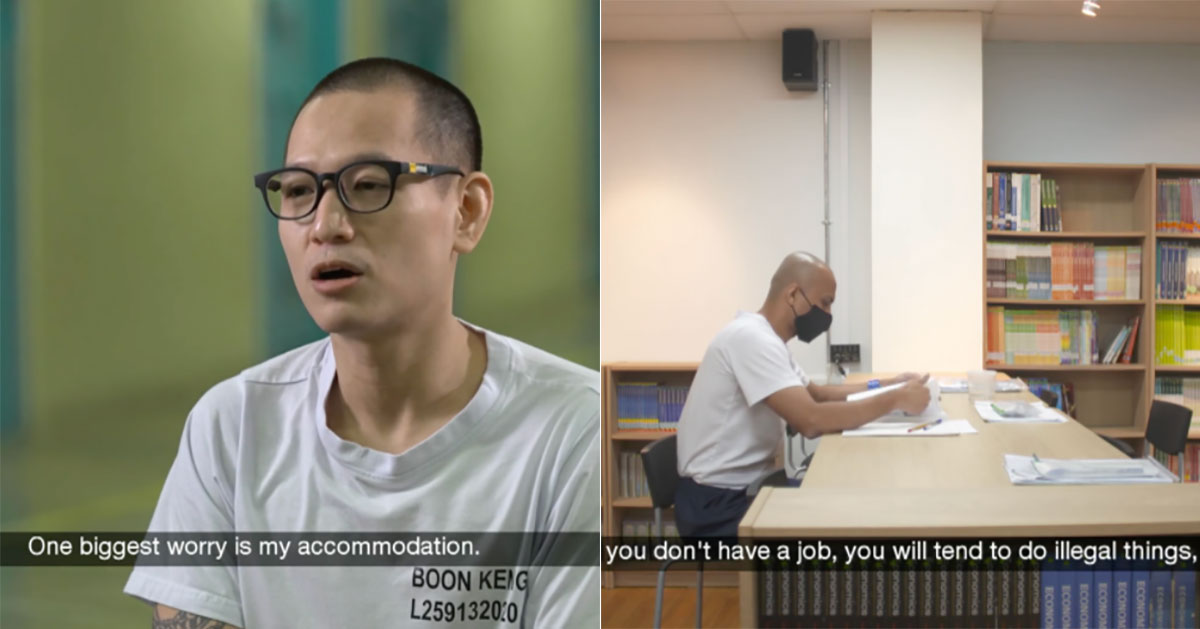Follow us on Telegram for the latest updates: https://t.me/mothershipsg
The third episode of "Inside Maximum Security" was released on Jan. 31.
Quick recap
The four-part CNA docuseries has been providing Singaporeans with never-before-seen footage of life behind Changi Prison Complex, one of Singapore's most tightly-guarded and fortified compounds.
It follows the lives of five inmates, put behind bars for a bevy of offences, all of whom are serving their time at B1 institution, Changi Prison's maximum security institution.
The inmates
To get you up to speed, here's the cast of inmates featured:
Boon Keng, 34
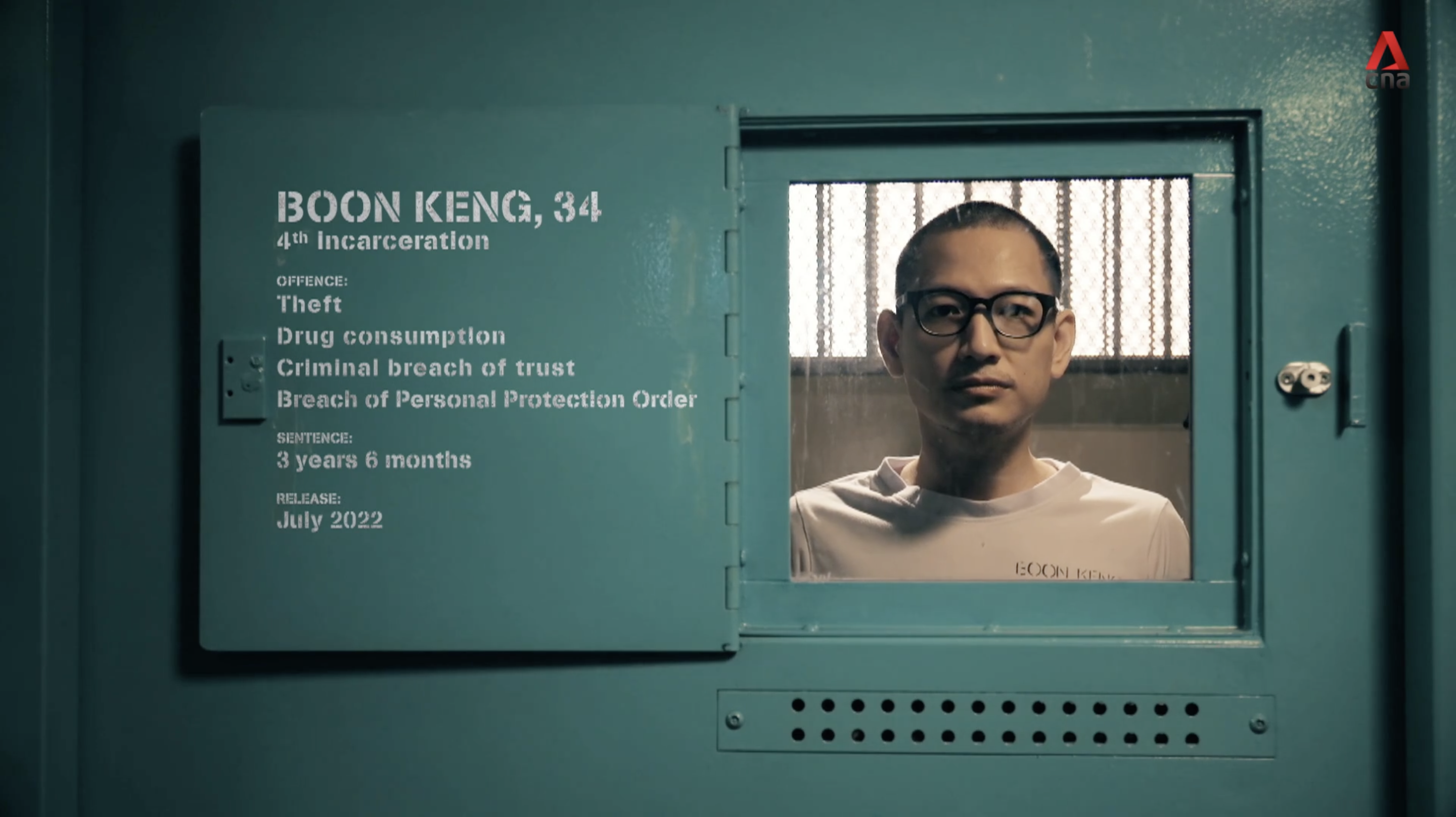 Image screenshot from CNA video.
Image screenshot from CNA video.
Khai, 31
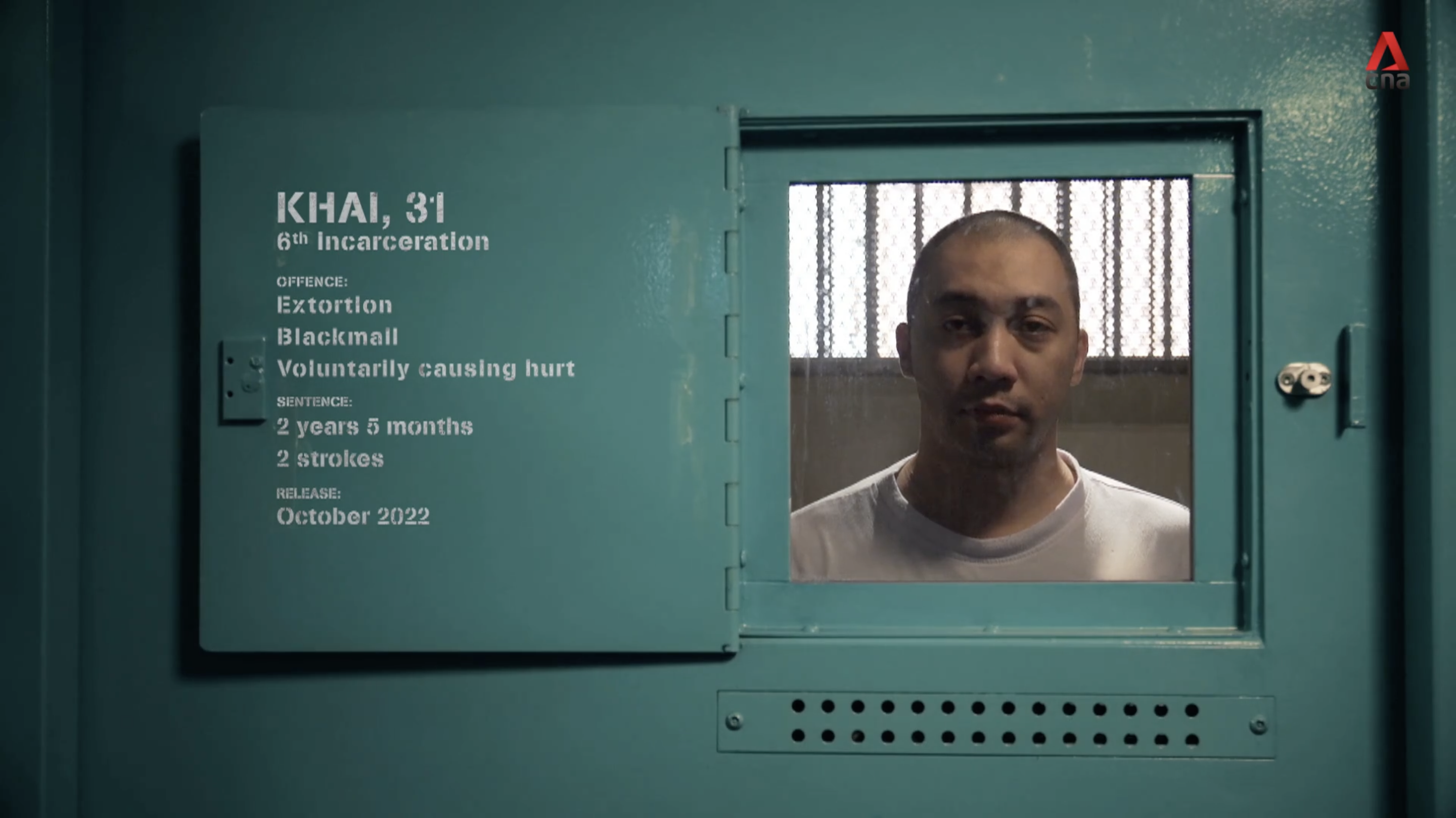 Image screenshot from CNA video.
Image screenshot from CNA video.
Graceson, 36
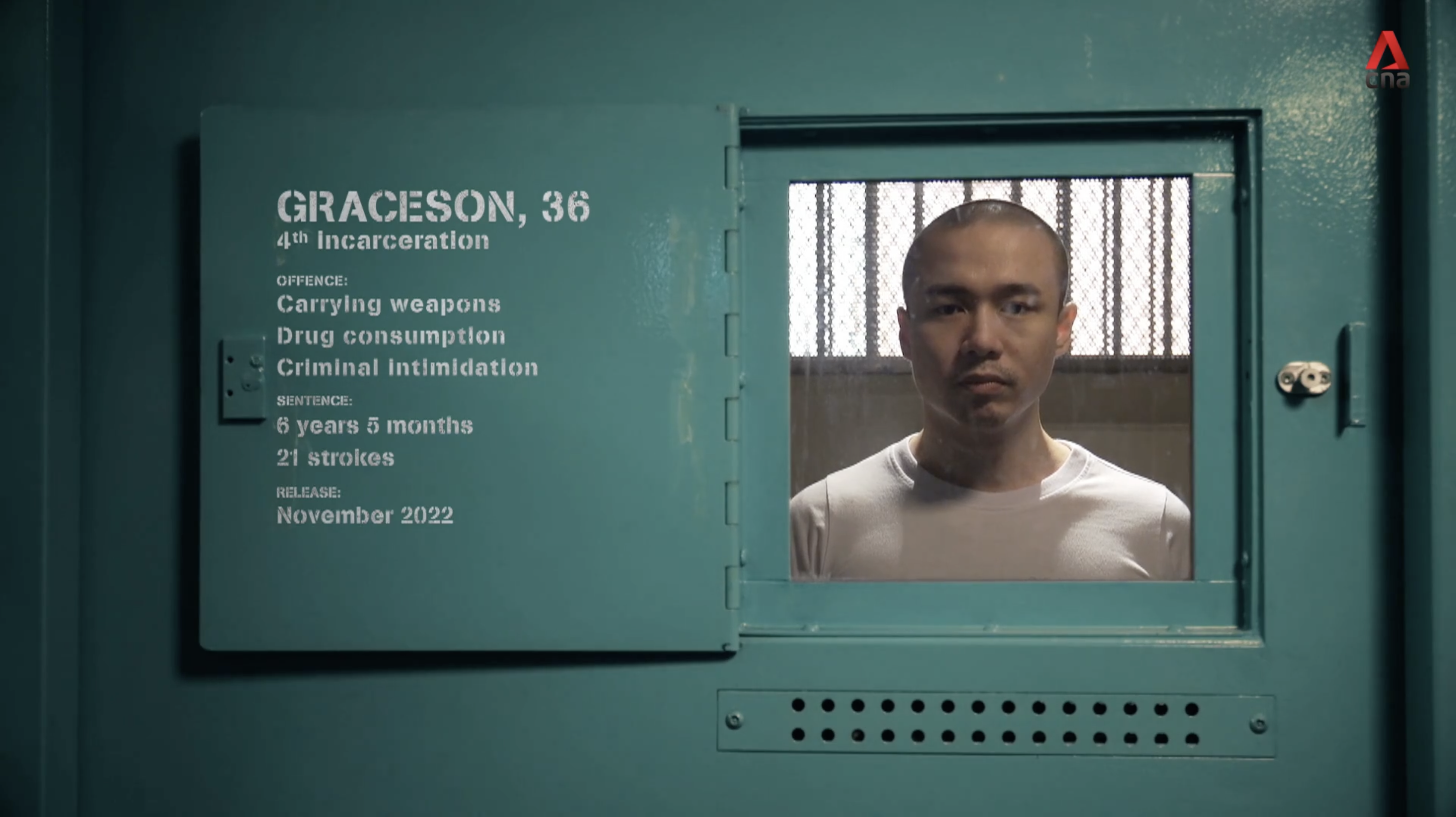 Image screenshot from CNA video.
Image screenshot from CNA video.
Rusdi, 33
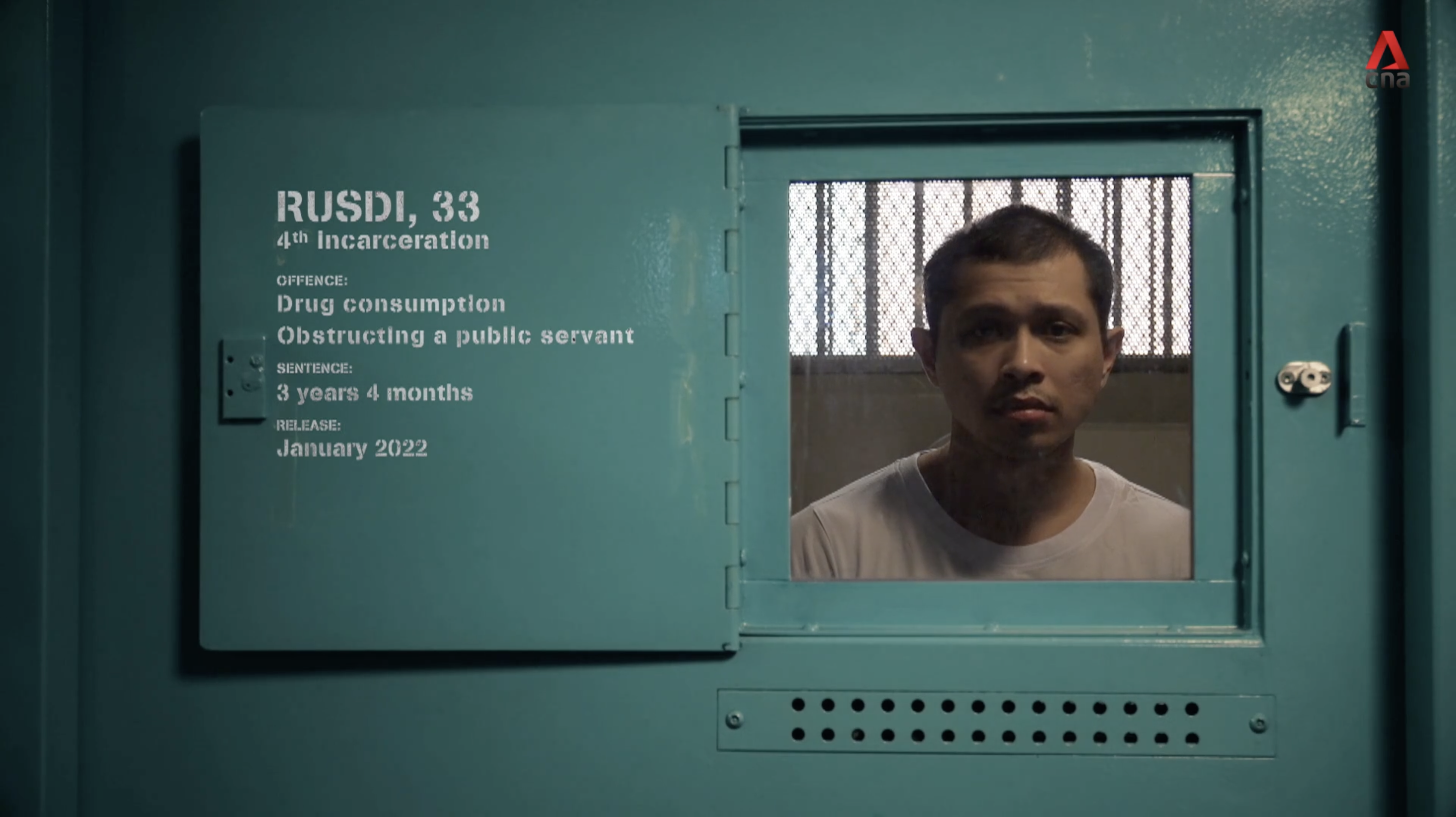 Image screenshot from CNA video.
Image screenshot from CNA video.
Iskandar, 41
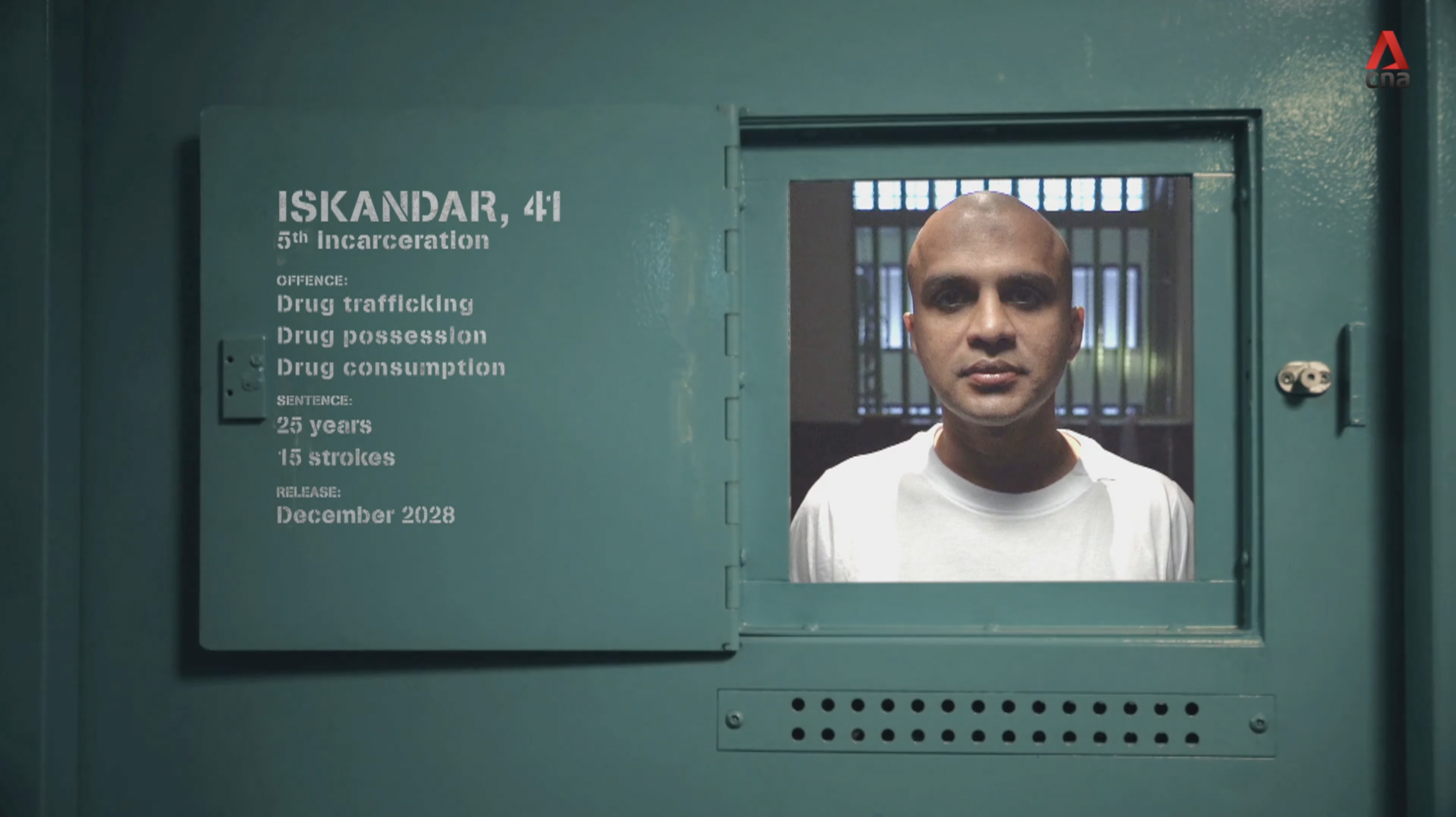 Image screenshot from CNA video.
Image screenshot from CNA video.
Unlike the previous four inmates, 41-year-old Iskandar was only introduced in the second episode of the docuseries.
But just like the other inmates, Iskandar is a repeat offender and was put back in jail for the fifth time.
The other four inmates have all been incarcerated at least four times each for an assortment of offences.
Topic of recidivism, or reoffending, discussed
CNA revealed that recidivism is not unique to the the featured inmates.
At least one in five inmates are back in jail in Singapore within two years after their release.
After skirting the topic in the earlier two episodes, the third episode dove into the reasons behind recidivism -- the tendency for criminals to reoffend -- along with the prison's corrective rehabilitation efforts.
Money problems
It appears that inmates are plagued by money problems, more specifically, the lack thereof.
This even happens behind bars, where it has no place or value.
Without it, money really is the root of all evil, especially according to the inmates who voiced their concerns.
One inmate, Boon Keng, was unsmiling and bore the despondent expression of a troubled man, while stressing that he was "very, very stressed" to his personal supervisor, prison officer Muhuthan.
This was very much unlike his typically jovial and humorous self as seen in the previous two episodes, where he was frequently seen with a smile on his face.
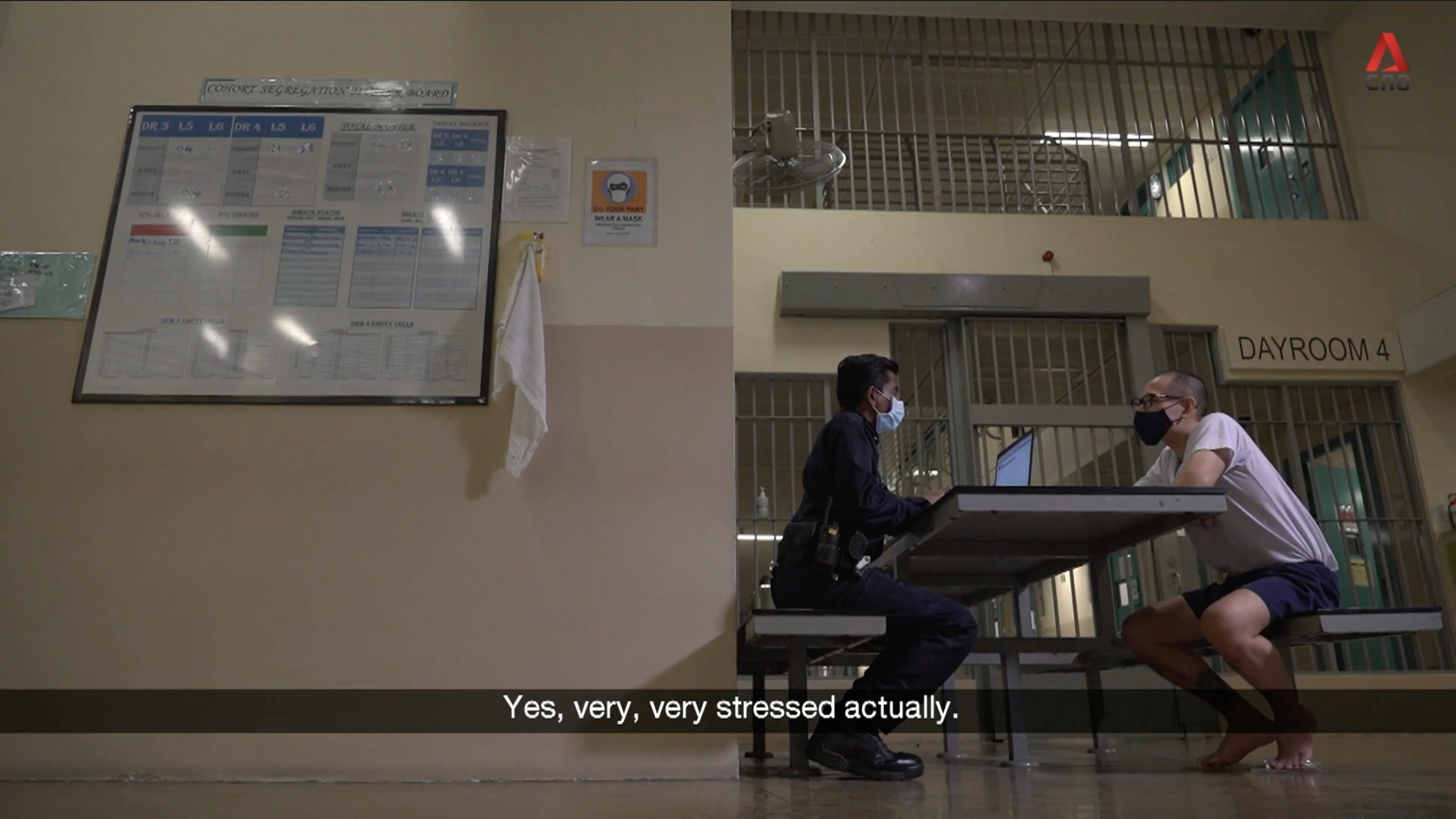 Image screenshot from CNA video.
Image screenshot from CNA video.
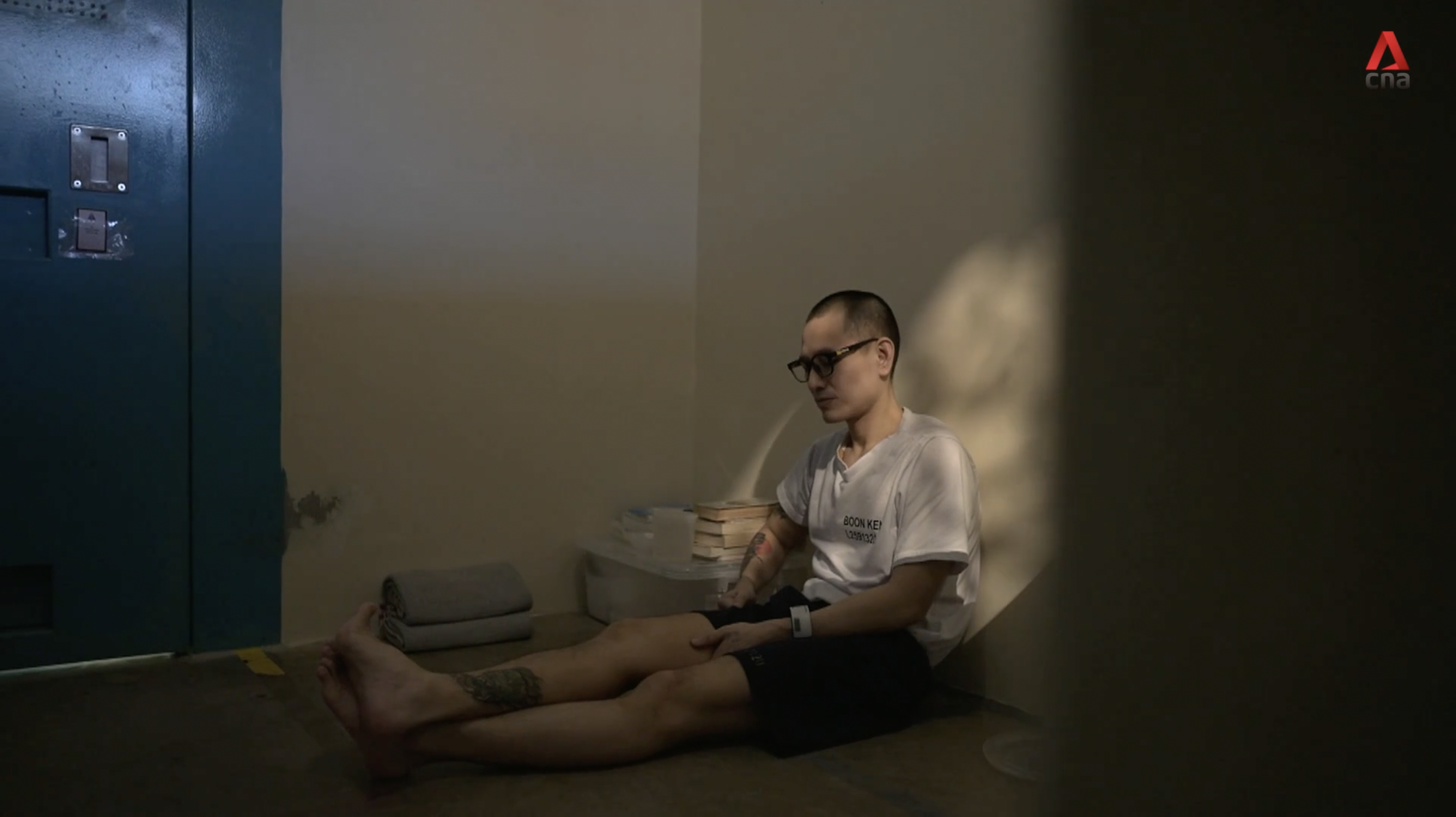 Image screenshot from CNA video.
Image screenshot from CNA video.
Worry about future accommodation
This complete 180-degree about turn in his disposition was because of the uncertainty of his future accommodation and housing arrangements.
Boon Keng said he was not close to his siblings.
His mother was his last and only familial tie.
Unfortunately, she passed away while he was imprisoned.
This meant that he could not return to his maternal home after completing his sentence.
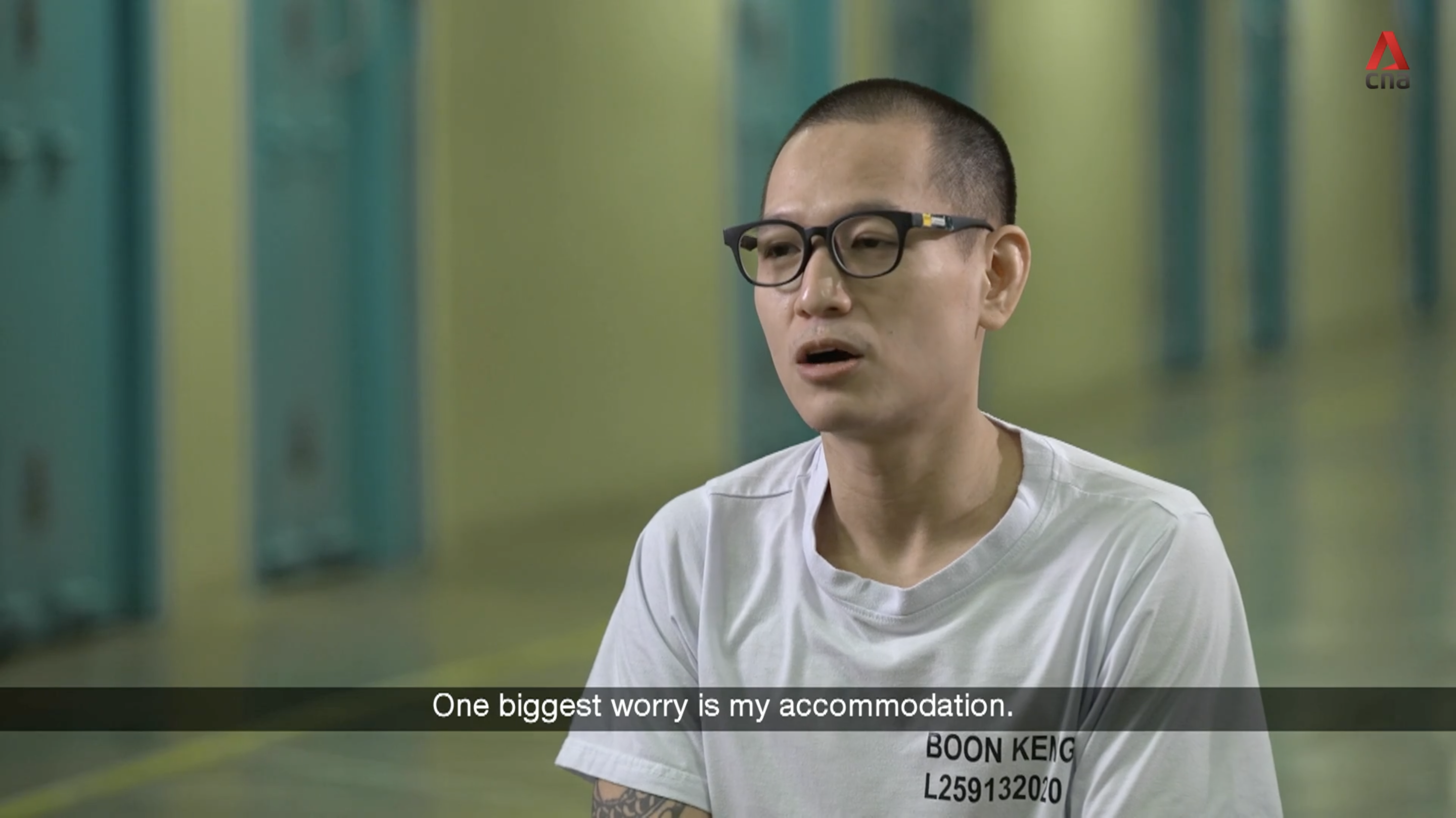 Image screenshot from CNA video.
Image screenshot from CNA video.
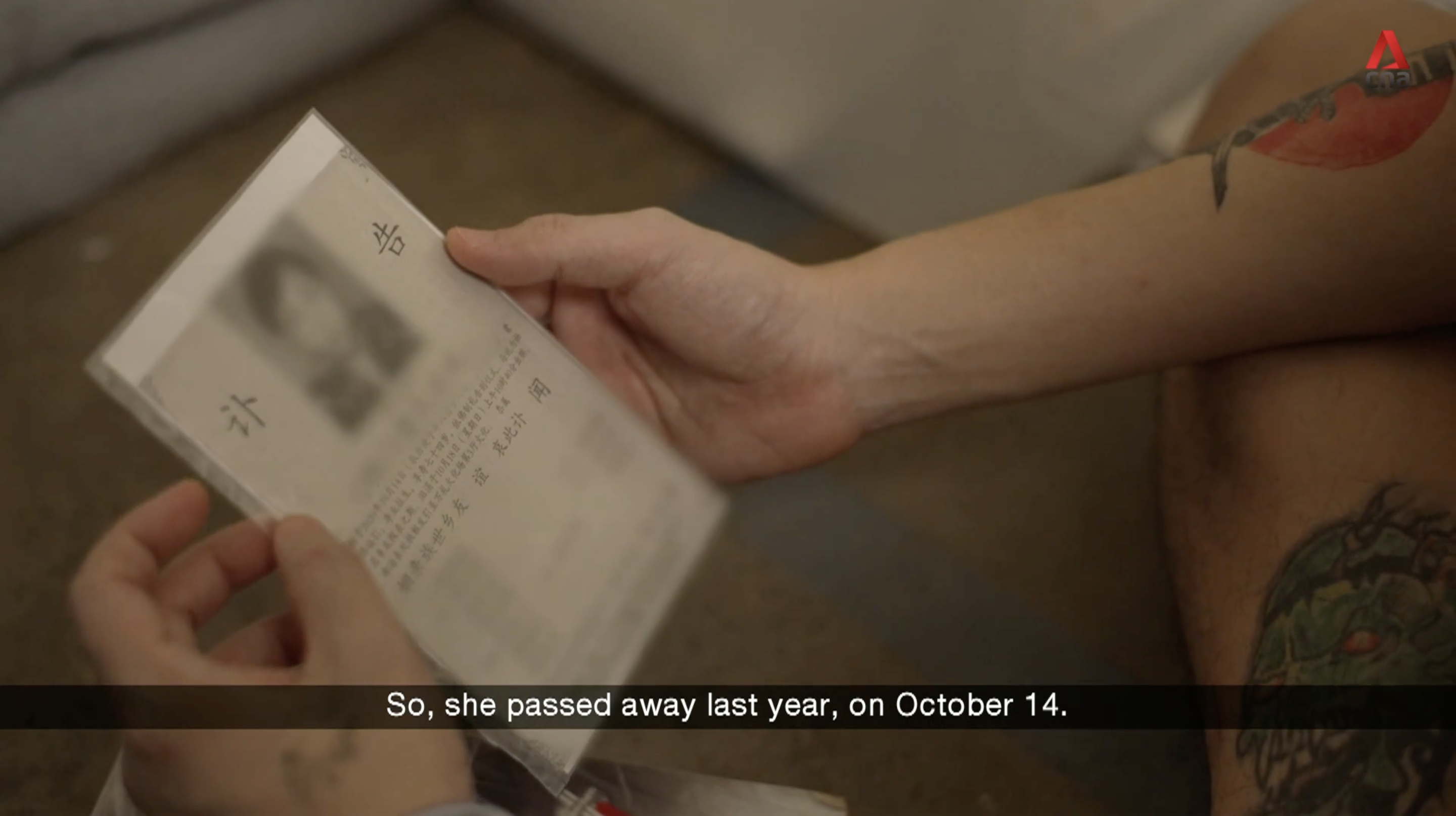 Image screenshot from CNA video.
Image screenshot from CNA video.
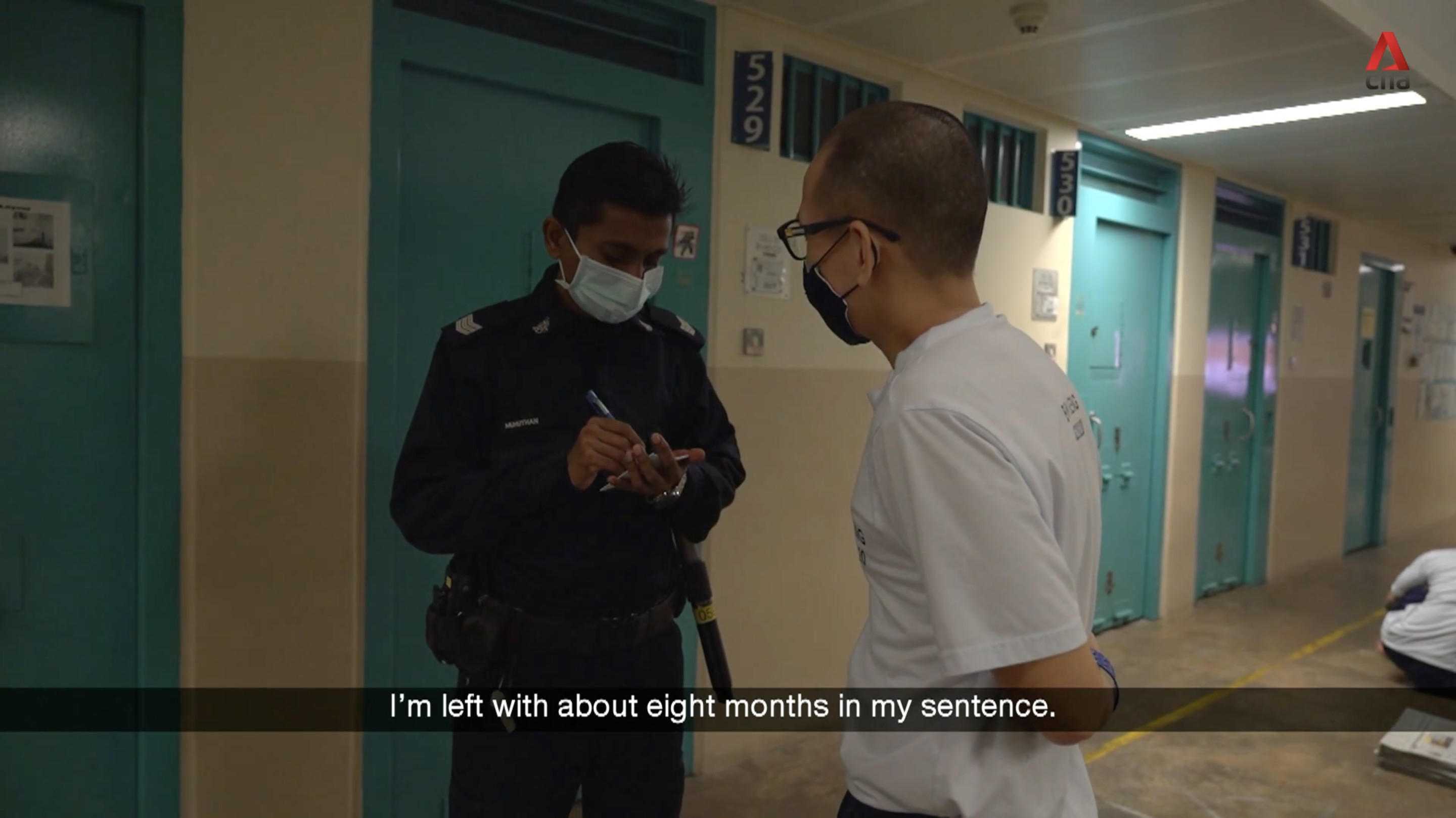 Image screenshot from CNA video.
Image screenshot from CNA video.
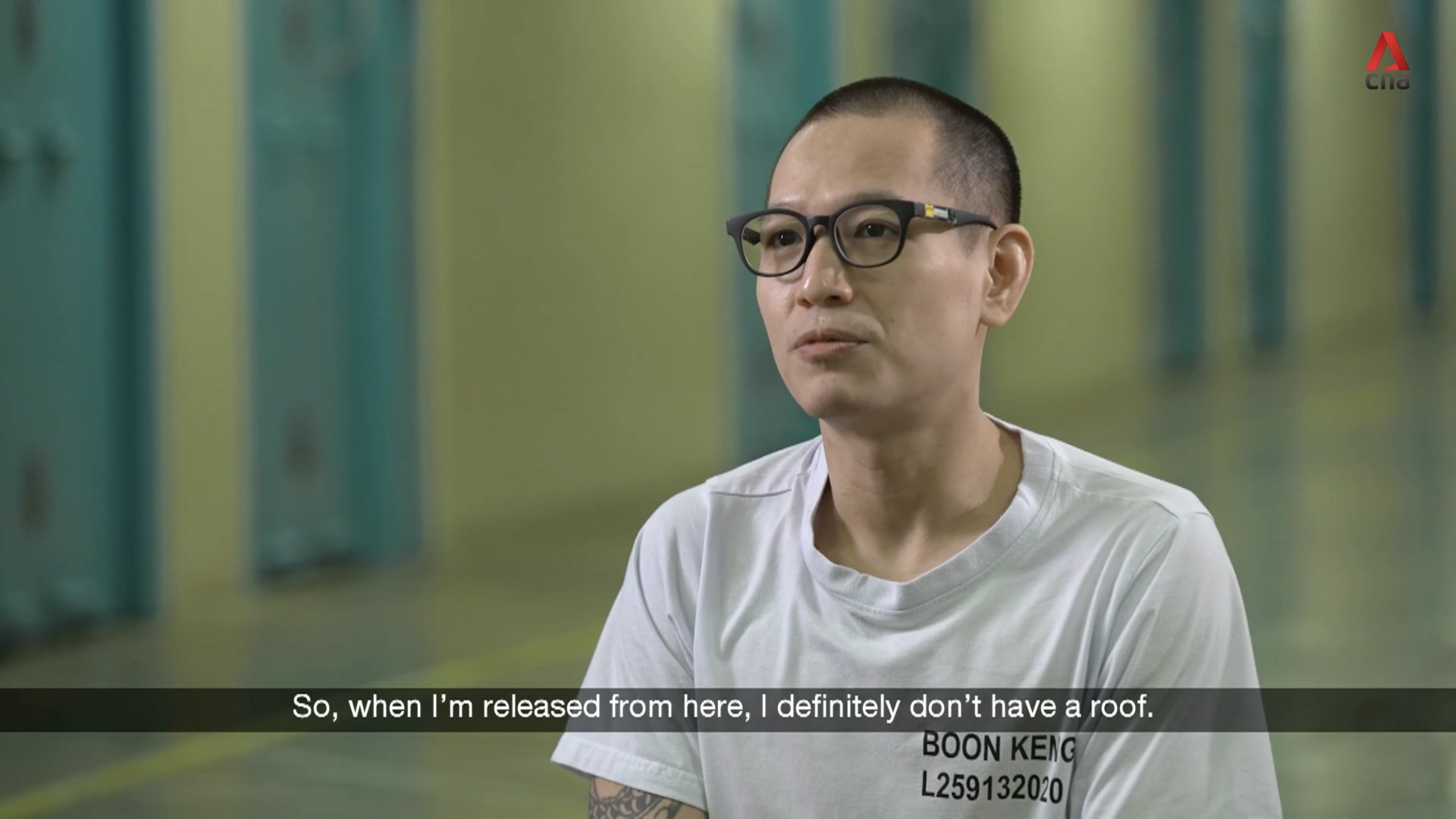 Image screenshot from CNA video.
Image screenshot from CNA video.
Need to find housing with fiancée
With nowhere to go, Boon Keng very much feared that he and his fiancée could be homeless, and it's the start of a slippery slope downwards that could lead to a familiar chain of events.
Without a home that can give him adequate rest, he would be unable to perform at work, which jeopardises his earnings, drives him towards the lucrative world of vice, and ultimately behind bars once again.
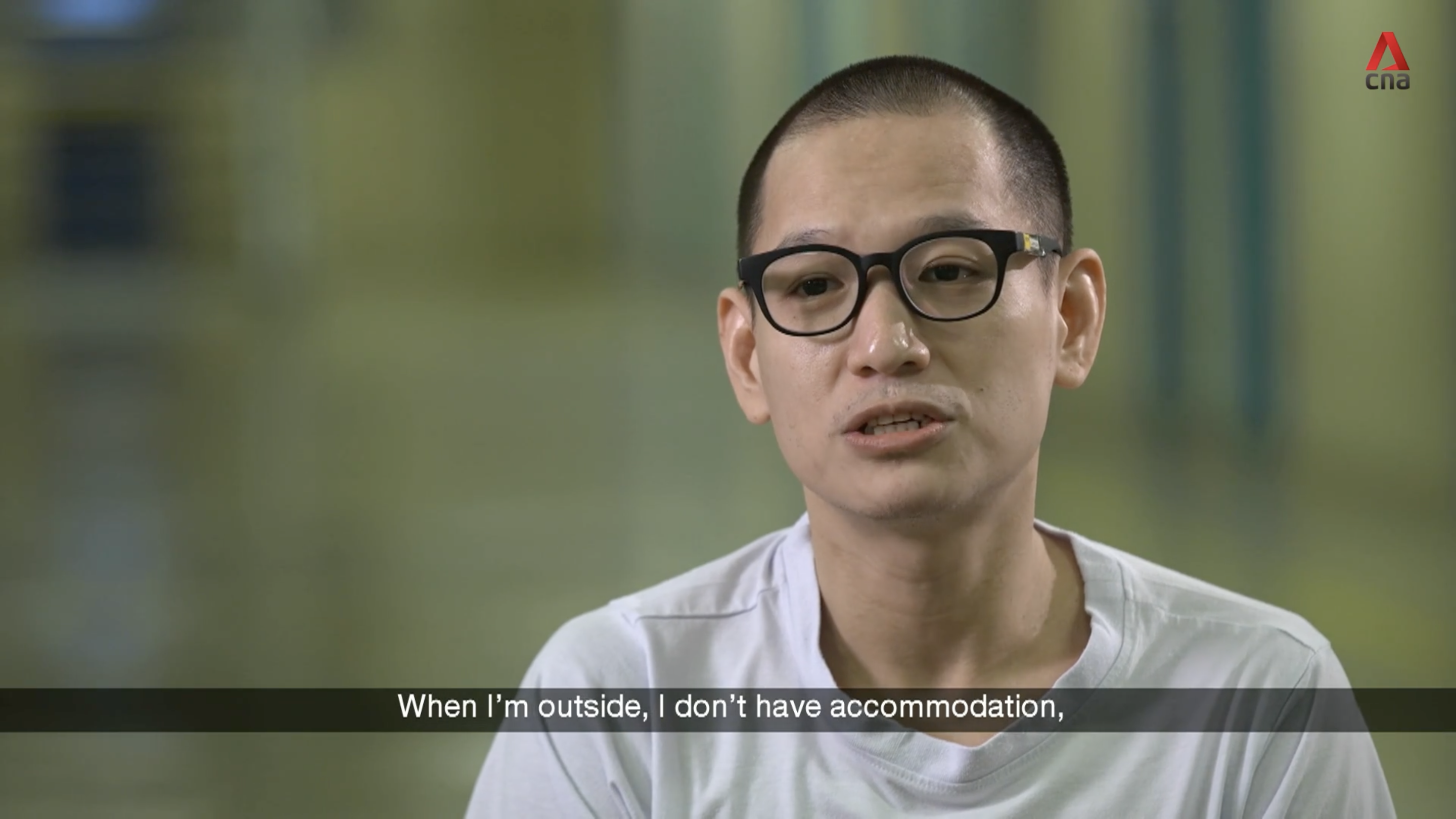 Image screenshot from CNA video.
Image screenshot from CNA video.
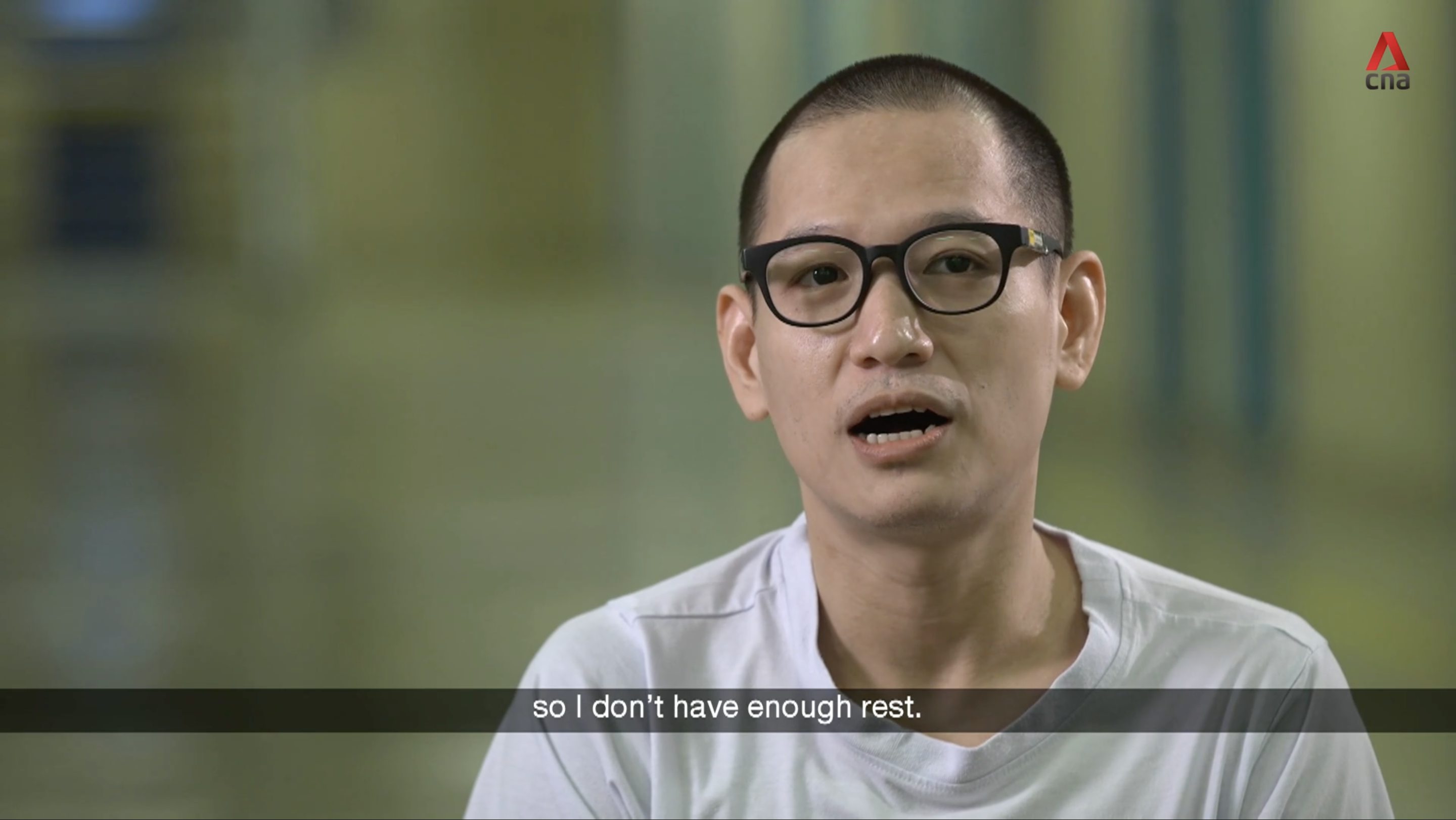 Image screenshot from CNA video.
Image screenshot from CNA video.
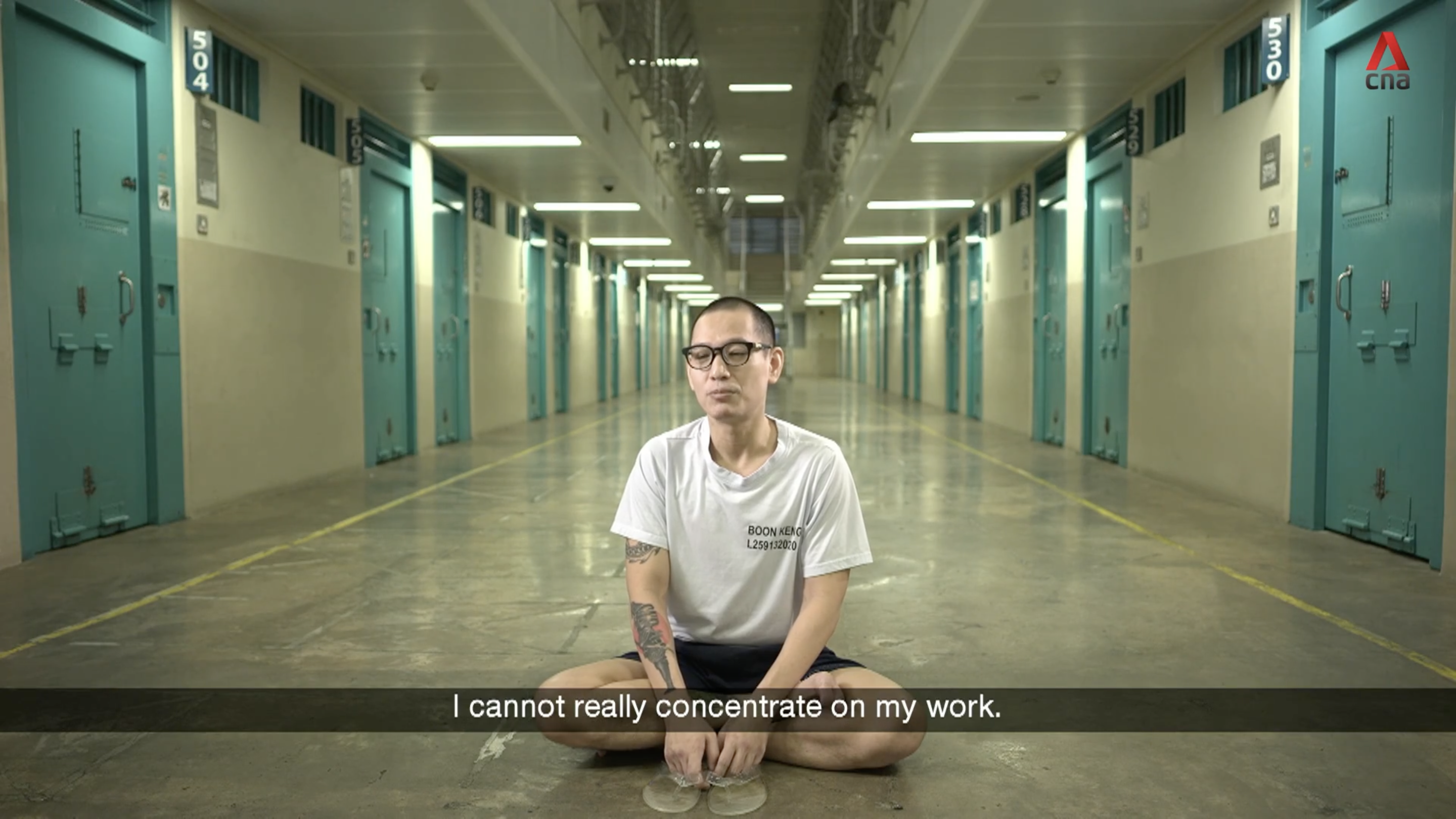 Image screenshot from CNA video.
Image screenshot from CNA video.
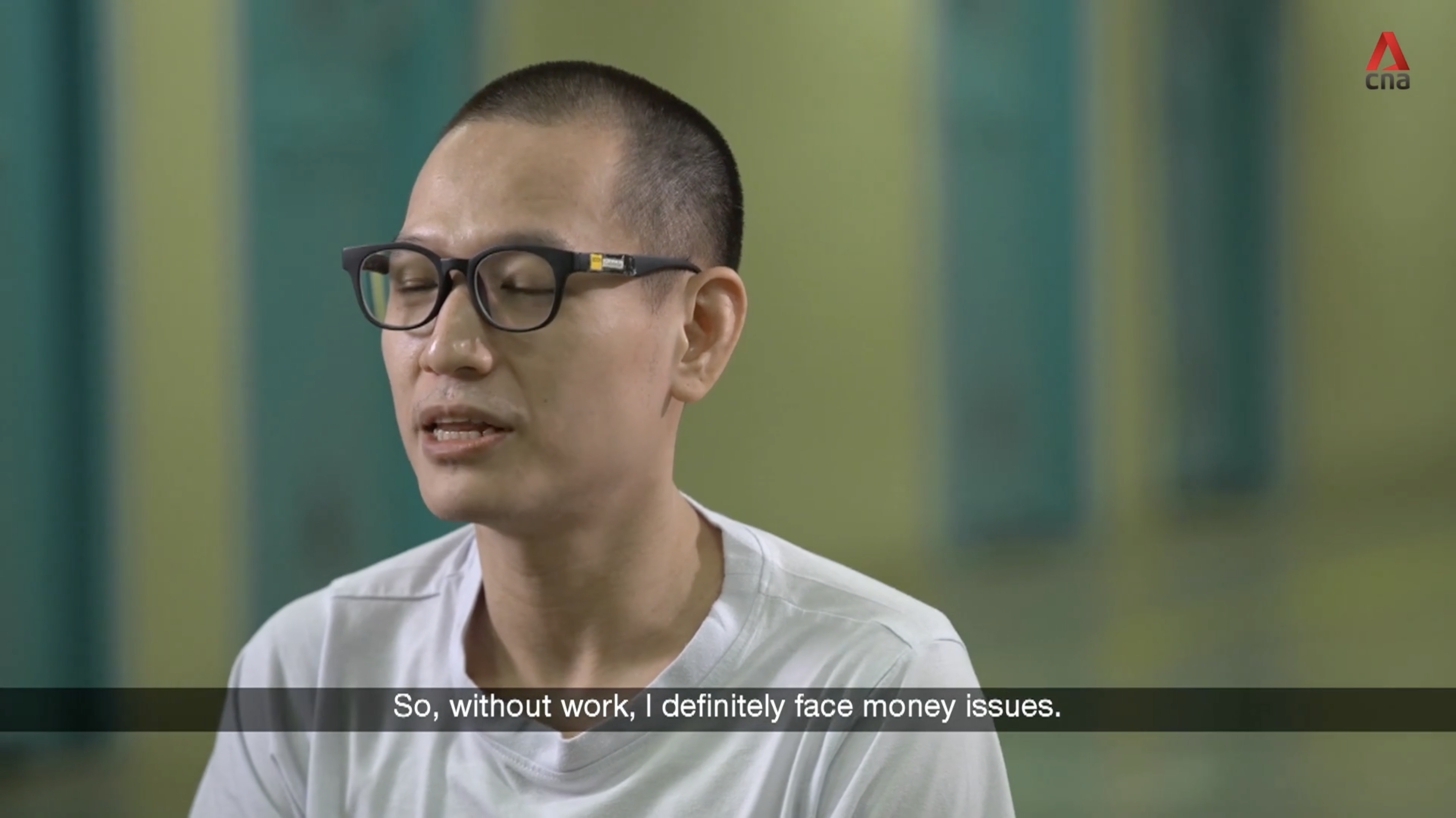 Image screenshot from CNA video.
Image screenshot from CNA video.
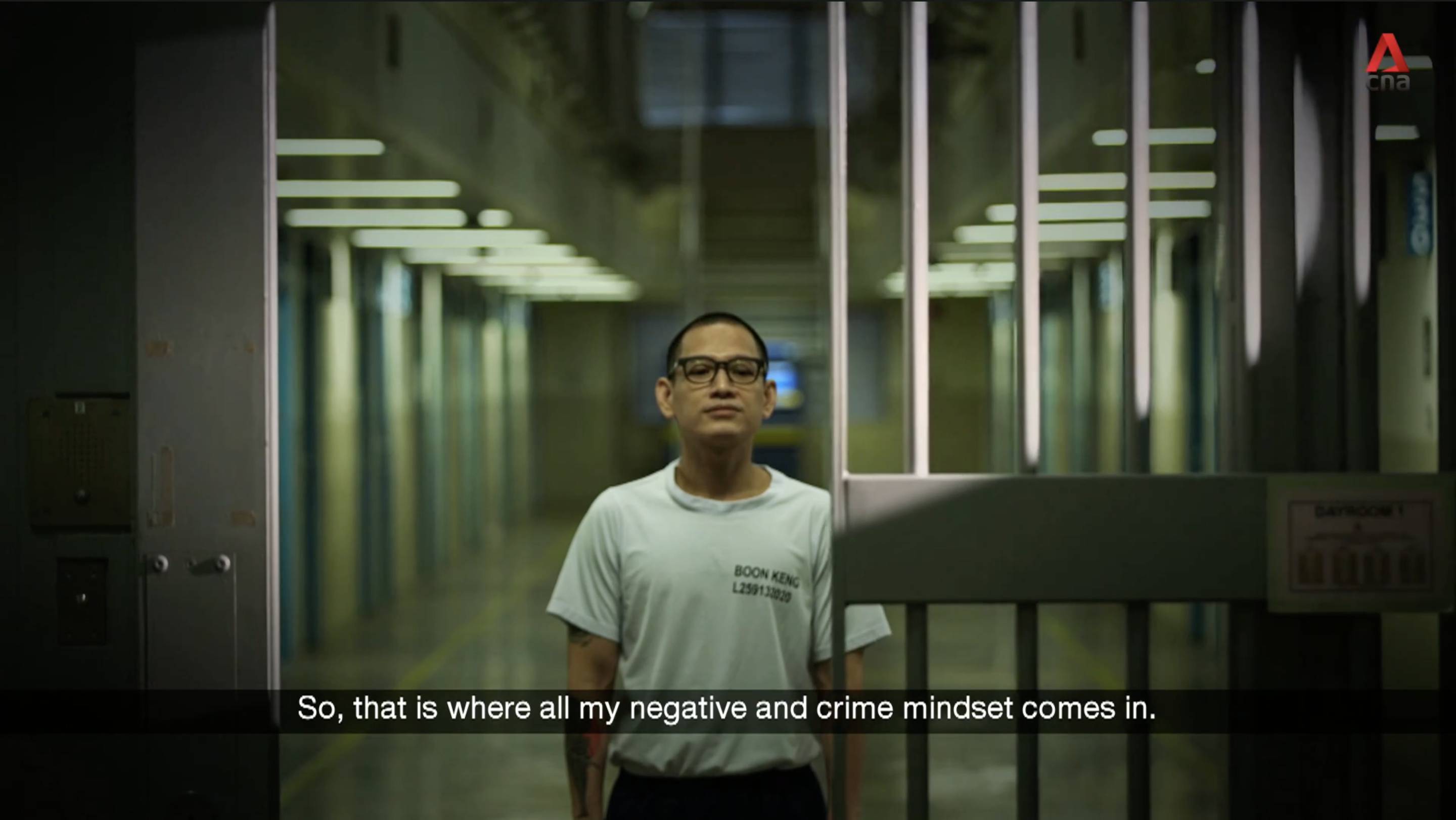 Image screenshot from CNA video.
Image screenshot from CNA video.
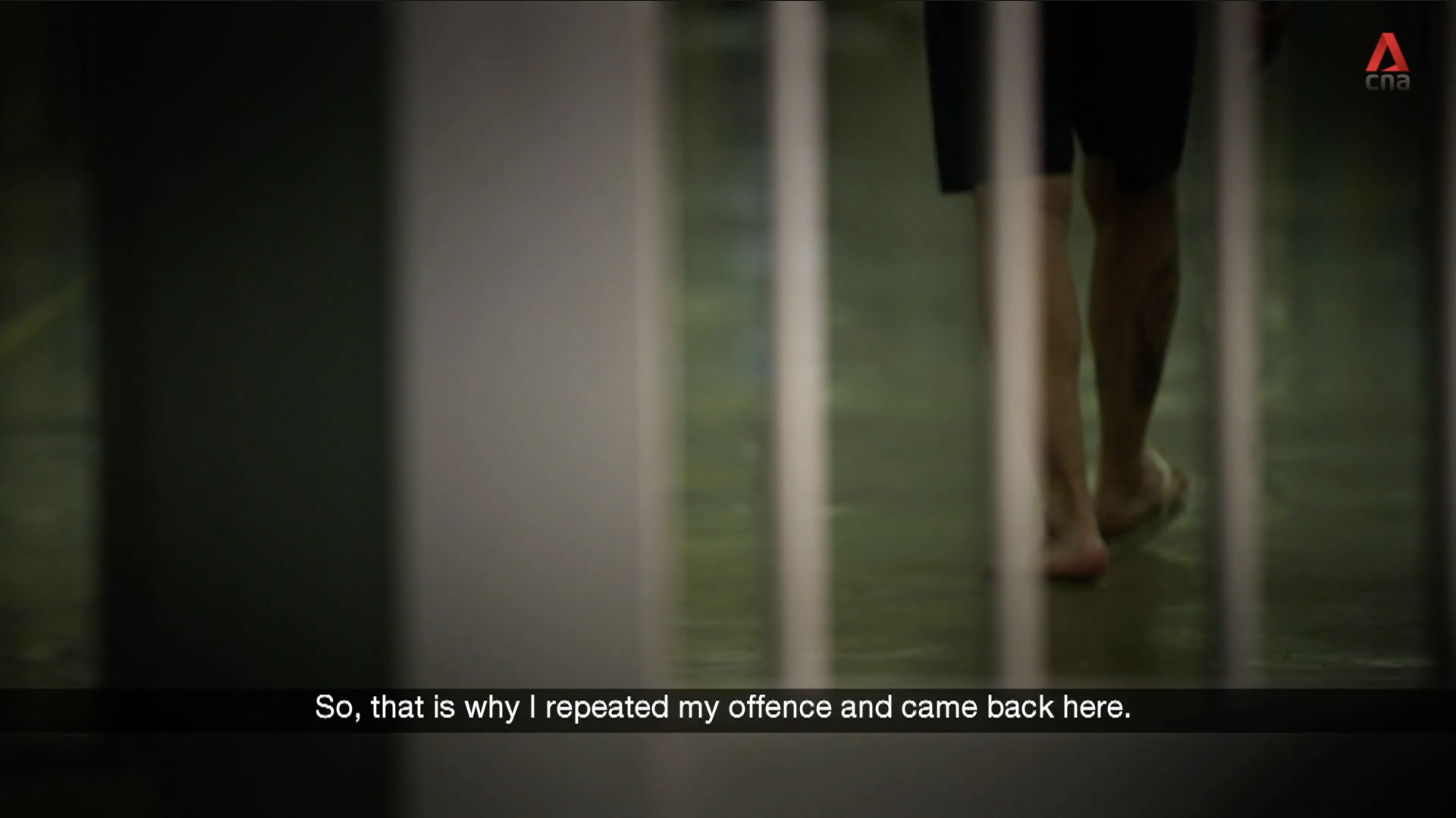 Image screenshot from CNA video.
Image screenshot from CNA video.
Help provided in prison to secure housing
Inmates who are looking to secure rental accommodations upon their release can seek assistance from their personal supervisors, like how Boon Keng did with Muhuthan, who will then put up a request with the Family Resource Centres.
During this process, there will be a referral for accommodation.
This is followed by an interview, which is subject to approval and depends on the inmates' eligibility.
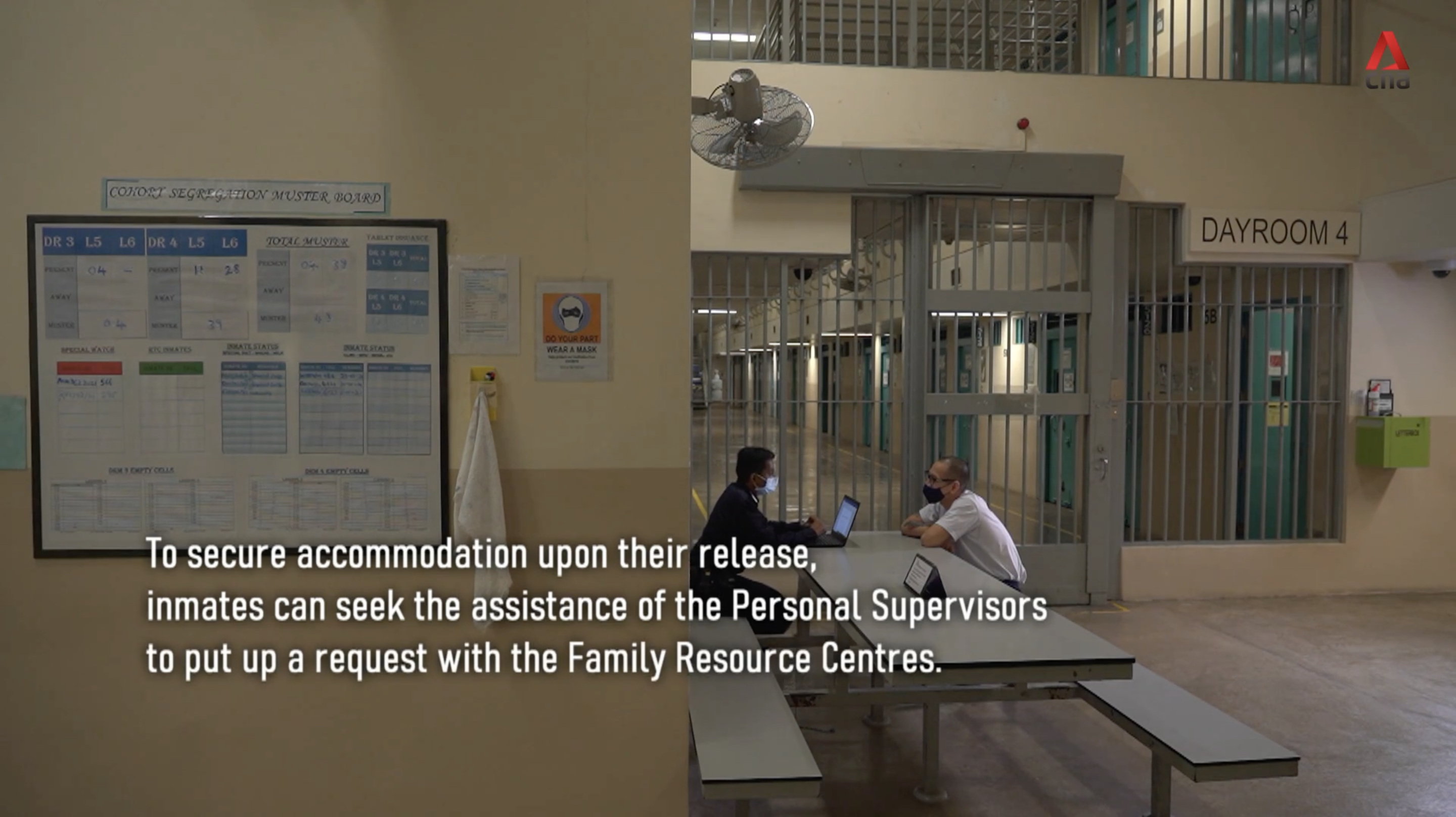 Image screenshot from CNA video.
Image screenshot from CNA video.
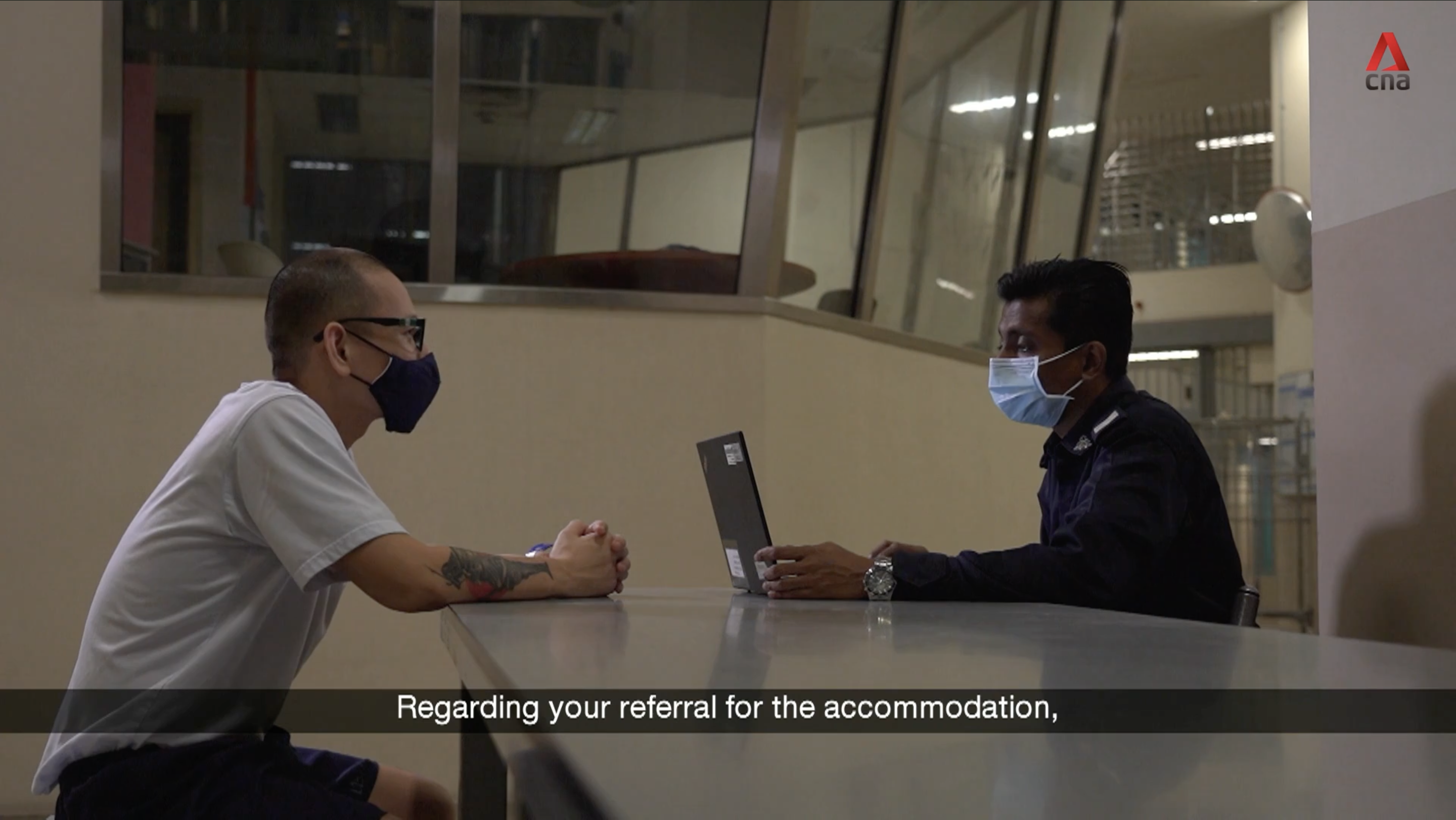 Image screenshot from CNA video.
Image screenshot from CNA video.
 Image screenshot from CNA video.
Image screenshot from CNA video.
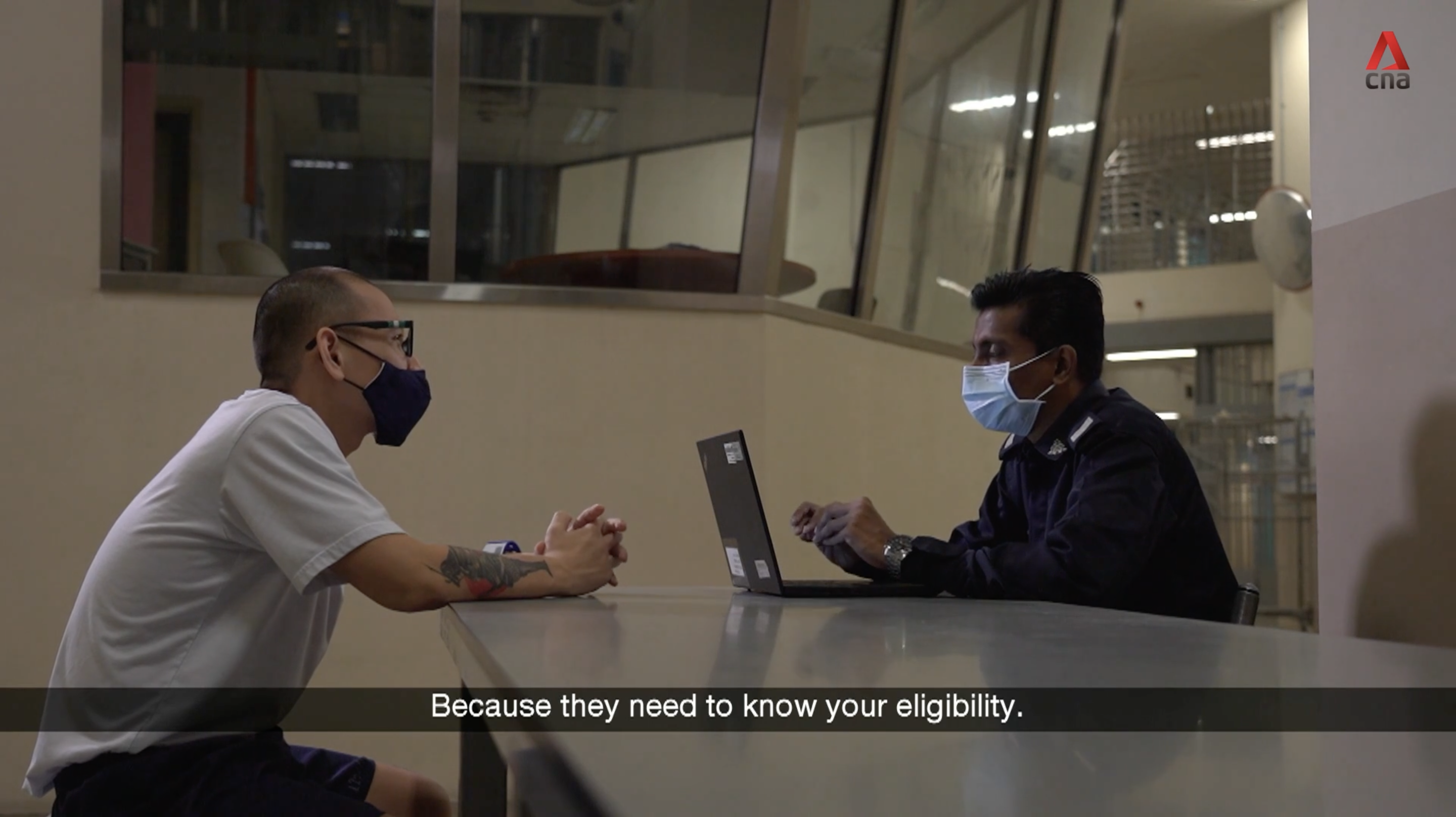 Image screenshot from CNA video.
Image screenshot from CNA video.
While the personal supervisor had assured an extremely anxious Boon Keng that he would not be homeless following his release, there is the likelihood that inmates like him would not be able to successfully secure housing.
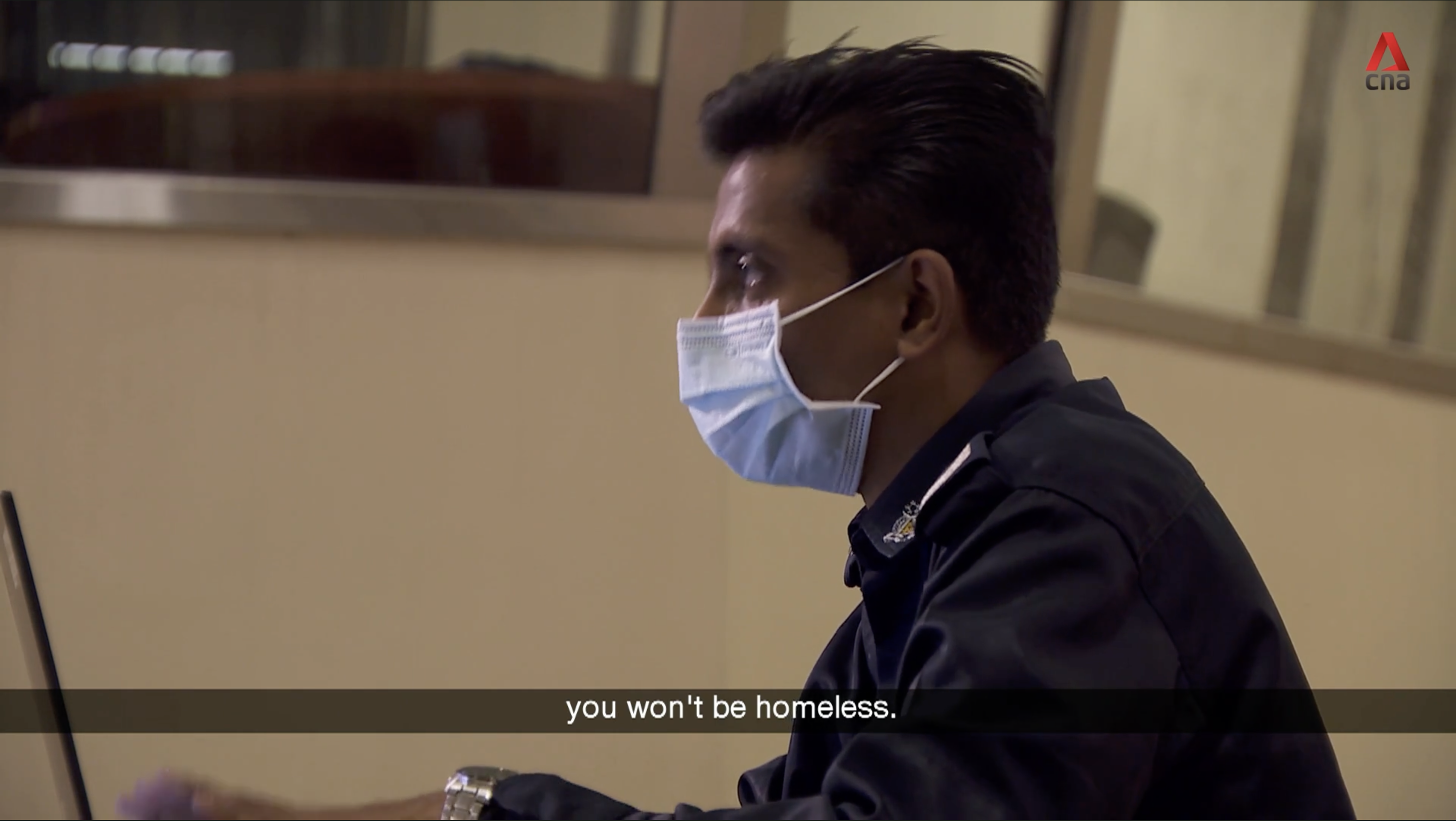 Image screenshot from CNA video.
Image screenshot from CNA video.
Problems finding work
However, this is just one of the challenges for inmates who come out of prison.
The other challenge is finding work.
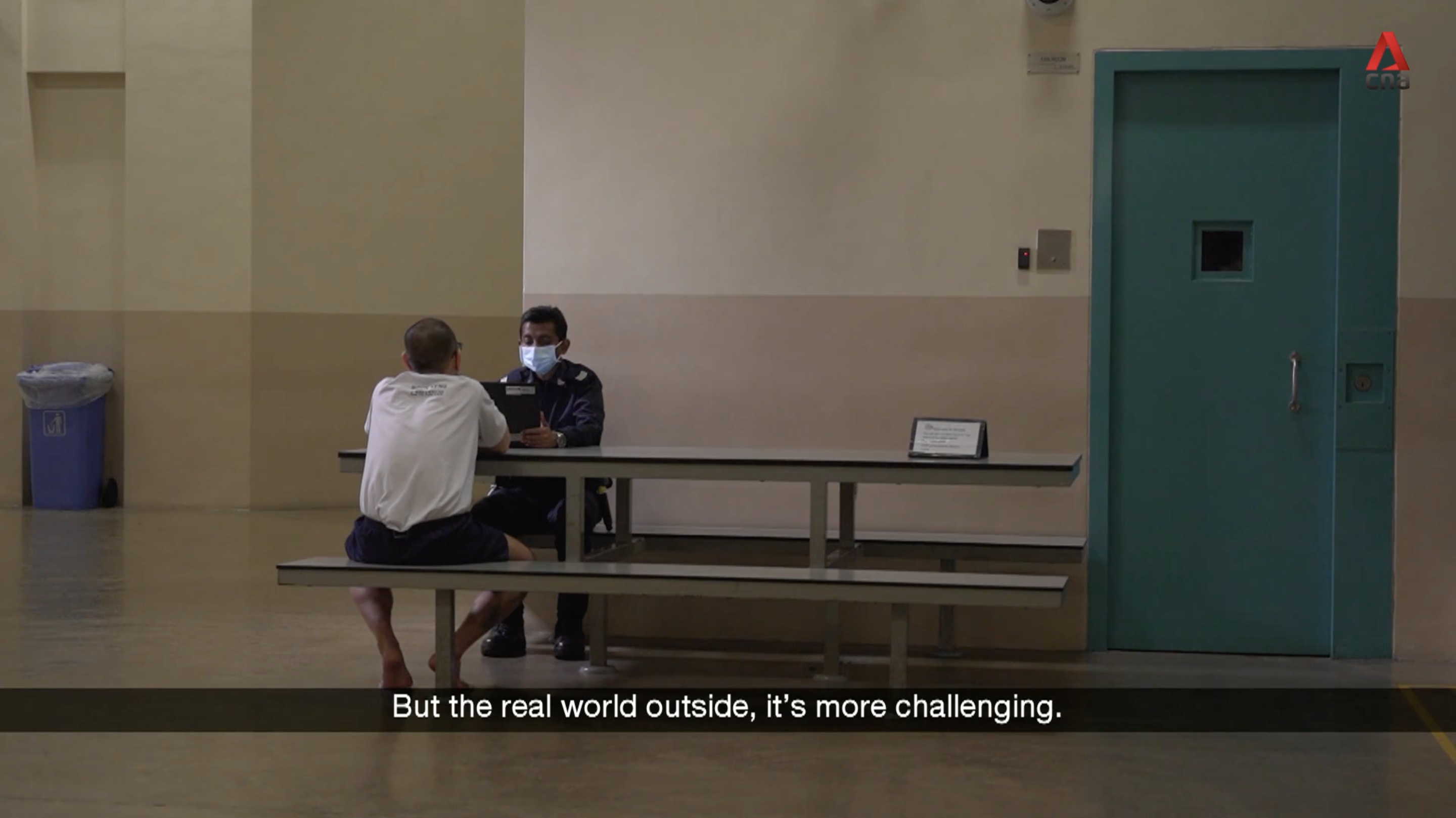 Image screenshot from CNA video.
Image screenshot from CNA video.
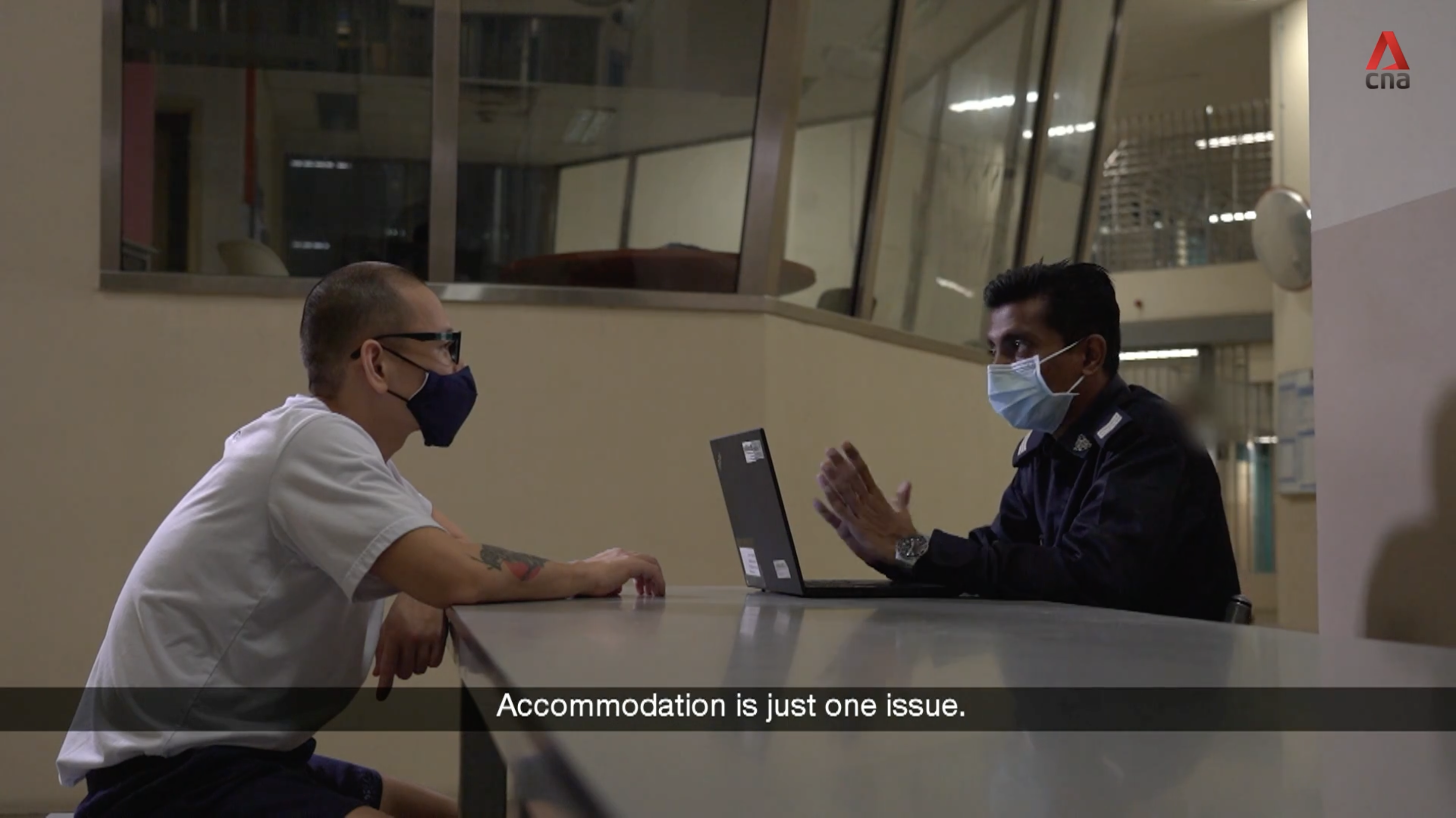 Image screenshot from CNA video.
Image screenshot from CNA video.
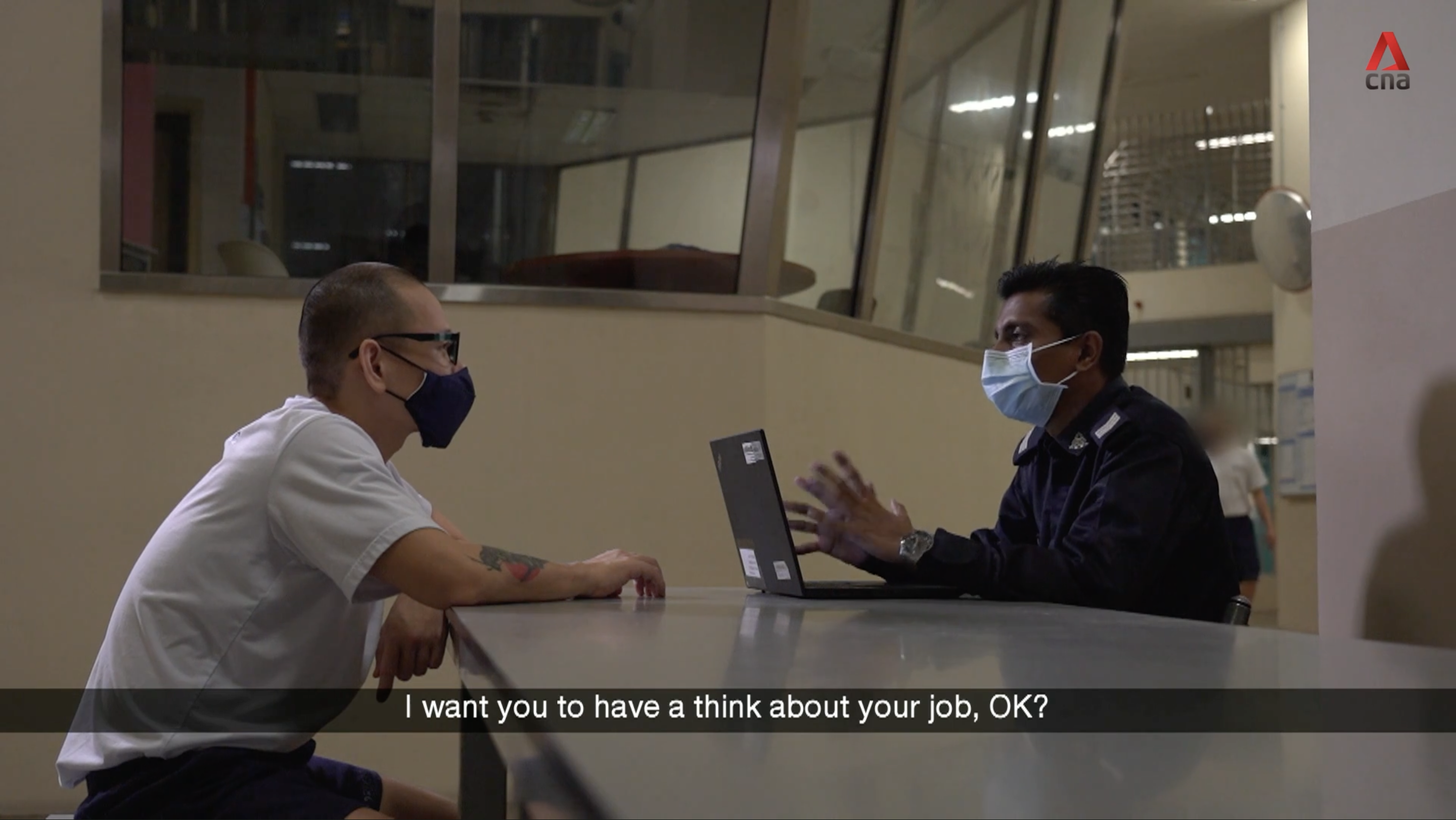 Image screenshot from CNA video.
Image screenshot from CNA video.
And there is apparently a lack of job options for ex-offenders, according to Rusdi.
Limited options for jobs
He was offered the limited choice of being a driver, or a delivery personnel, more than once.
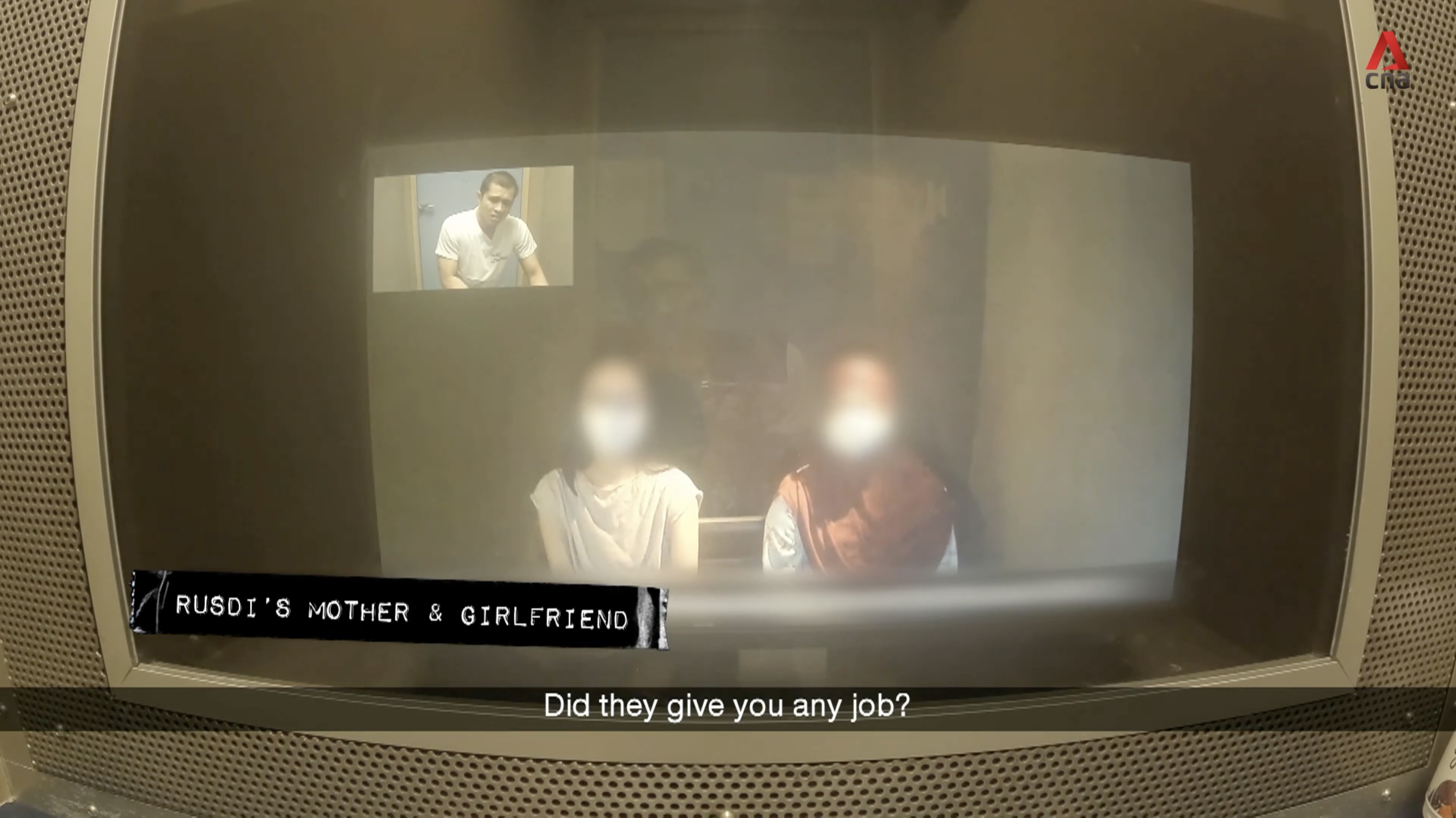 Image screenshot from CNA video.
Image screenshot from CNA video.
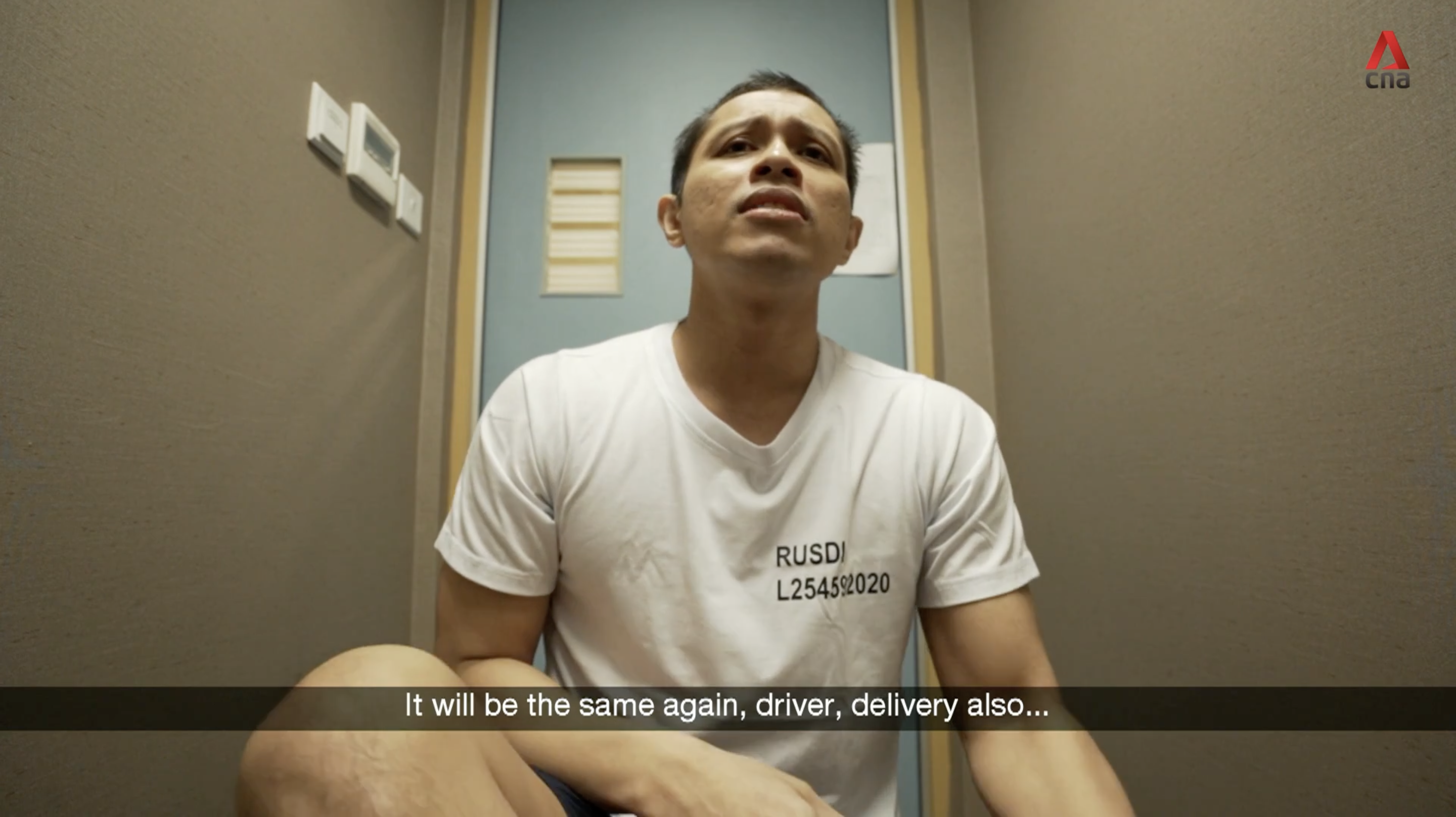 Image screenshot from CNA video.
Image screenshot from CNA video.
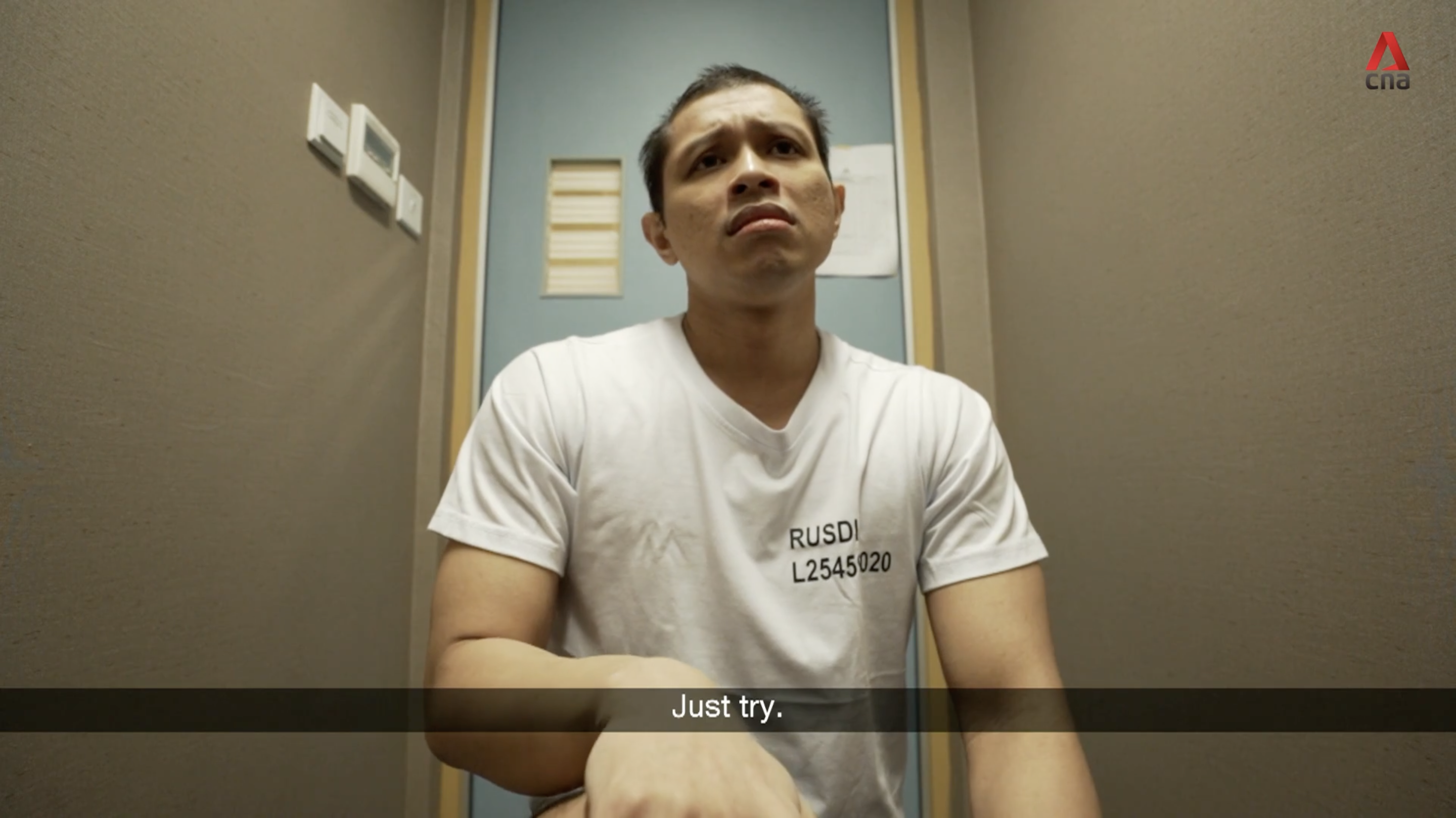 Image screenshot from CNA video.
Image screenshot from CNA video.
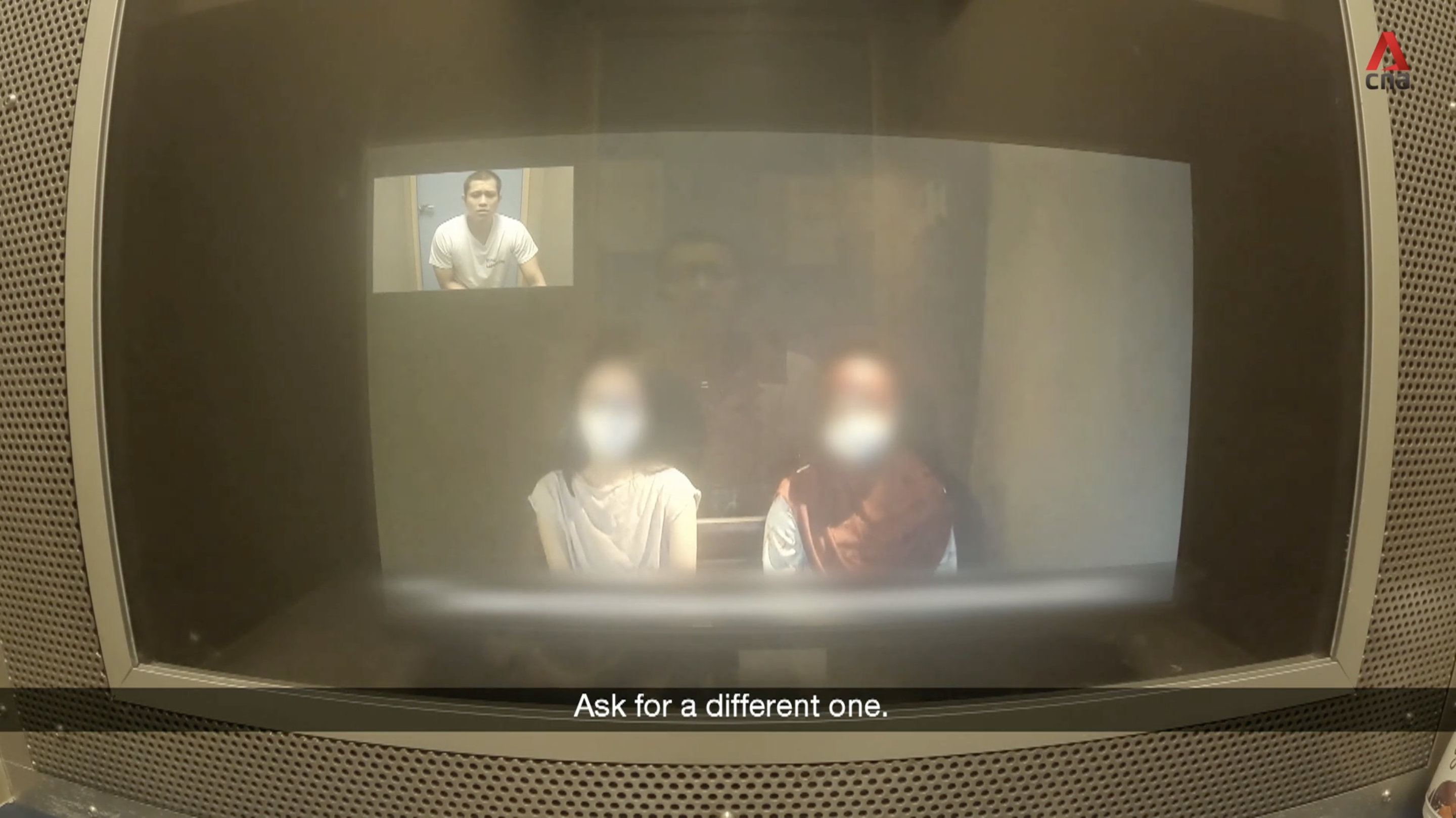 Image screenshot from CNA video.
Image screenshot from CNA video.
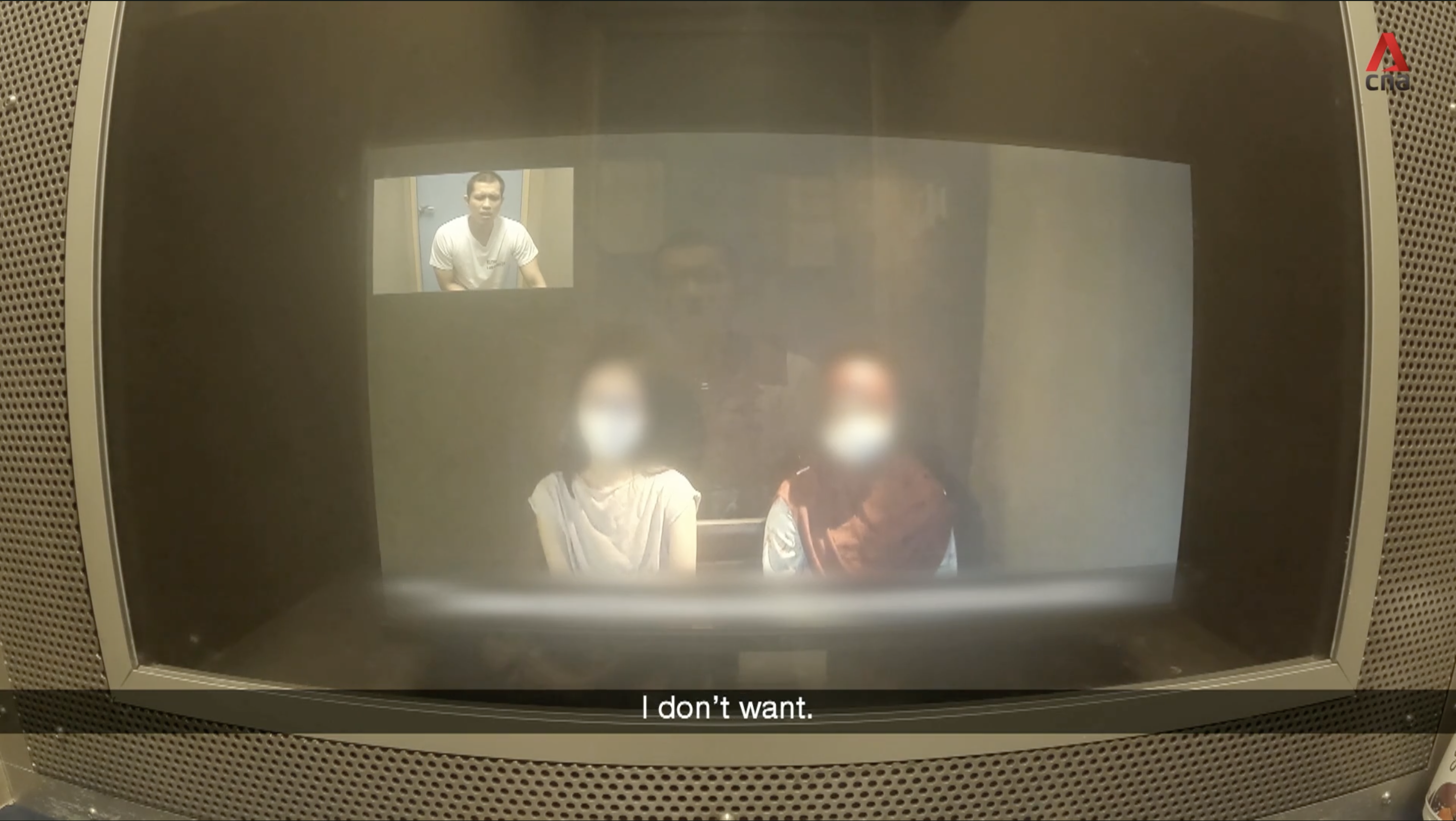 Image screenshot from CNA video.
Image screenshot from CNA video.
Turned down job offers from prison
During a tele-visit with his mother and "girlfriend" and/ or "very close friend" (it's complicated), the soon-to-be released Rusdi told his mother adamantly that he did not want the job that the prison offered him.
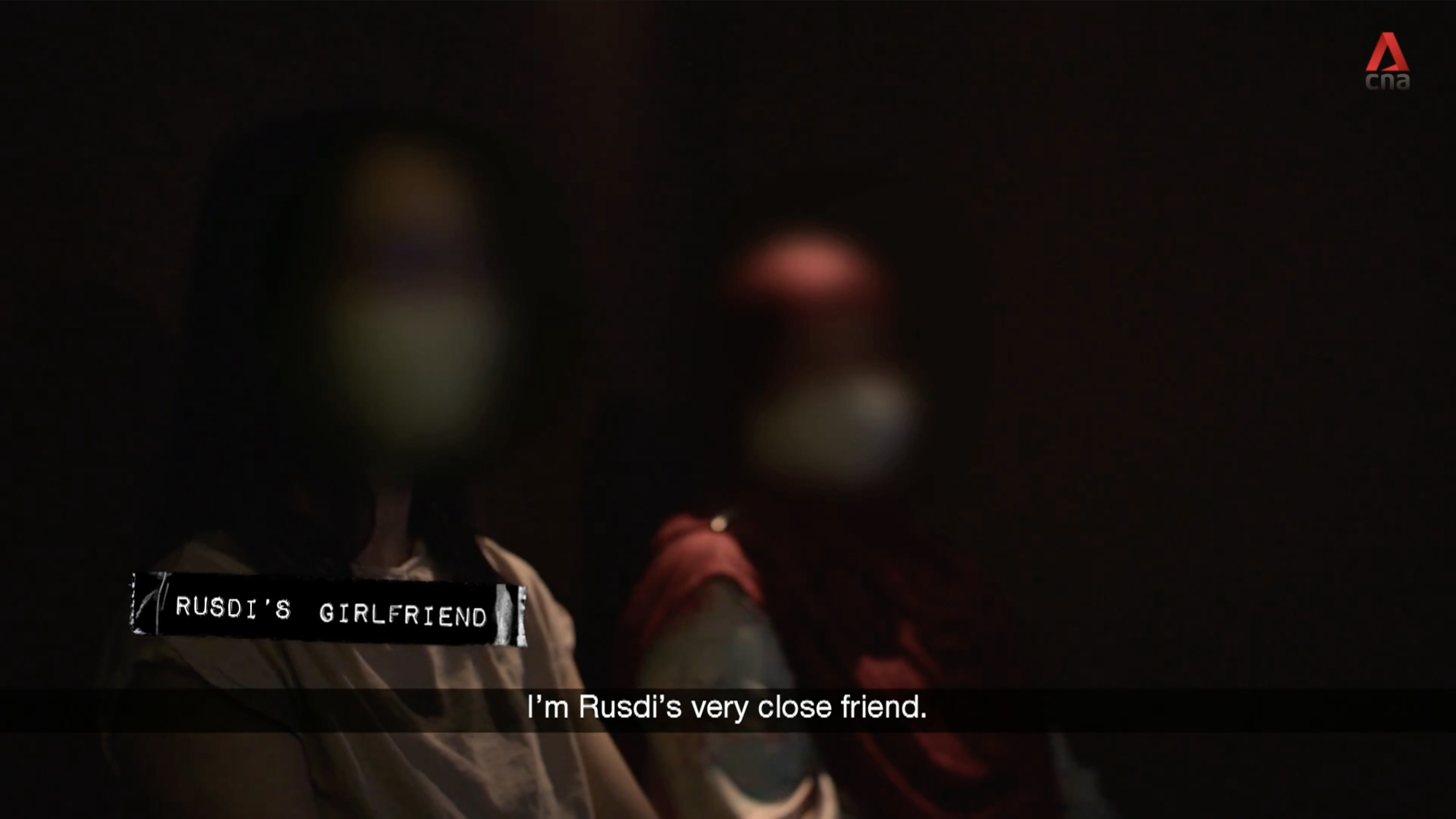 Image screenshot from CNA video.
Image screenshot from CNA video.
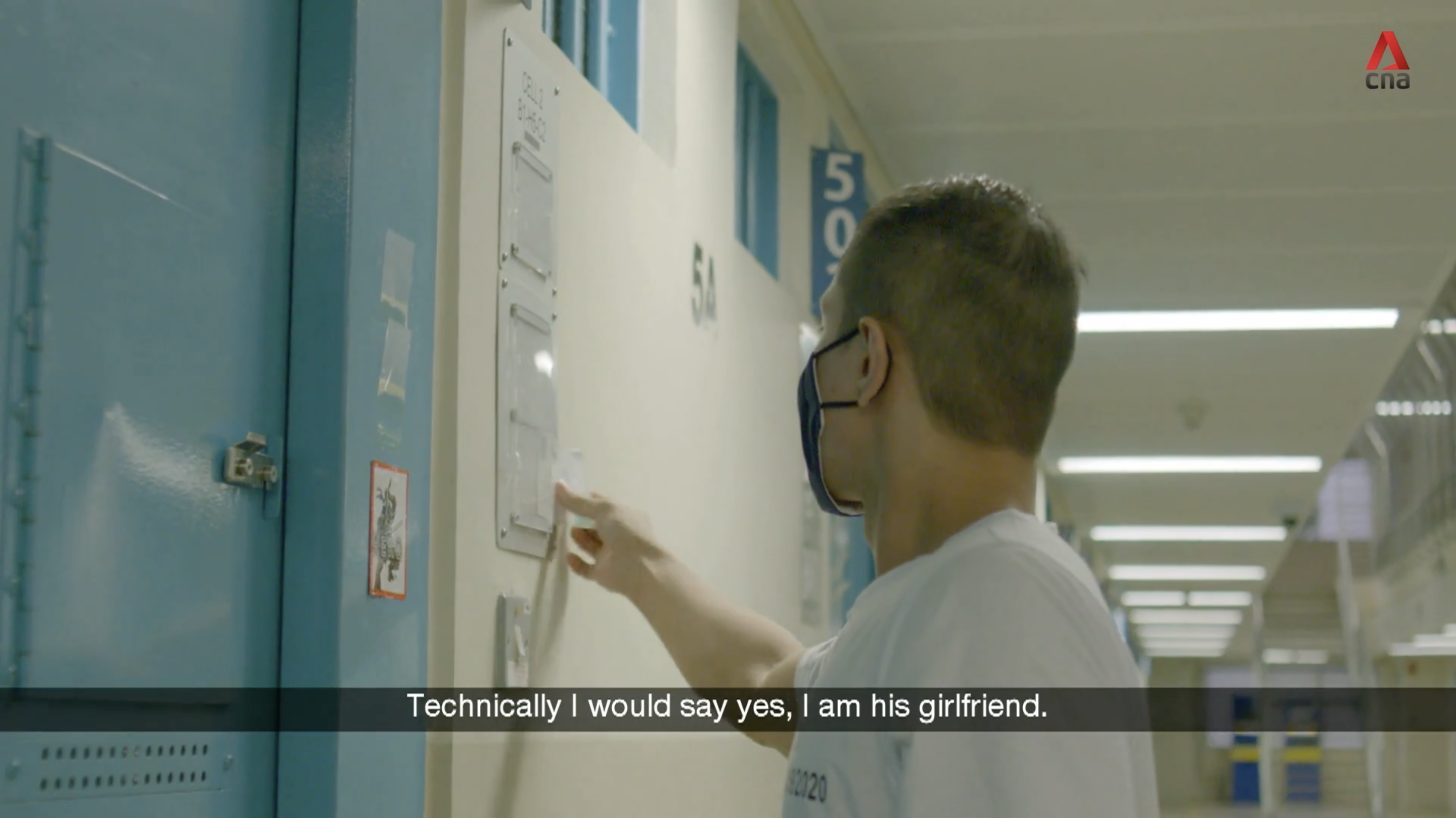 Image screenshot from CNA video.
Image screenshot from CNA video.
 Image screenshot from CNA video.
Image screenshot from CNA video.
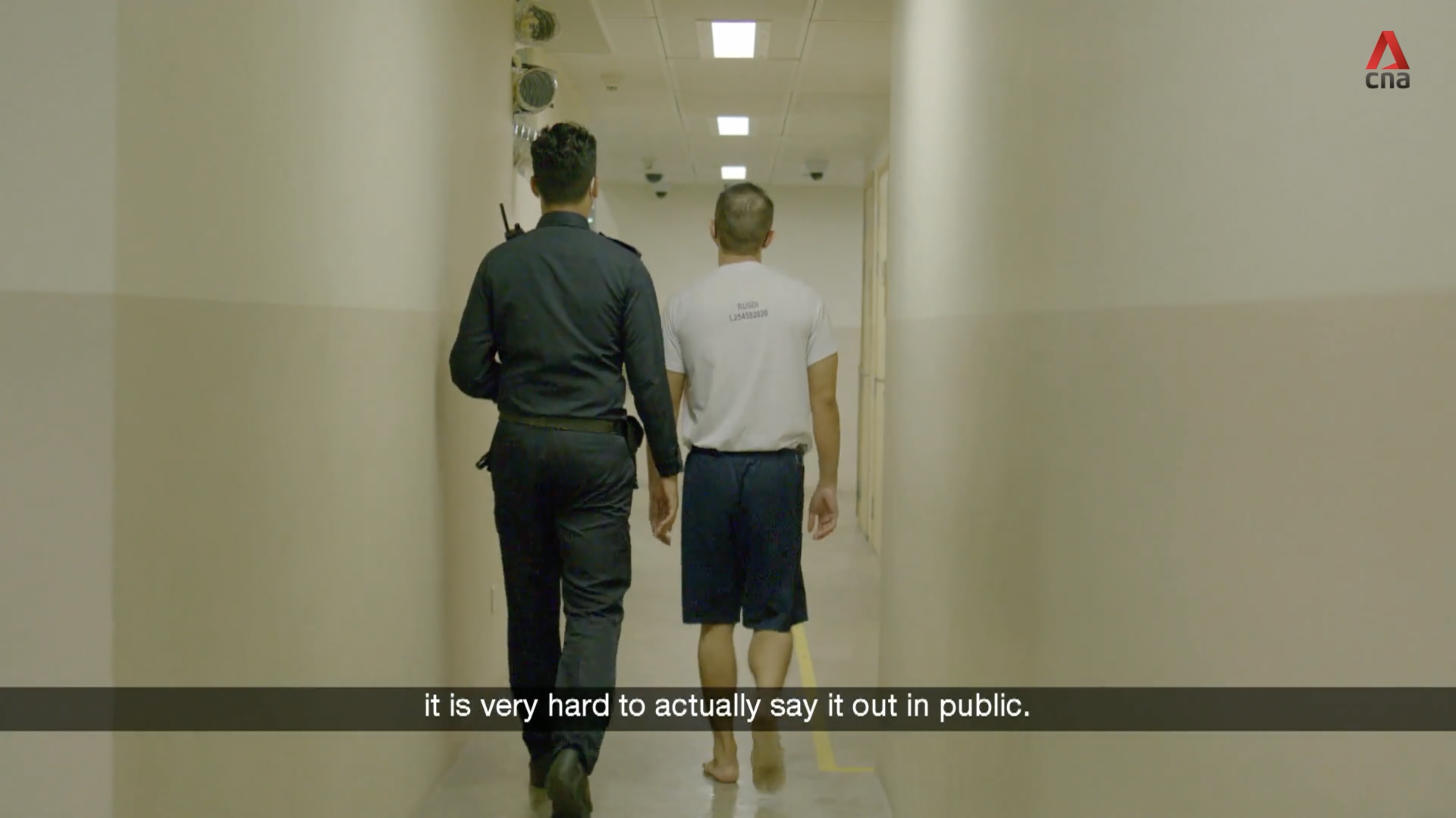 Image screenshot from CNA video.
Image screenshot from CNA video.
As his sentence was scheduled to end on Jan. 21, 2022, Rusdi would have been released before the episode aired.
Wants to go back to personal trainer industry
In the episode, the former personal trainer expressed his desire to get back into the fitness industry.
Or perhaps he never really left, as even behind bars, Rusdi was still seen guiding and training his fellow inmates.
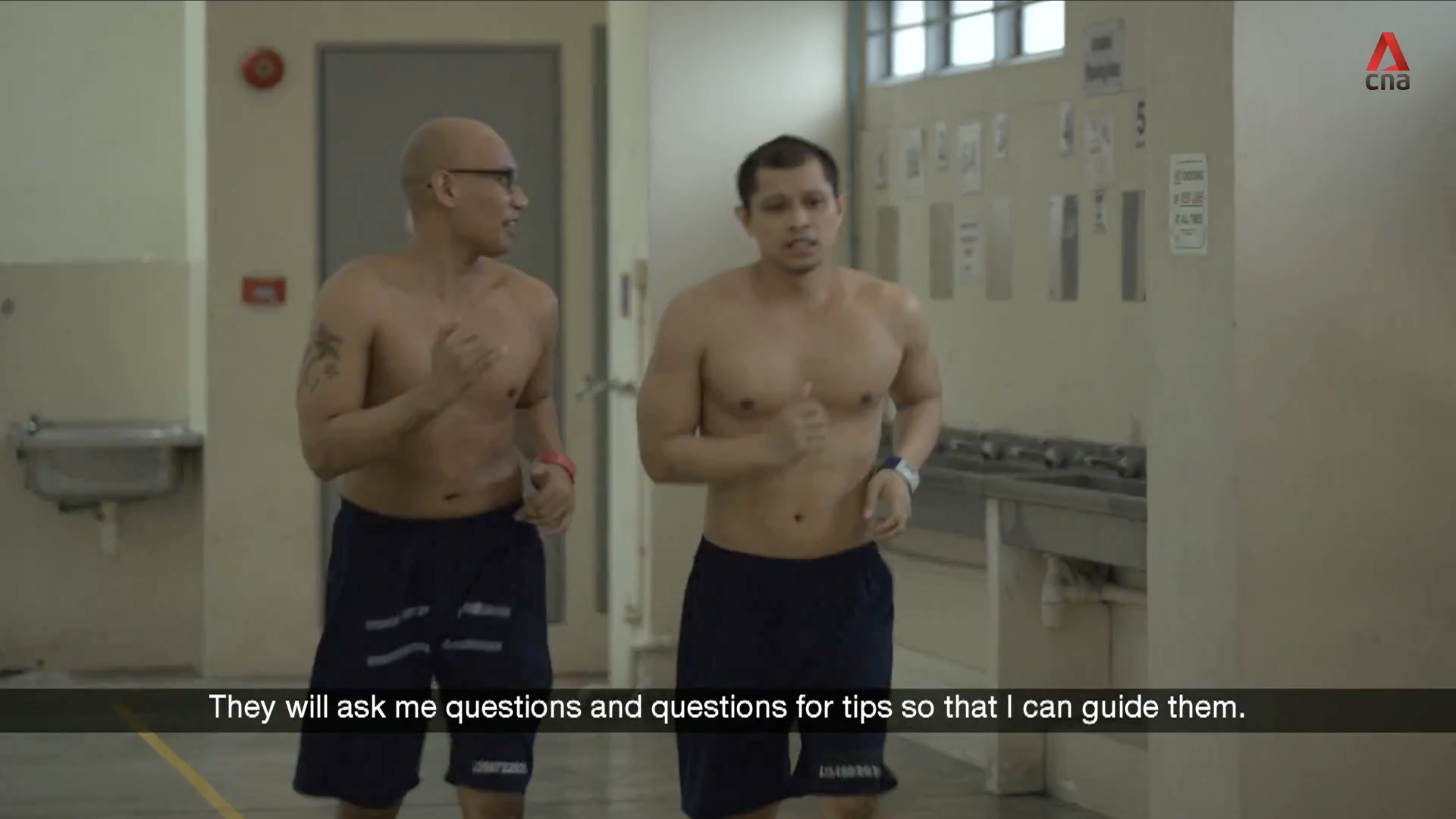 Image screenshot from CNA video.
Image screenshot from CNA video.
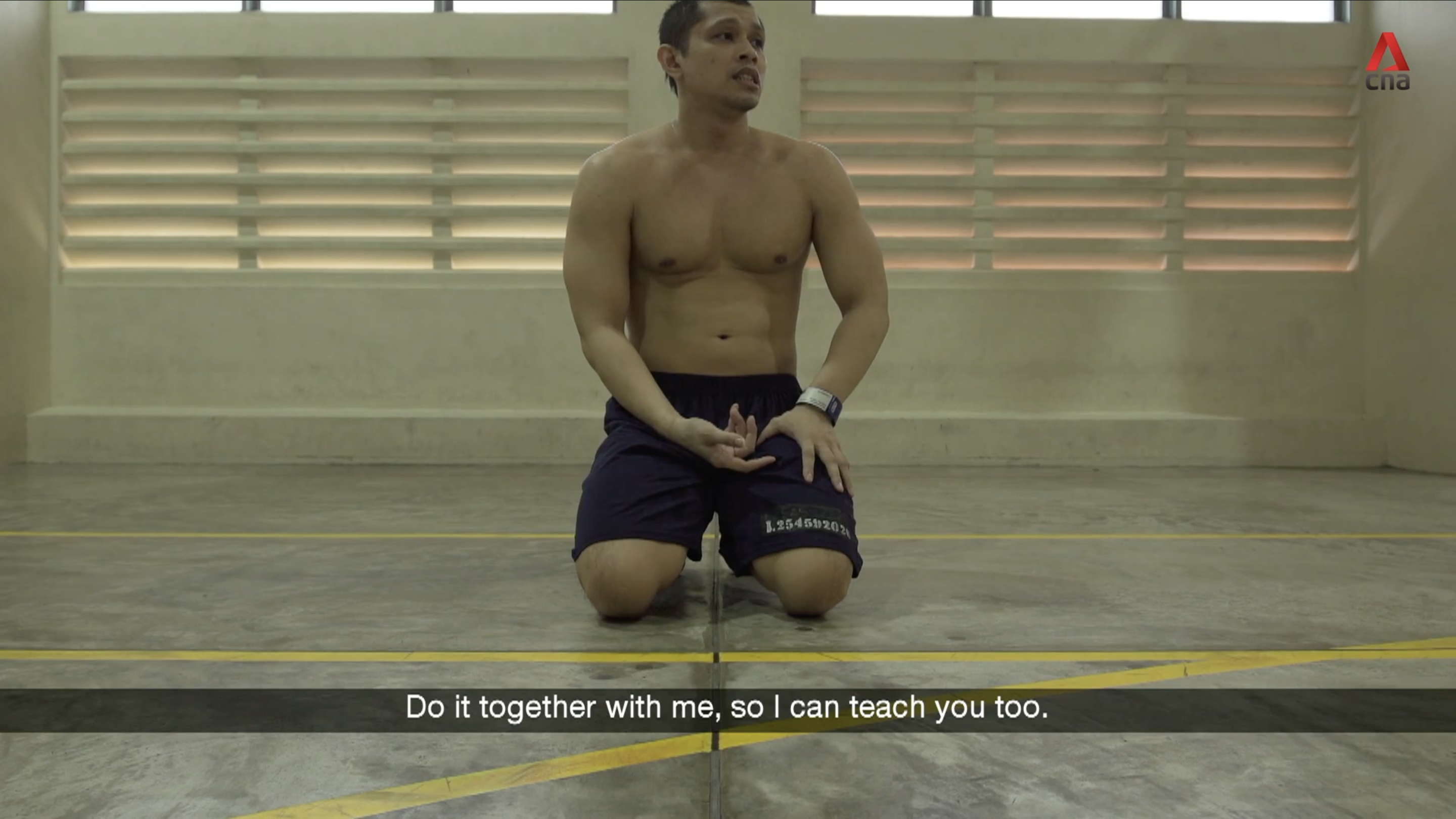 Image screenshot from CNA video.
Image screenshot from CNA video.
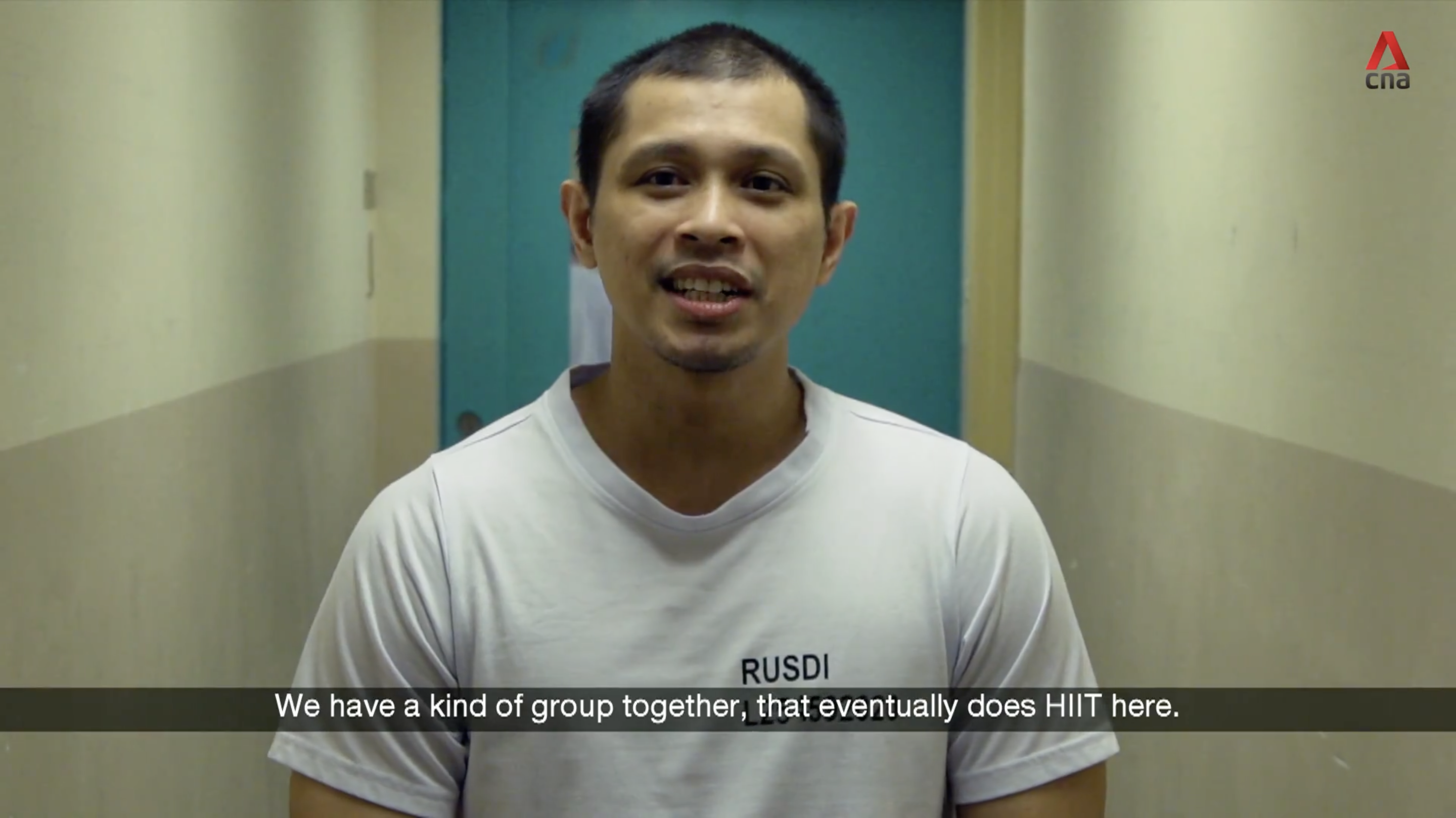 Image screenshot from CNA video.
Image screenshot from CNA video.
However, it seems his services were not exactly in high demand in prison.
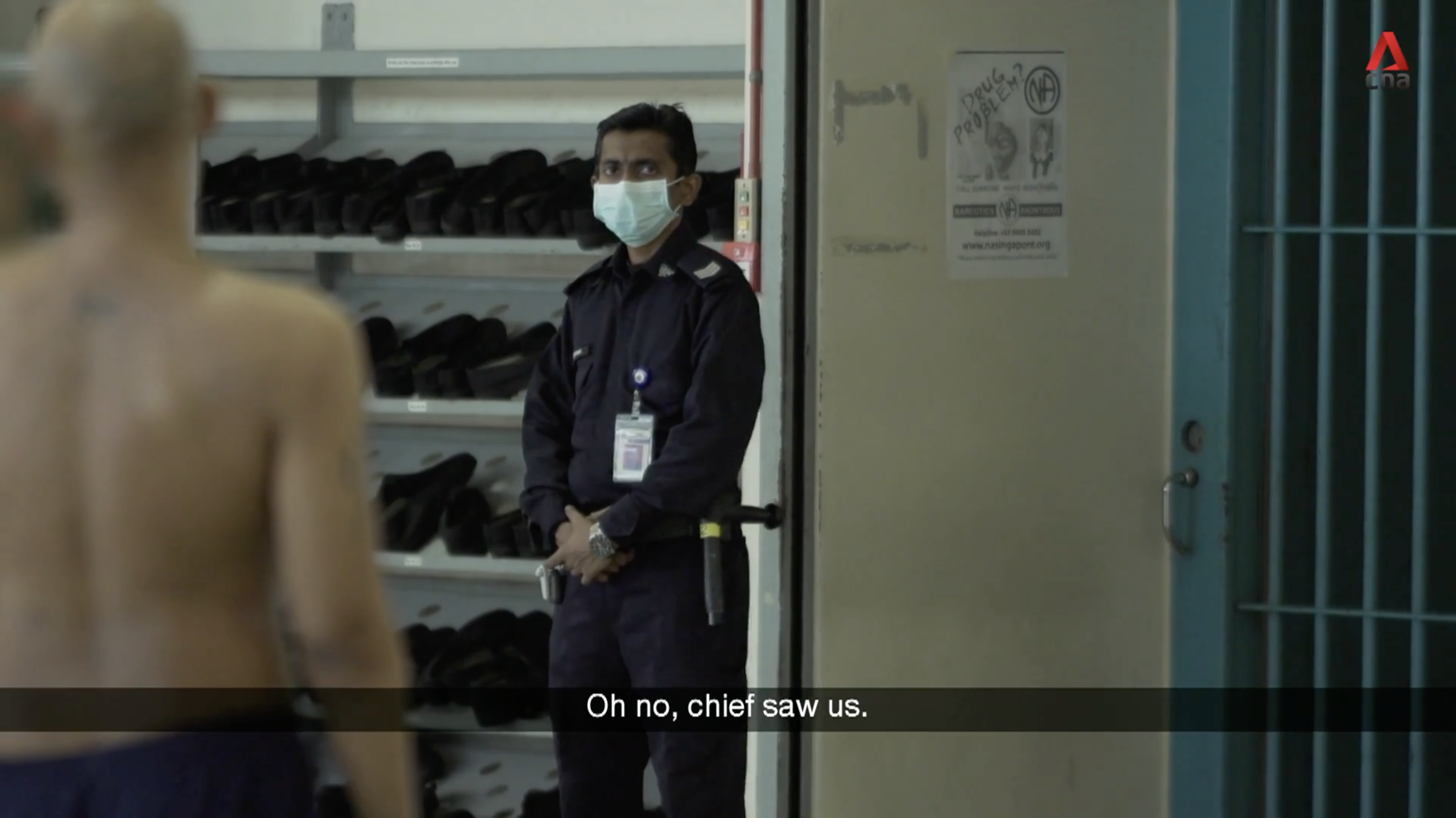 Image screenshot from CNA video.
Image screenshot from CNA video.
Prison a testy place, no physical contact recommended
Physical contact between inmates is very much like a double-edged sword within prison.
It helps build rapport and strengthen the bonds between inmates, but it could also ignite conflict.
As a result, inmates are generally discouraged from having physical contact with one another, to prevent potential disputes and fights, or gang-related activities.
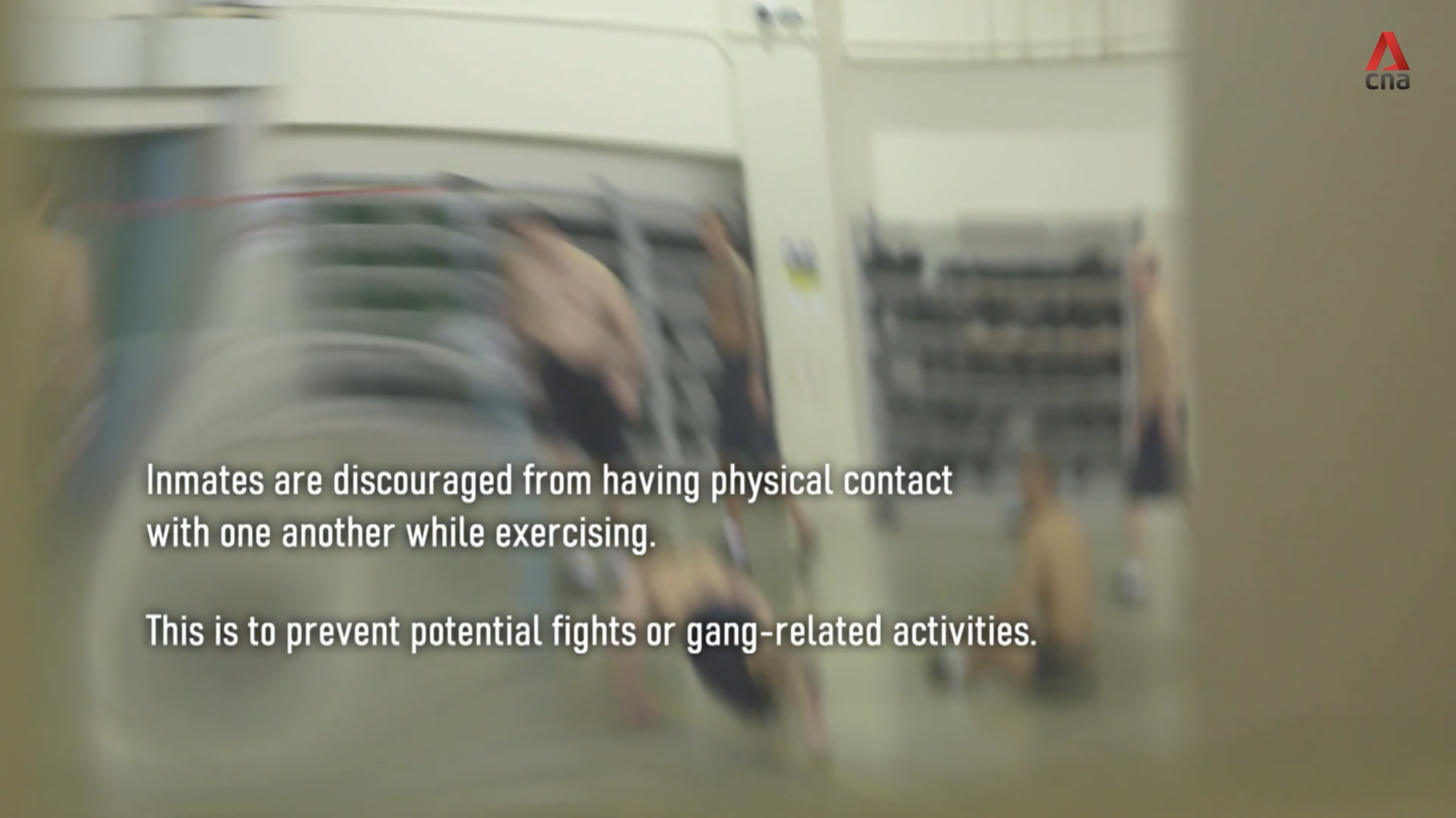 Image screenshot from CNA video.
Image screenshot from CNA video.
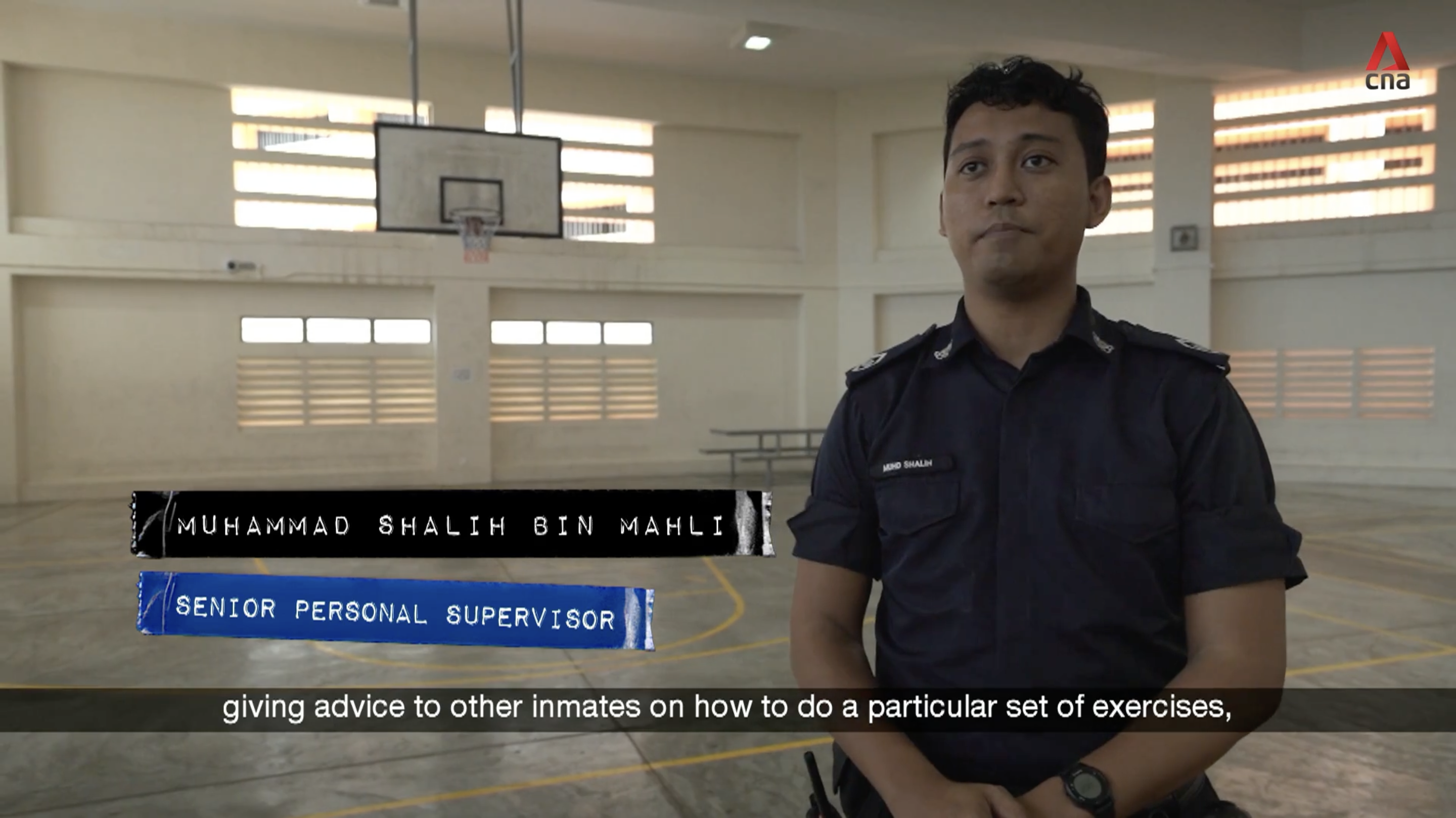 Image screenshot from CNA video.
Image screenshot from CNA video.
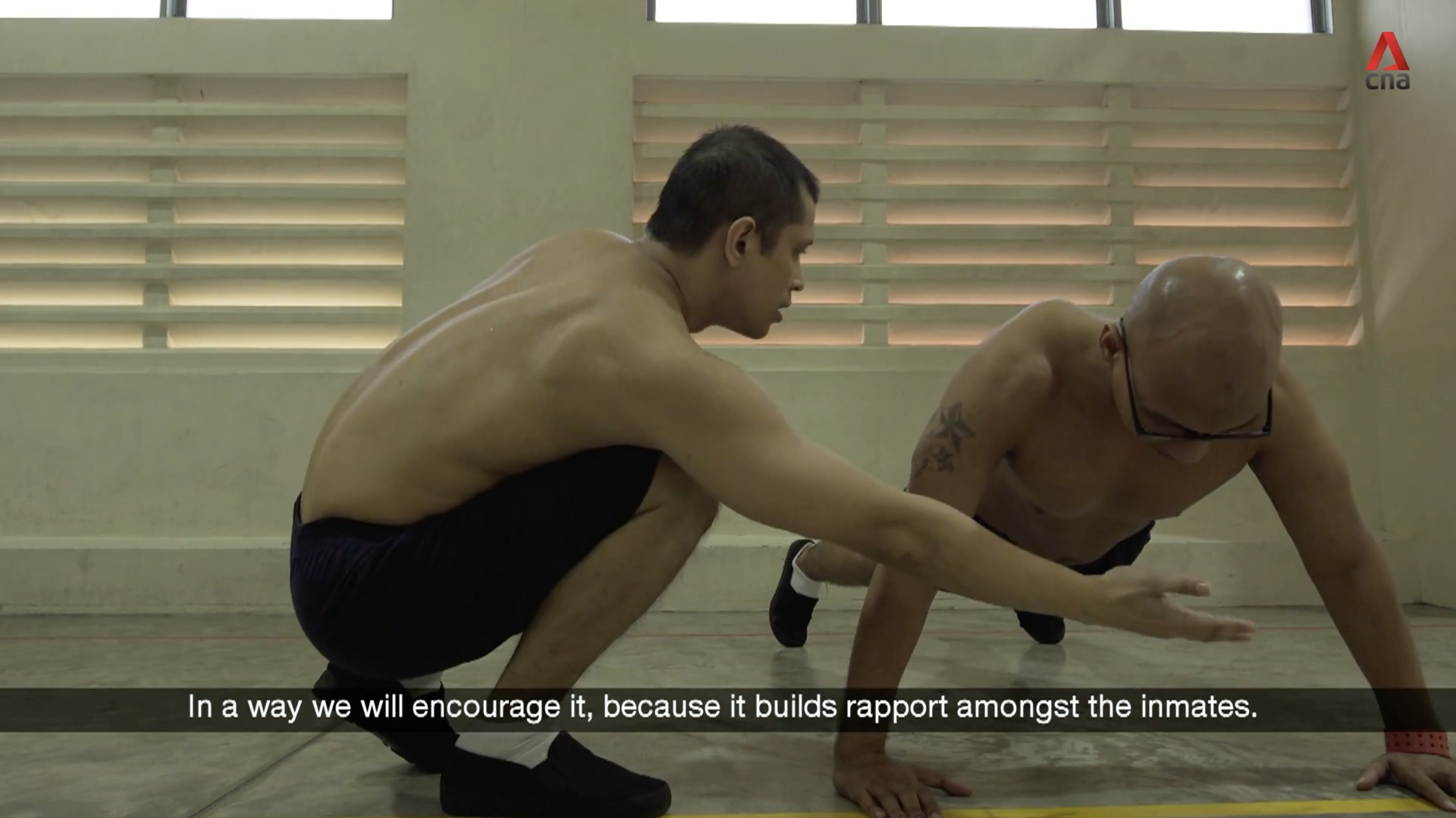 Image screenshot from CNA video.
Image screenshot from CNA video.
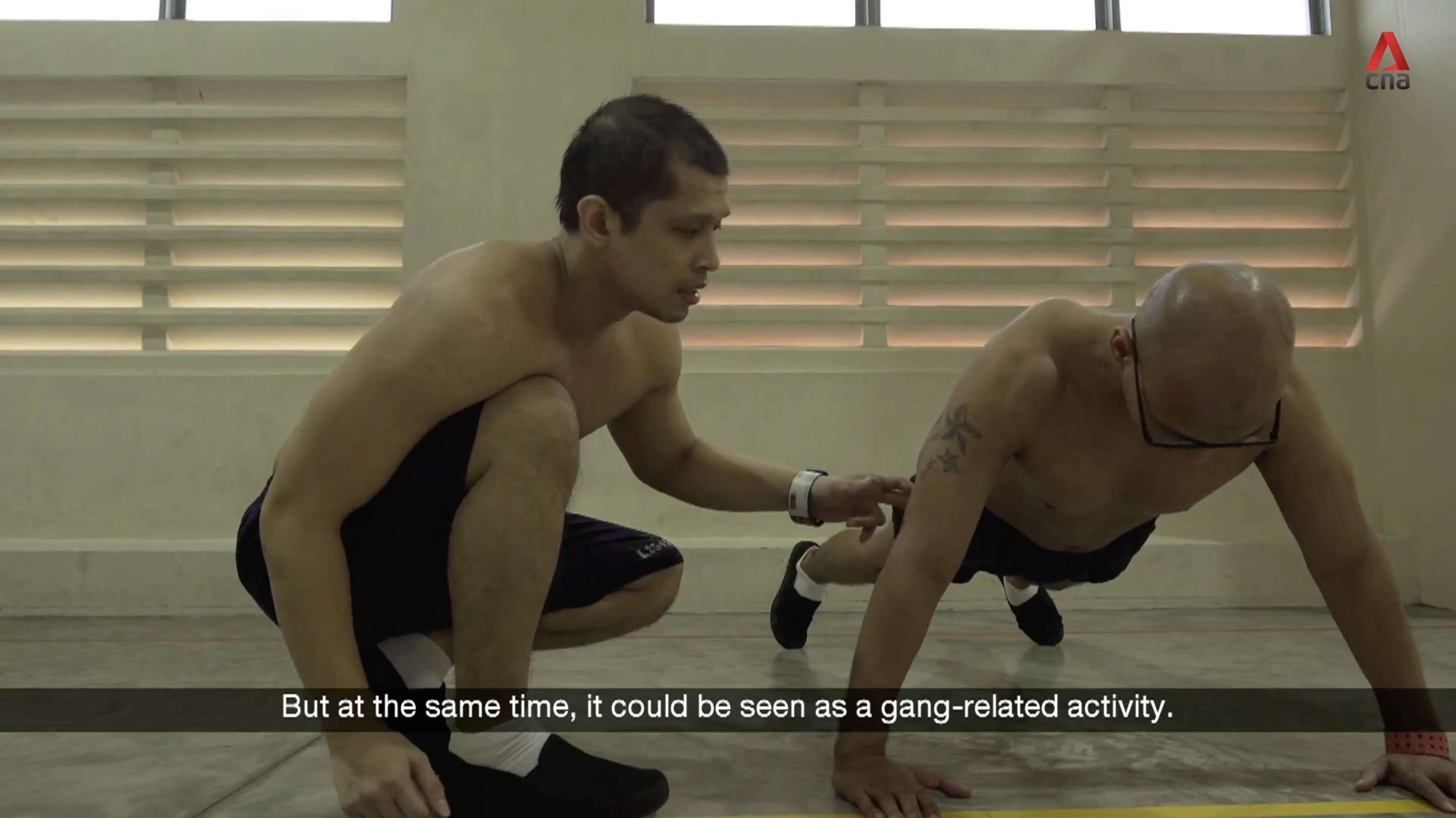 Image screenshot from CNA video.
Image screenshot from CNA video.
Going back to same industry has risks
His mother and "girlfriend", however, are not that keen.
And understandably so, as that was where Rusdi was introduced to the illegal substance crystal methamphetamine, or colloquially known as ICE.
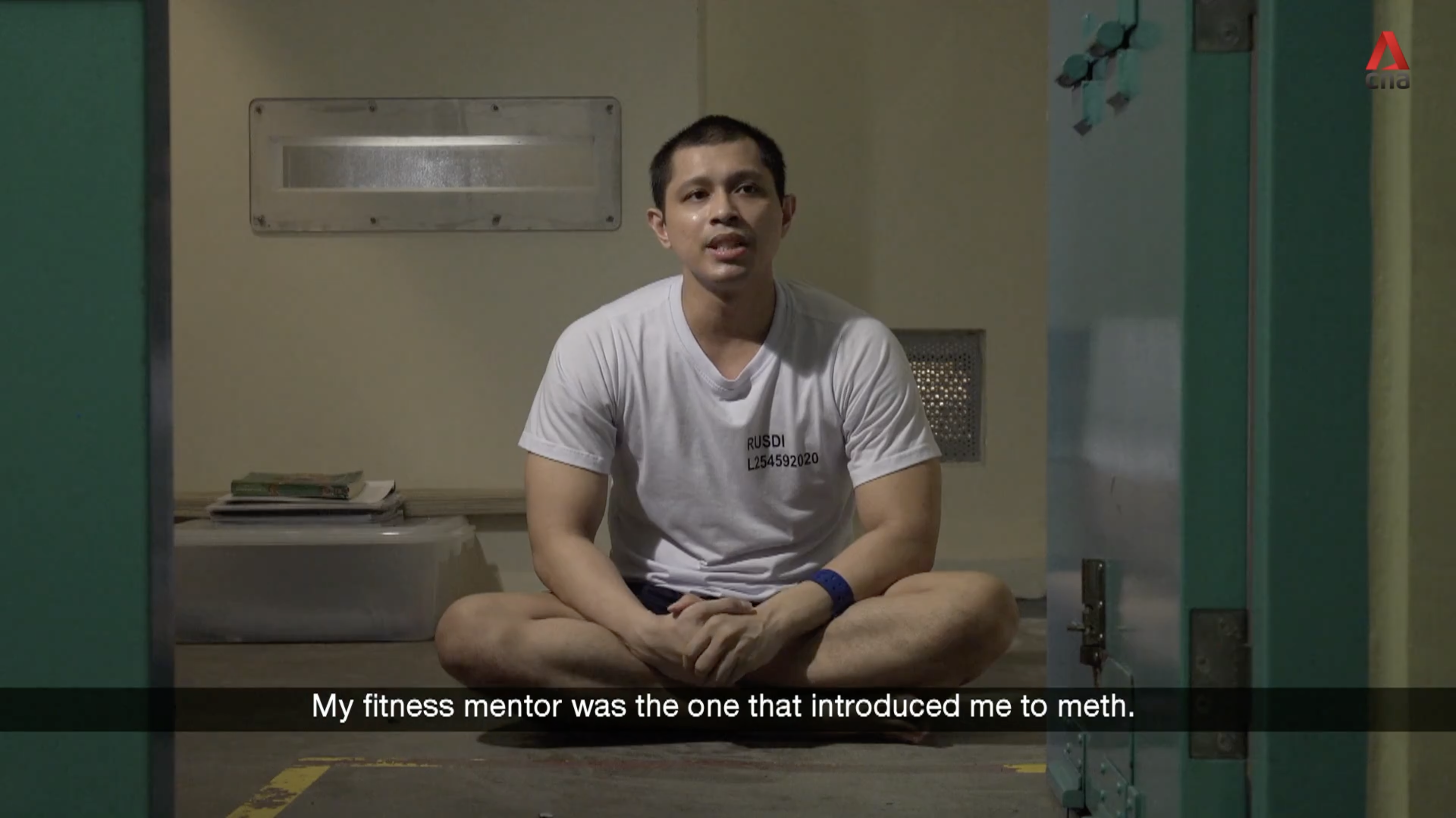 Image screenshot from CNA video.
Image screenshot from CNA video.
Introduction of new cells
Keen-eyed observers may have noticed from the second episode that Iskandar's prison dwelling looked vastly different from the rest of the cast.
The first and most immediate observation was that his cell was slightly more populated with three other inmates, whom Iskandar is made to spend time with together.
 Image screenshot from CNA video.
Image screenshot from CNA video.
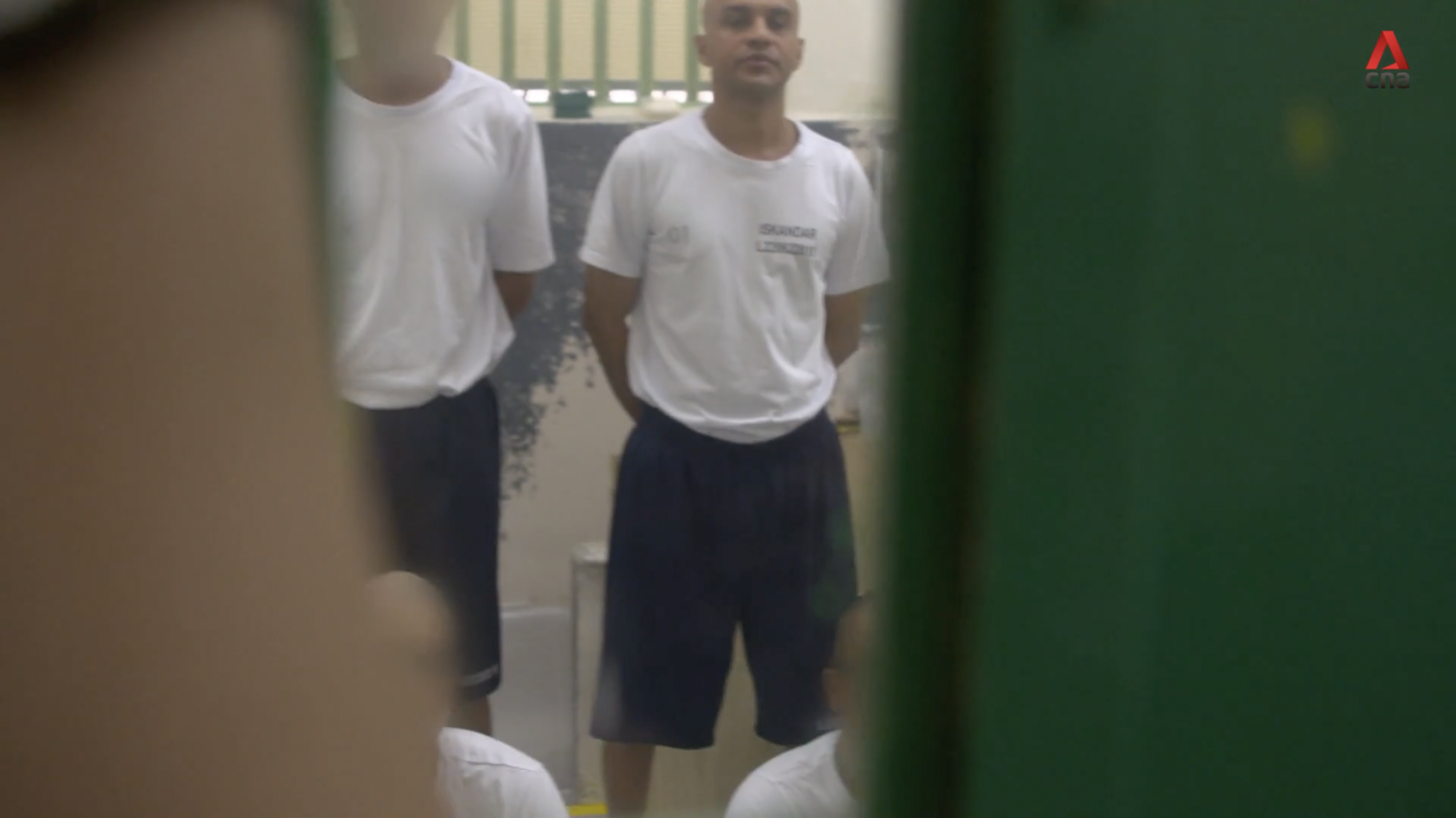 Image screenshot from CNA video.
Image screenshot from CNA video.
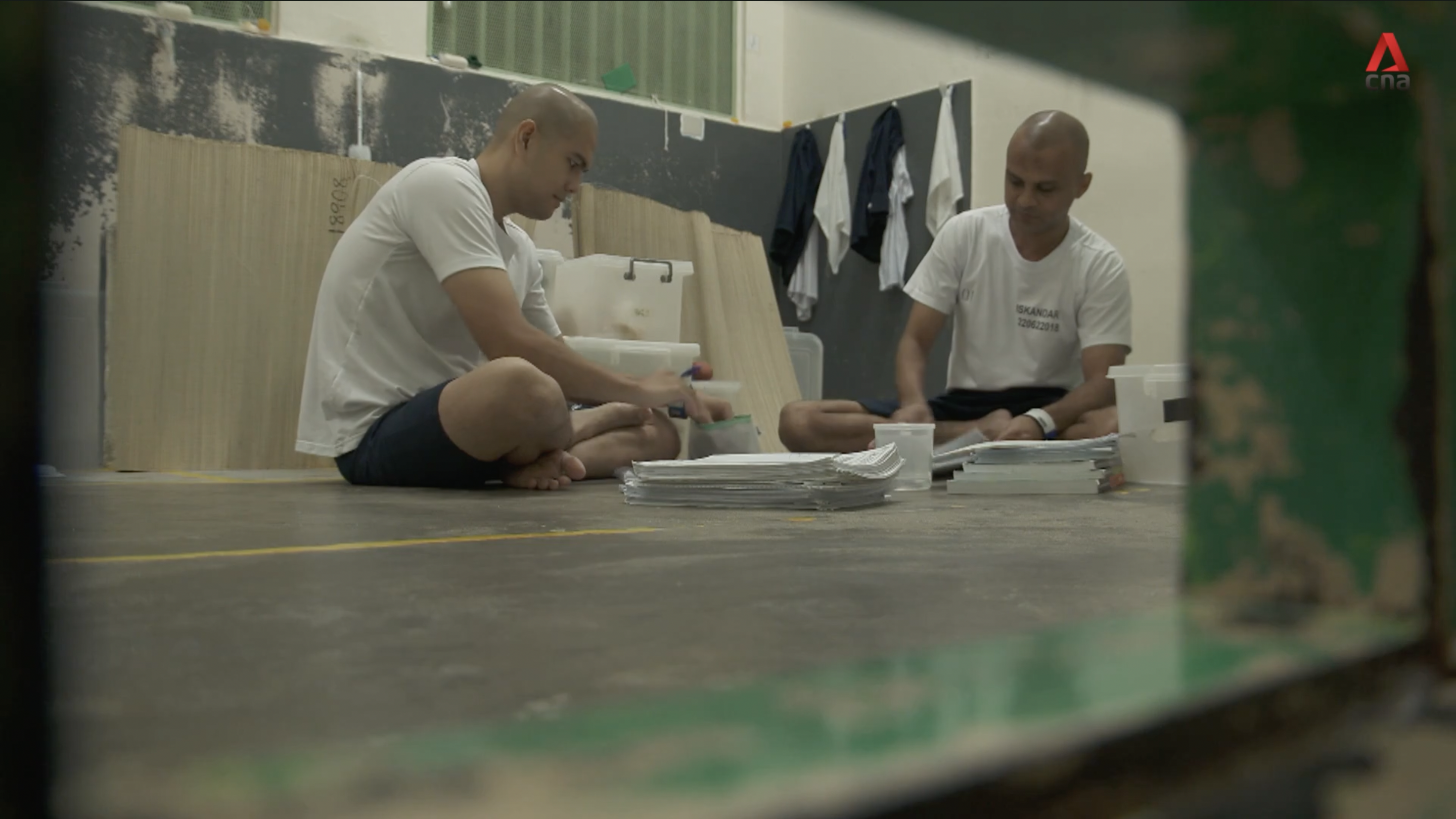 Image screenshot from CNA video.
Image screenshot from CNA video.
Secondly, his cell appears larger than the rest of the other featured inmates' single-man cells, and has three doors instead of one.
Even the doors are different, and has only one ground-level aperture, or opening, instead of two. There are also noticeably more cloth hooks to accommodate more occupants within the cell.
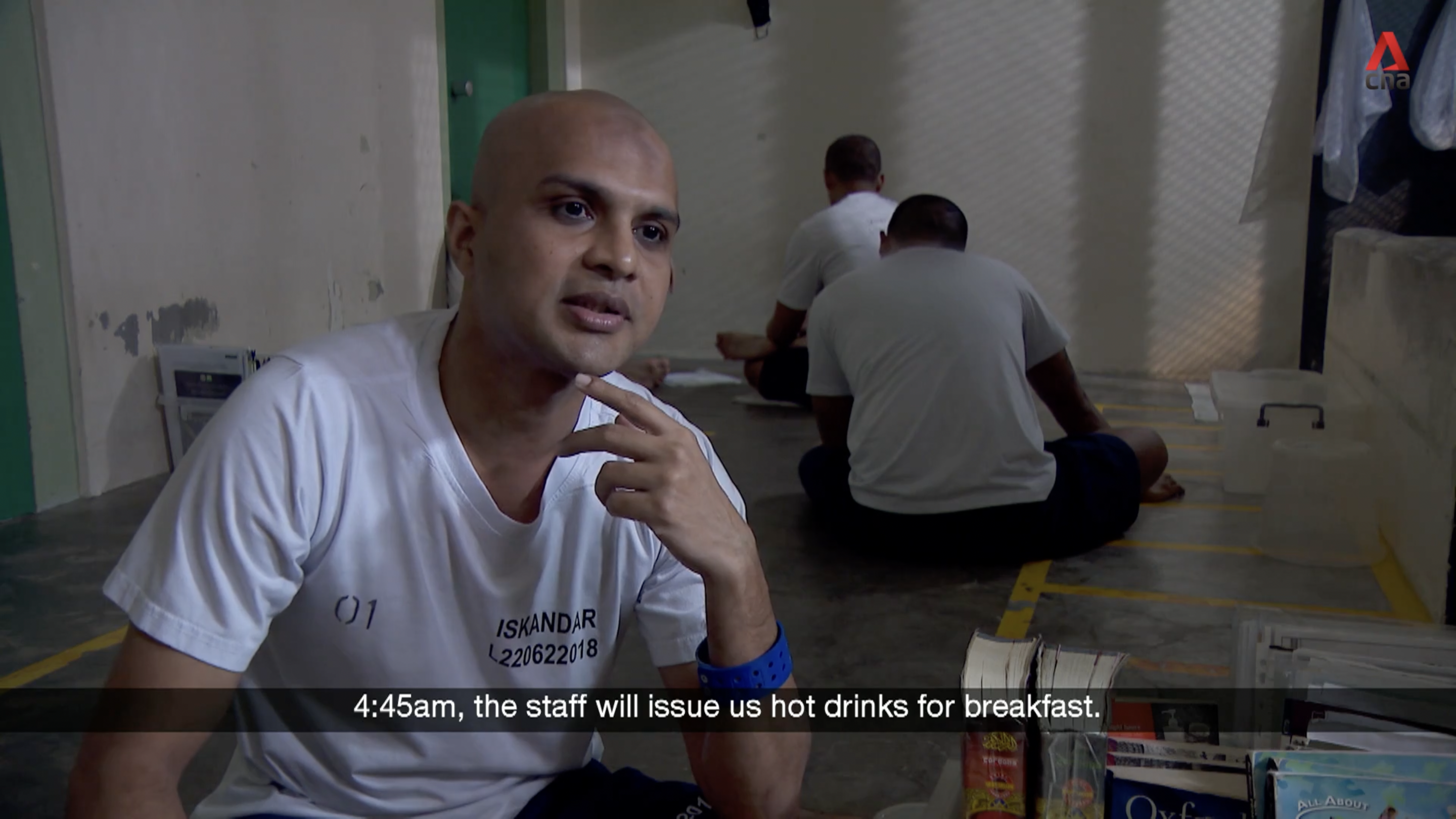 Image screenshot from CNA video.
Image screenshot from CNA video.
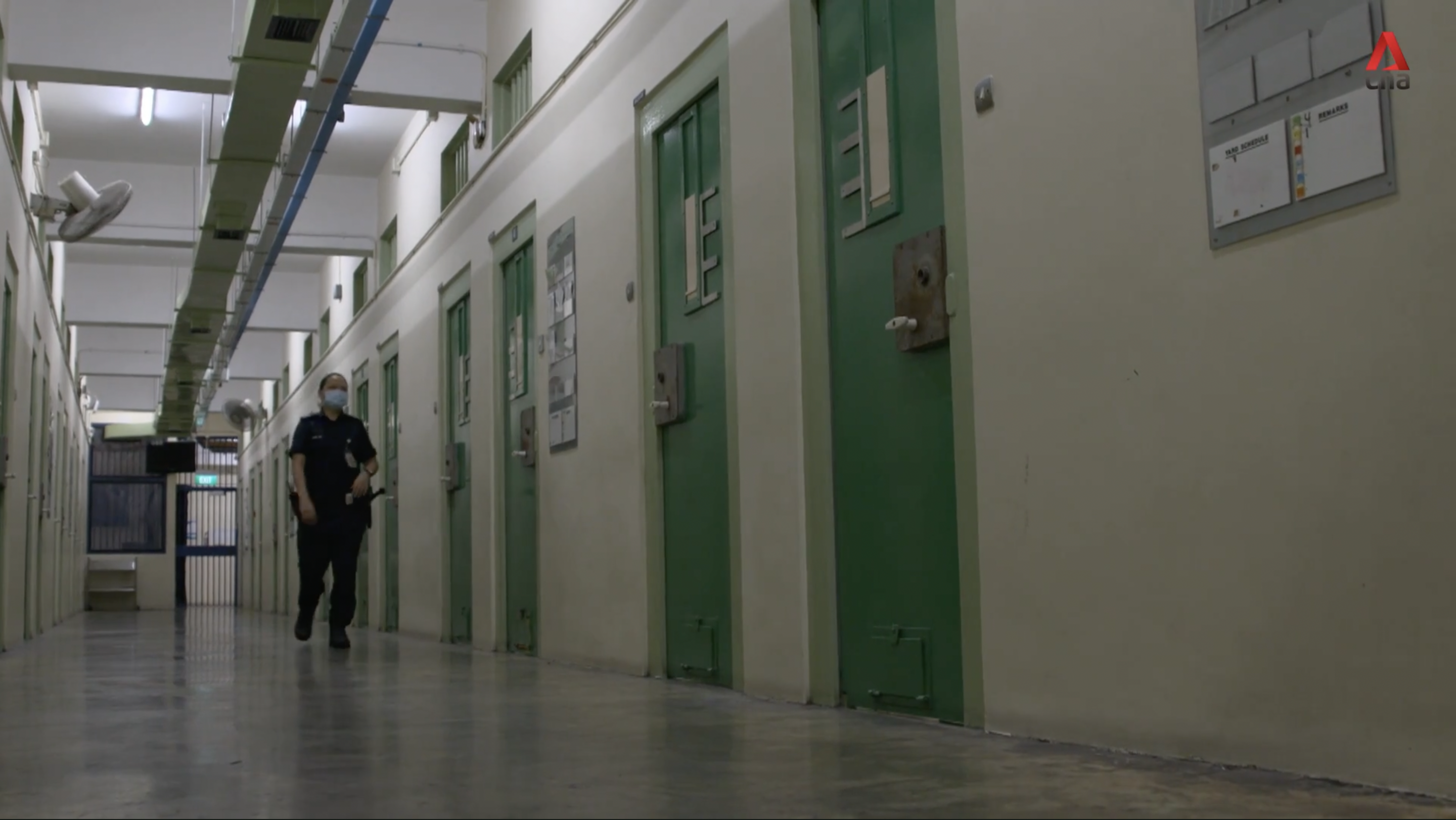 Image screenshot from CNA video.
Image screenshot from CNA video.
Prison school
The reason is because Iskandar was transferred out of the maximum security institution, which houses the rest of the cast, and enrolled himself into prison school on Jan. 3, 2020.
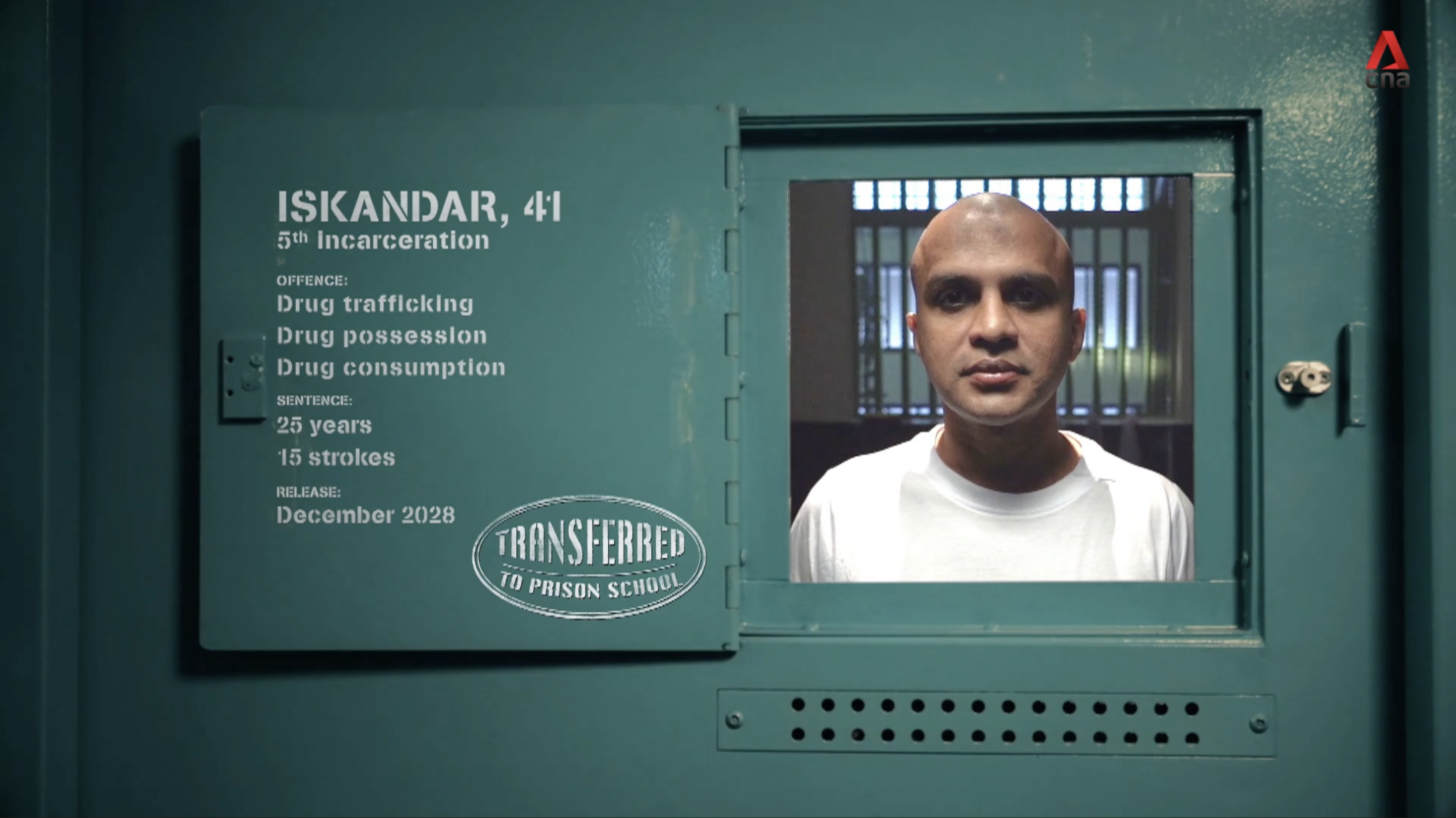 Image screenshot from CNA video.
Image screenshot from CNA video.
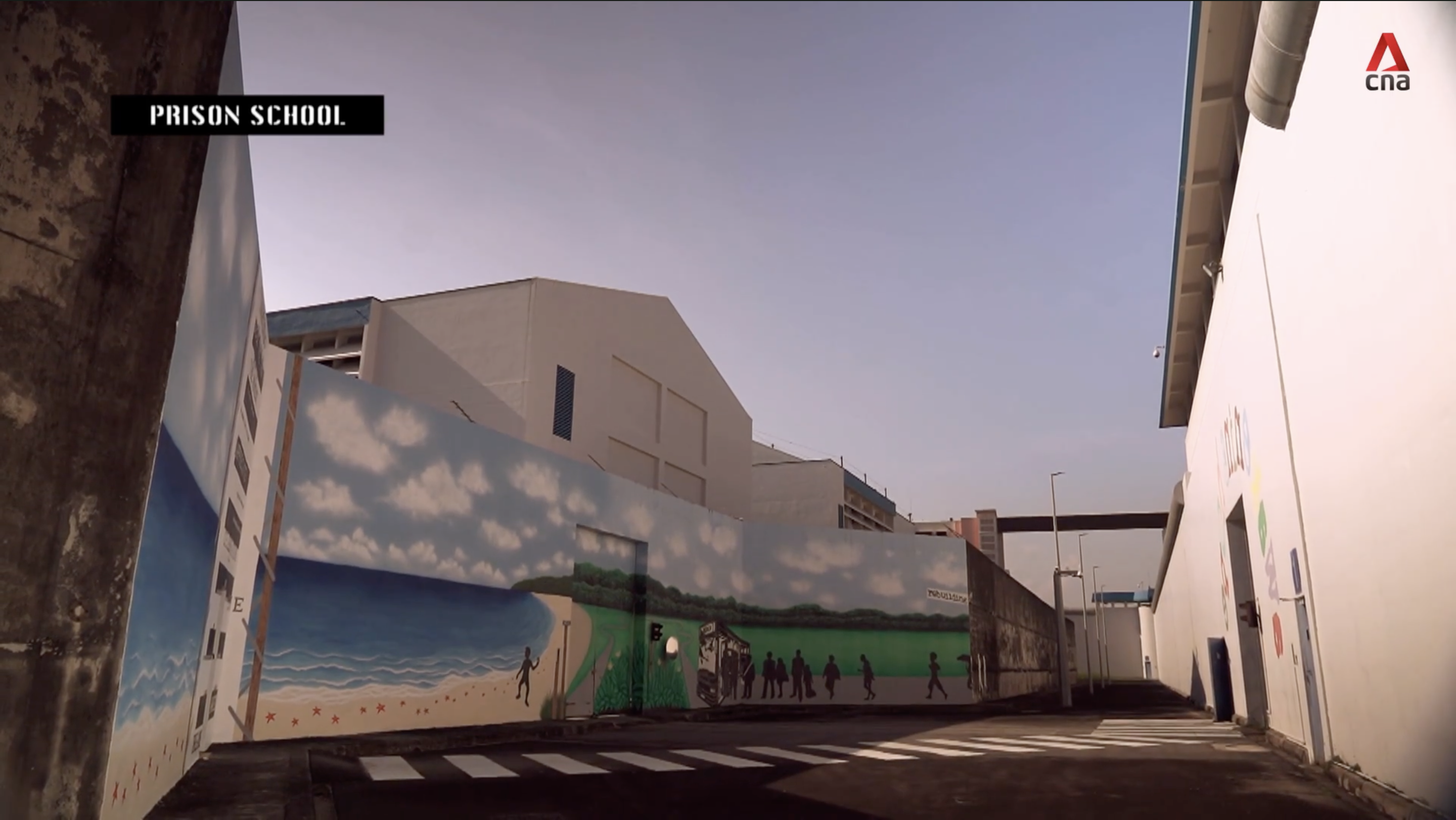 Image screenshot from CNA video.
Image screenshot from CNA video.
However, not all inmates who display interest in and apply to prison school are selected, and only half of the 600 to 800 inmates yearly will get a shot at furthering their studies in prison.
Inmates' admission relies on their conduct and "runway" in prison, or the duration of their imprisonment.
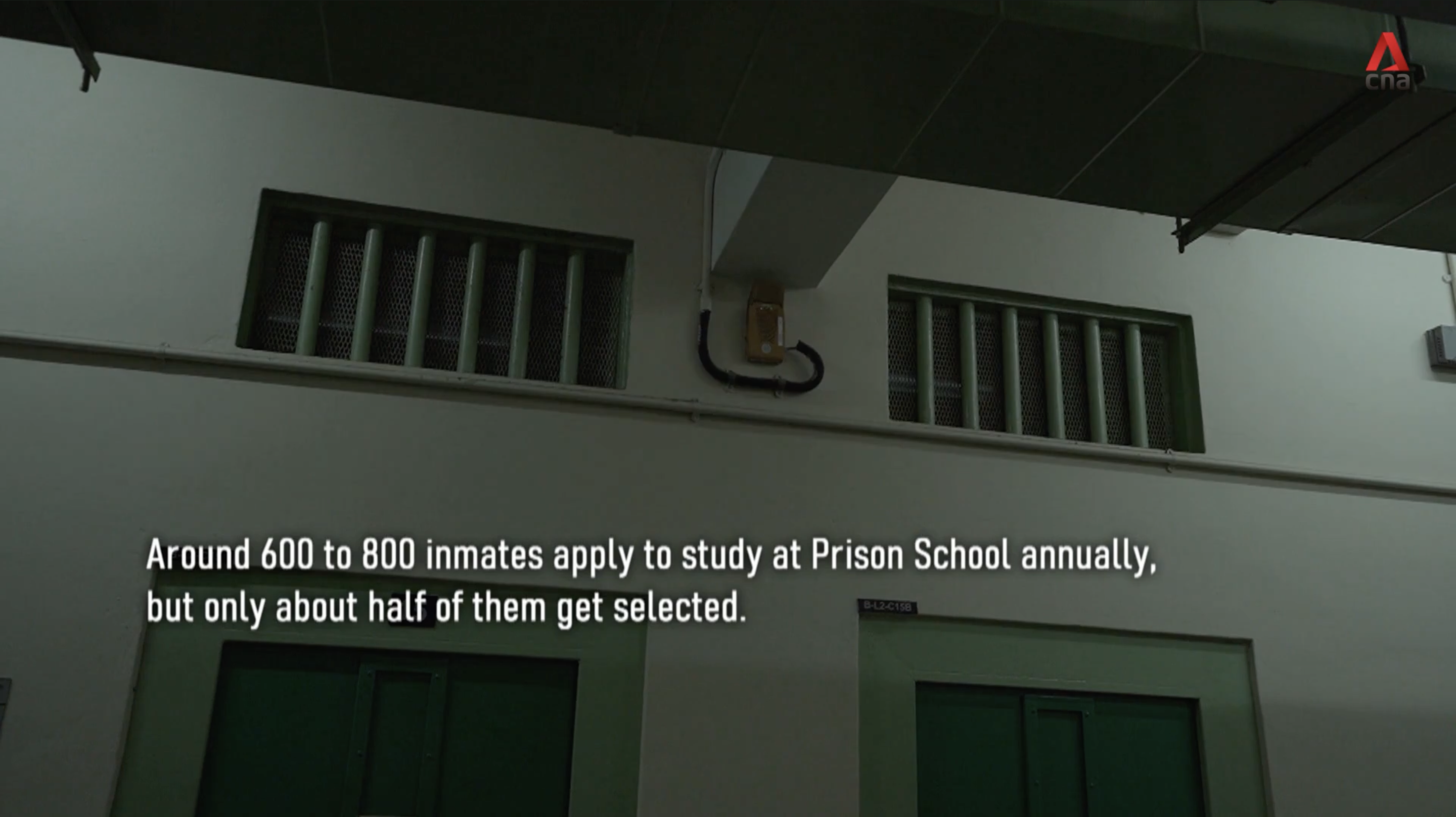 Image screenshot from CNA video.
Image screenshot from CNA video.
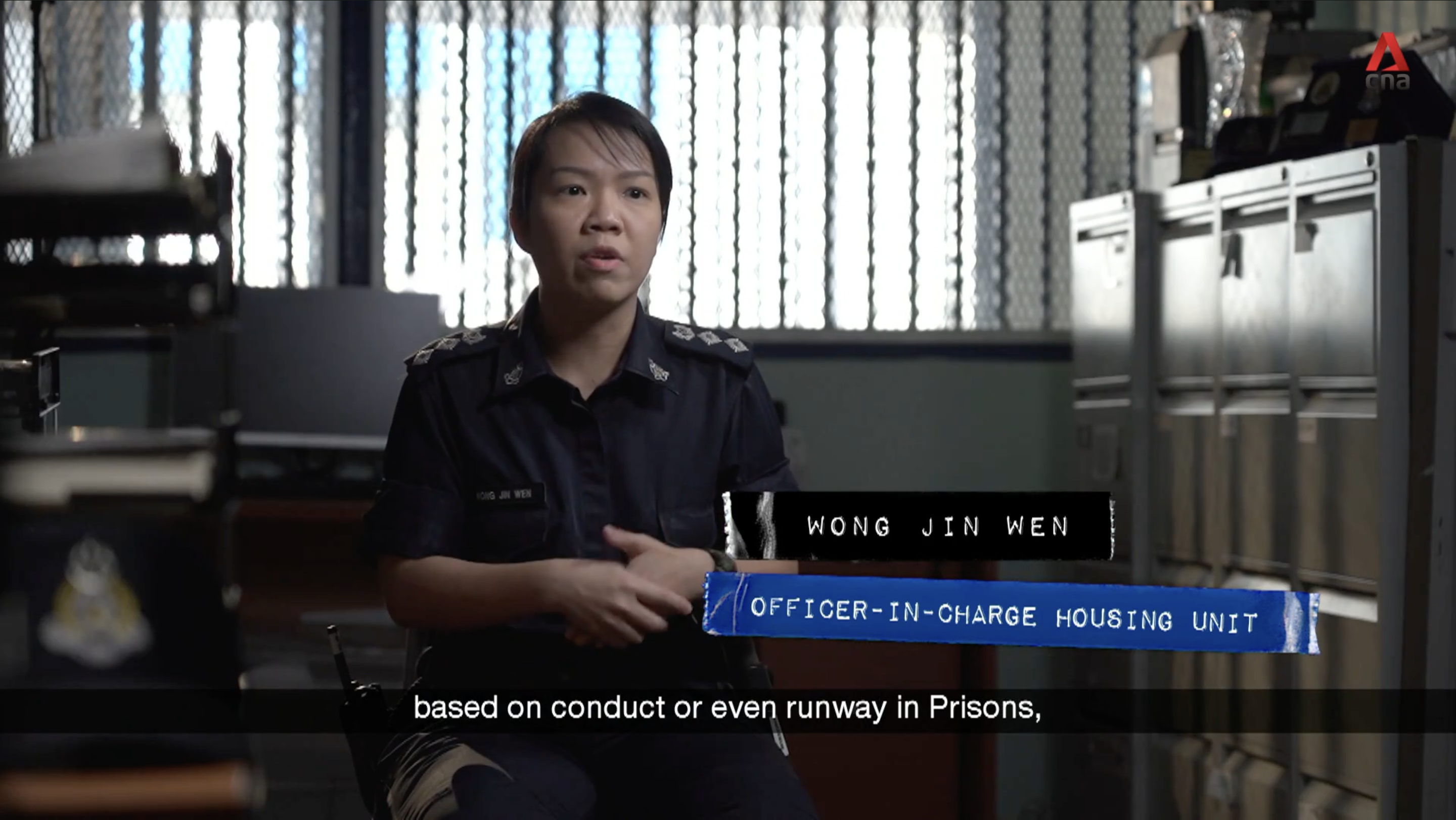 Image screenshot from CNA video.
Image screenshot from CNA video.
Studying to turn over a new leaf
One of the reasons why Iskandar applied for prison school was to turn his life around and turn over a new leaf.
He was initially on death row and destined for the gallows for trafficking heroin, but was offered a 25-year jail sentence in the final hour instead, along with a shot at redemption.
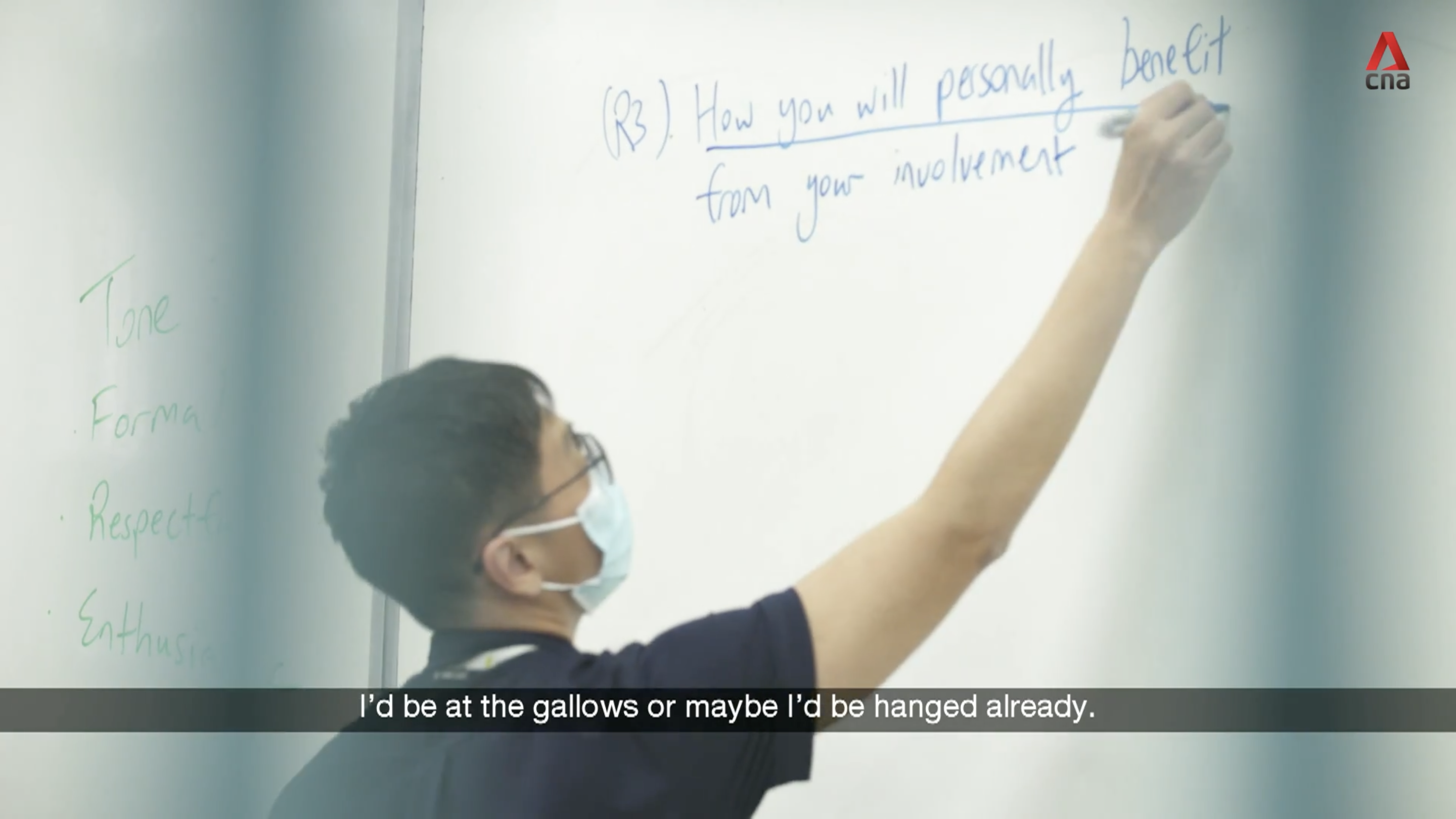 Image screenshot from CNA video.
Image screenshot from CNA video.
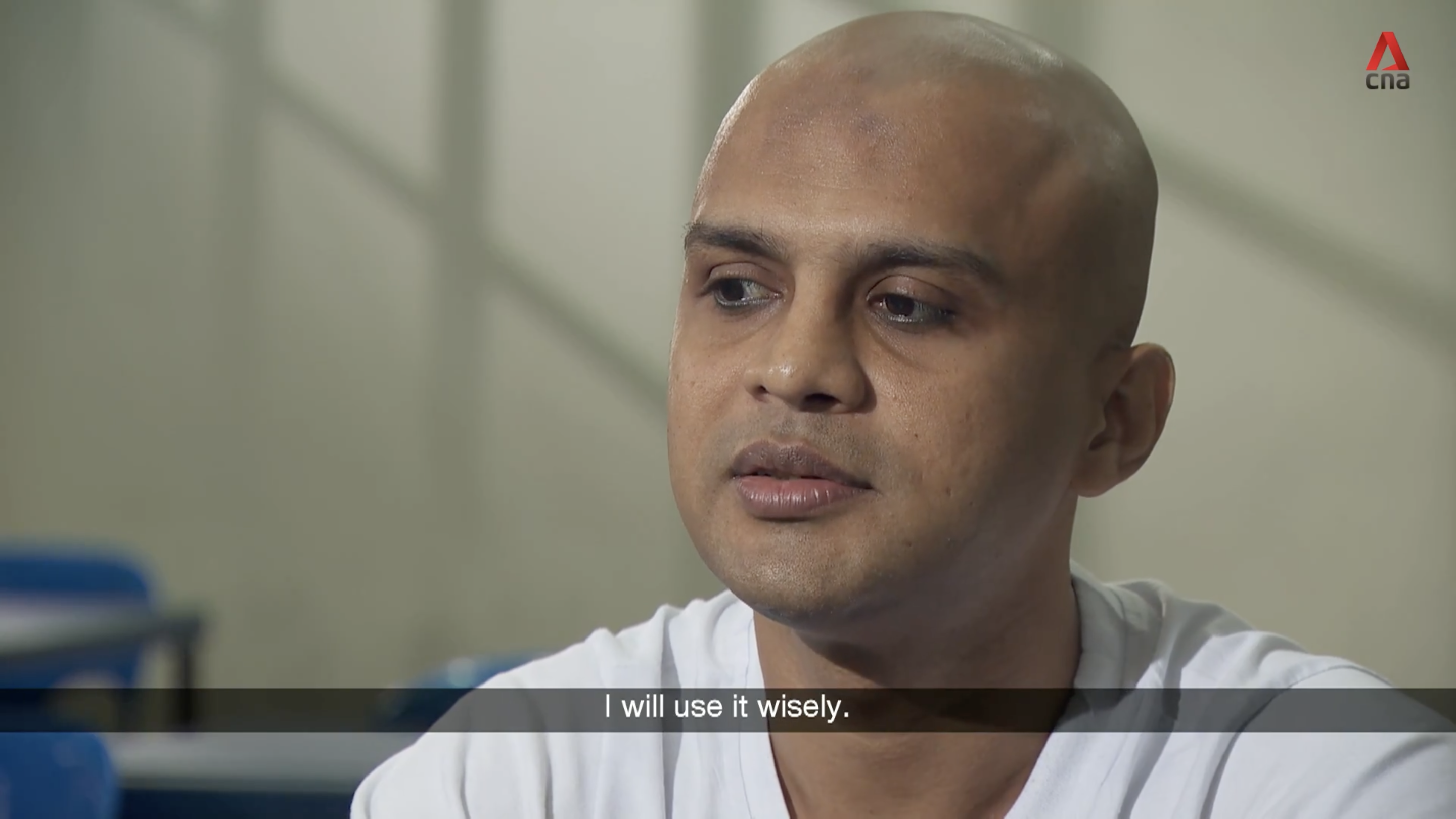 Image screenshot from CNA video.
Image screenshot from CNA video.
This was his fifth incarceration, and Iskandar said he wanted to make the most out of it by completing his General Certificate of Education normal level (N-level), ordinary level (O-level), and diploma in logistics, all whilst serving his 25-year jail sentence.
Besides this, he also expressed plans of furthering his education with a degree in the logistics-related field.
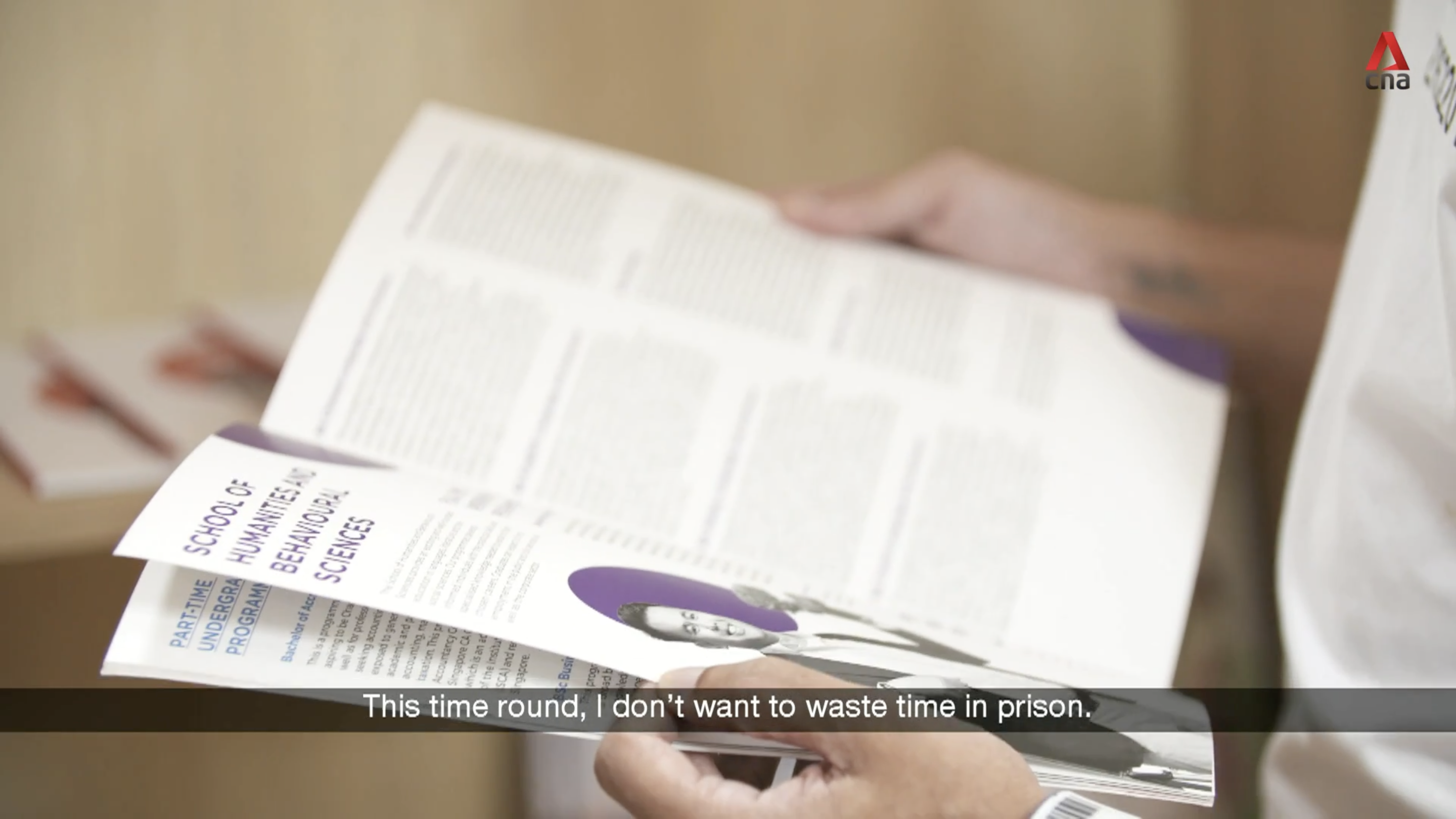 Image screenshot from CNA video.
Image screenshot from CNA video.
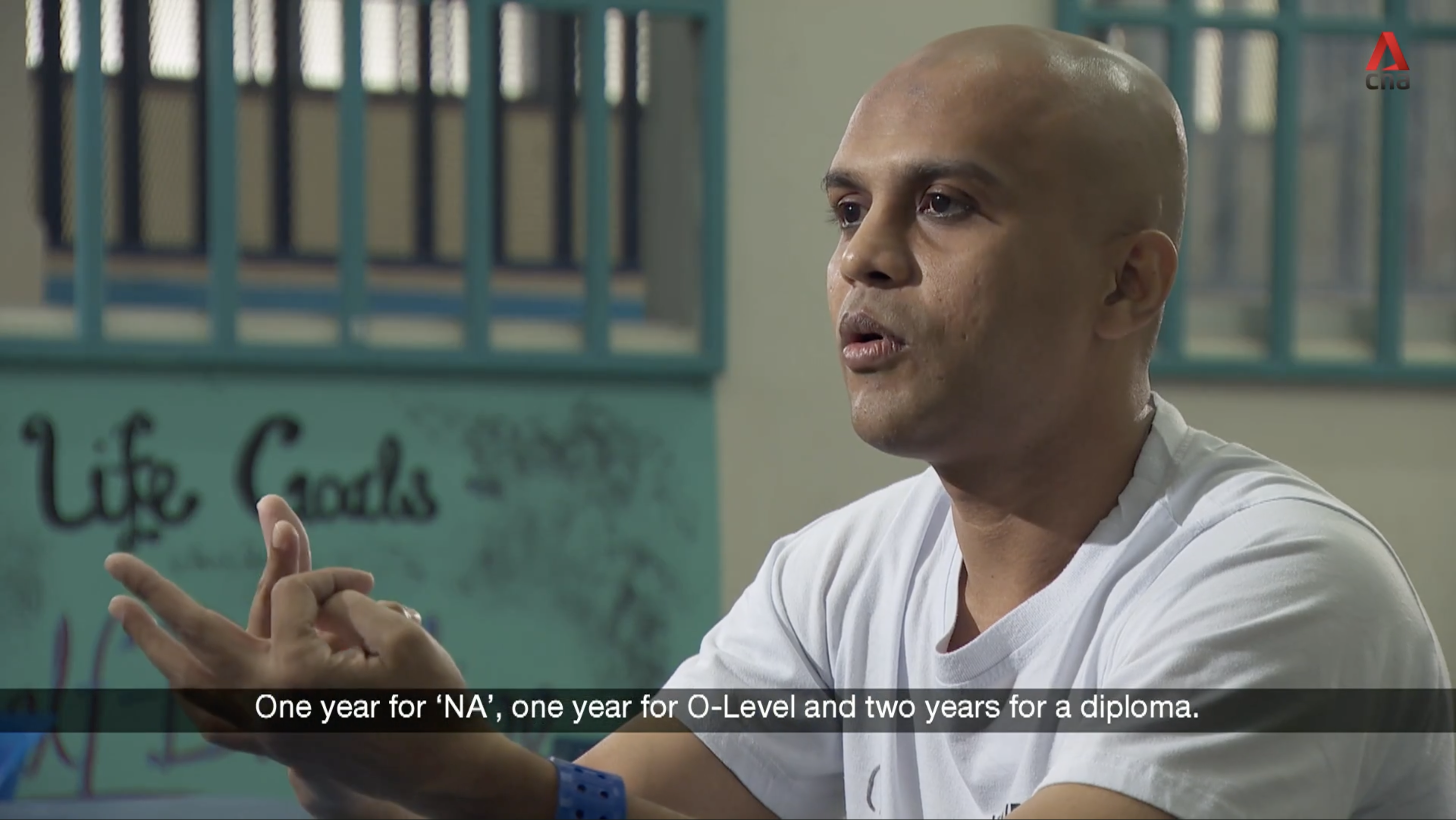 Image screenshot from CNA video.
Image screenshot from CNA video.
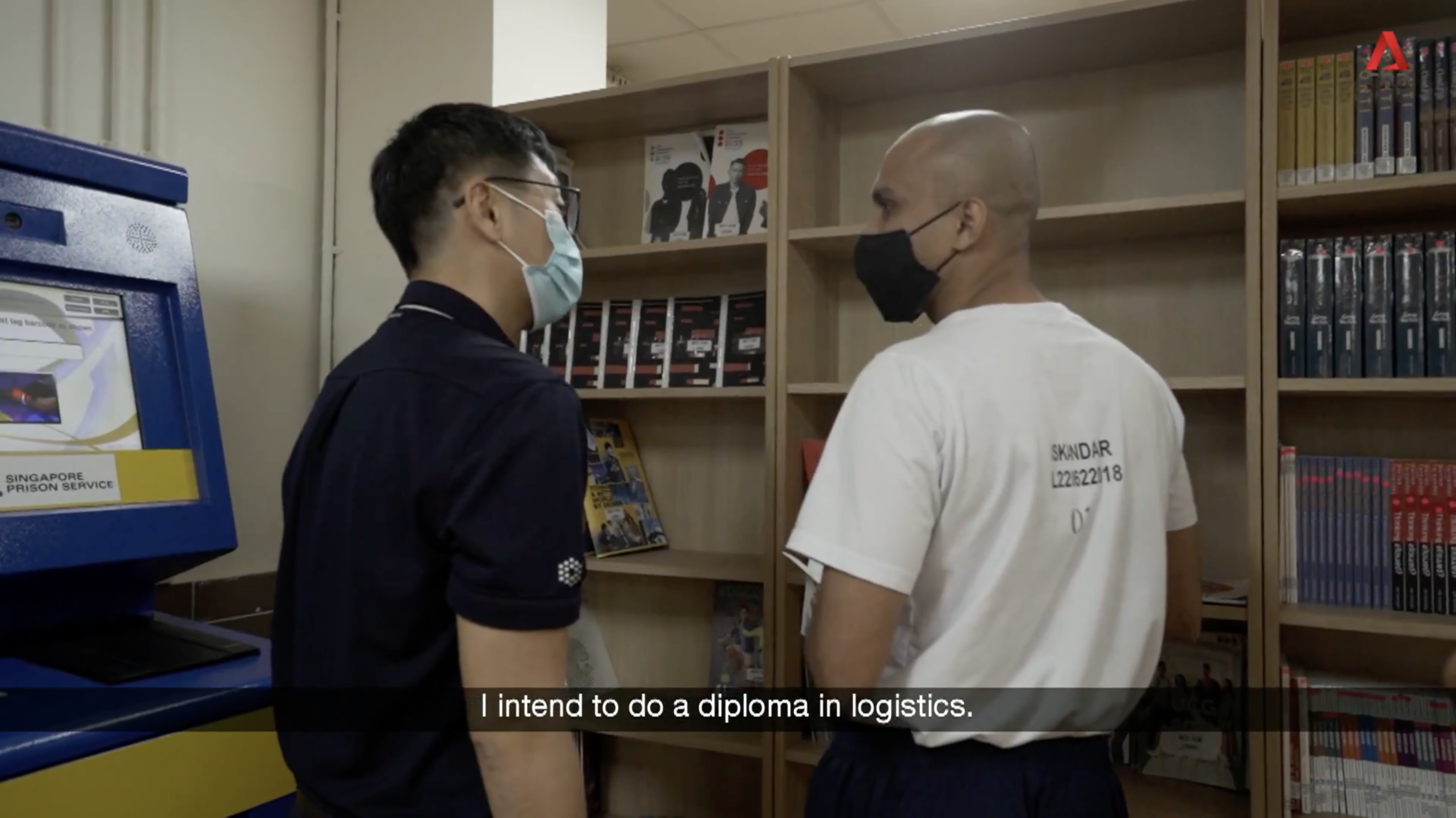 Image screenshot from CNA video.
Image screenshot from CNA video.
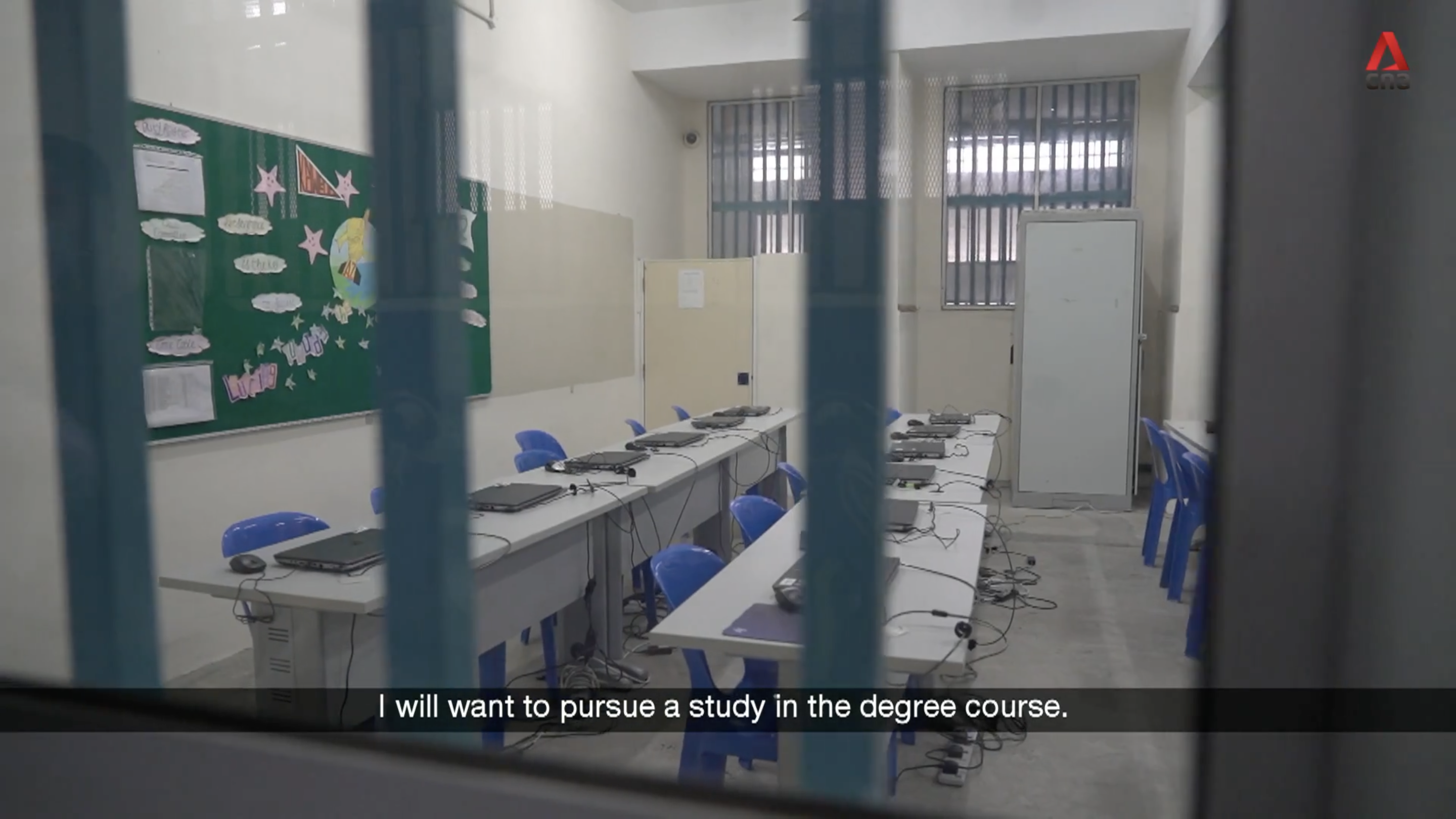 Image screenshot from CNA video.
Image screenshot from CNA video.
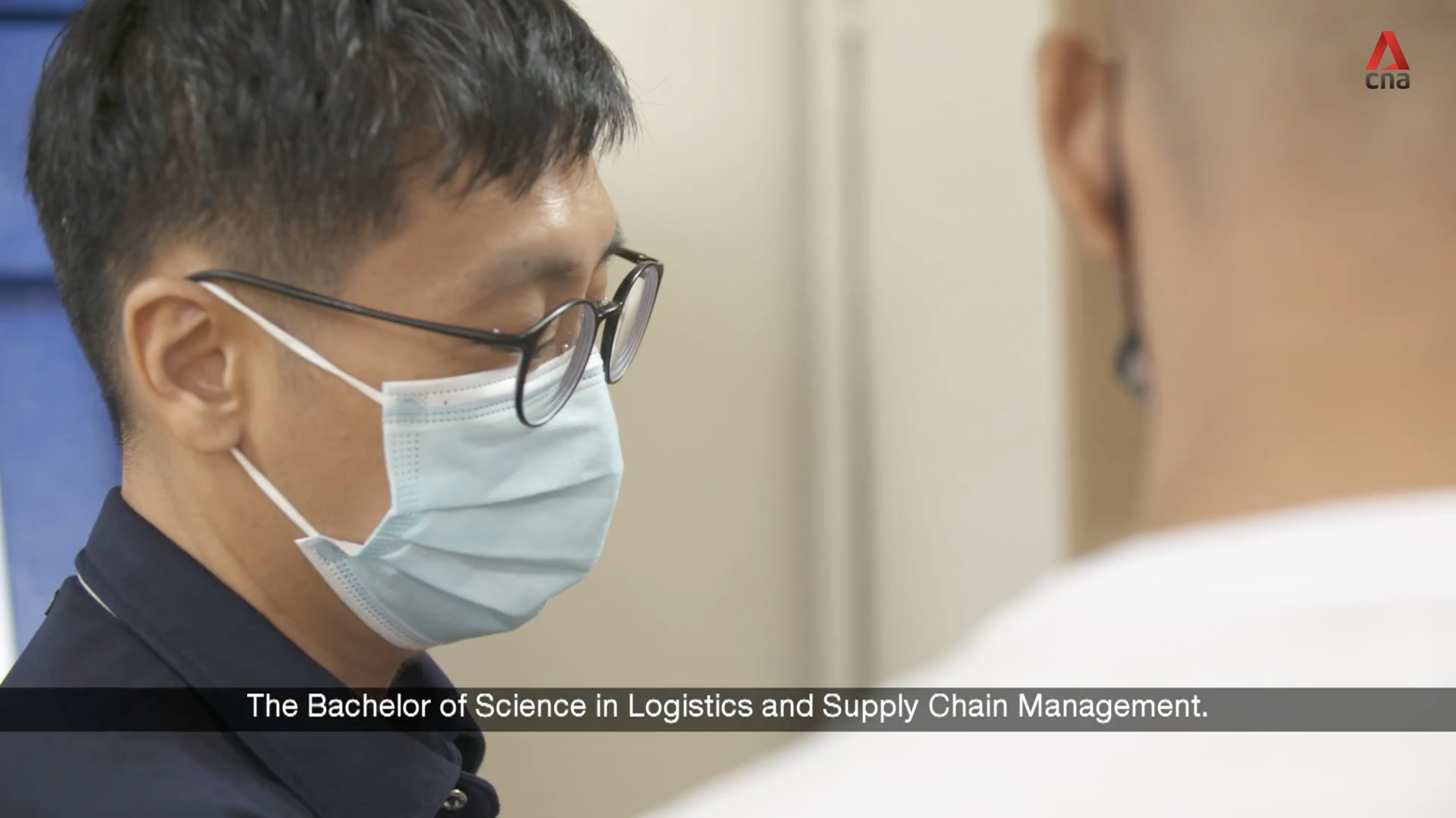 Image screenshot from CNA video.
Image screenshot from CNA video.
Another one of the reasons that spurred Iskandar to further his studies while behind bars could be because of the lack of job options mentioned by Rusdi earlier.
Having qualifications, and the certificates to boot, would help him get a better job.
Without which, he said he would have no money, be unable to survive in the real world, and revert back to his old criminal ways.
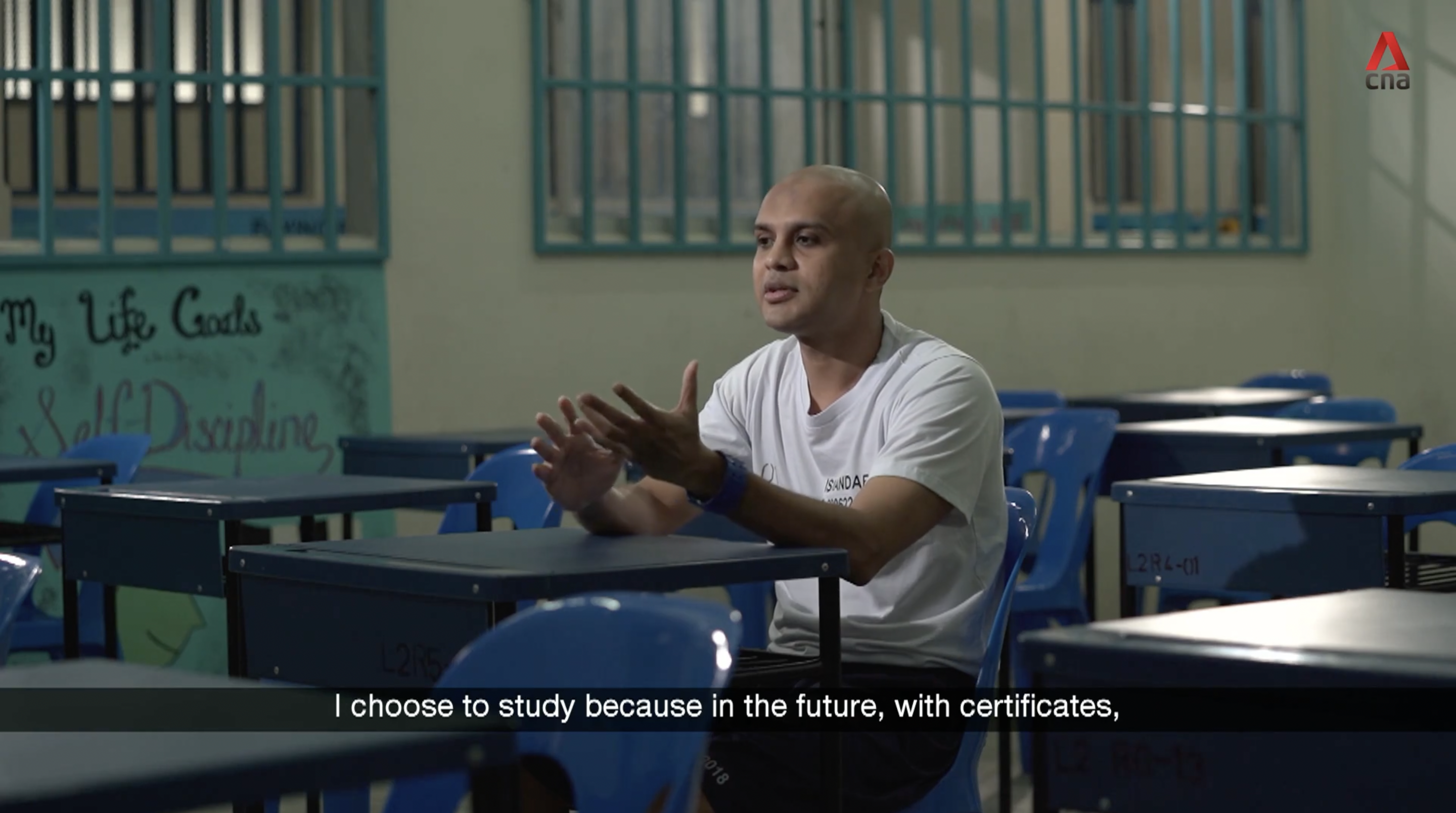 Image screenshot from CNA video.
Image screenshot from CNA video.
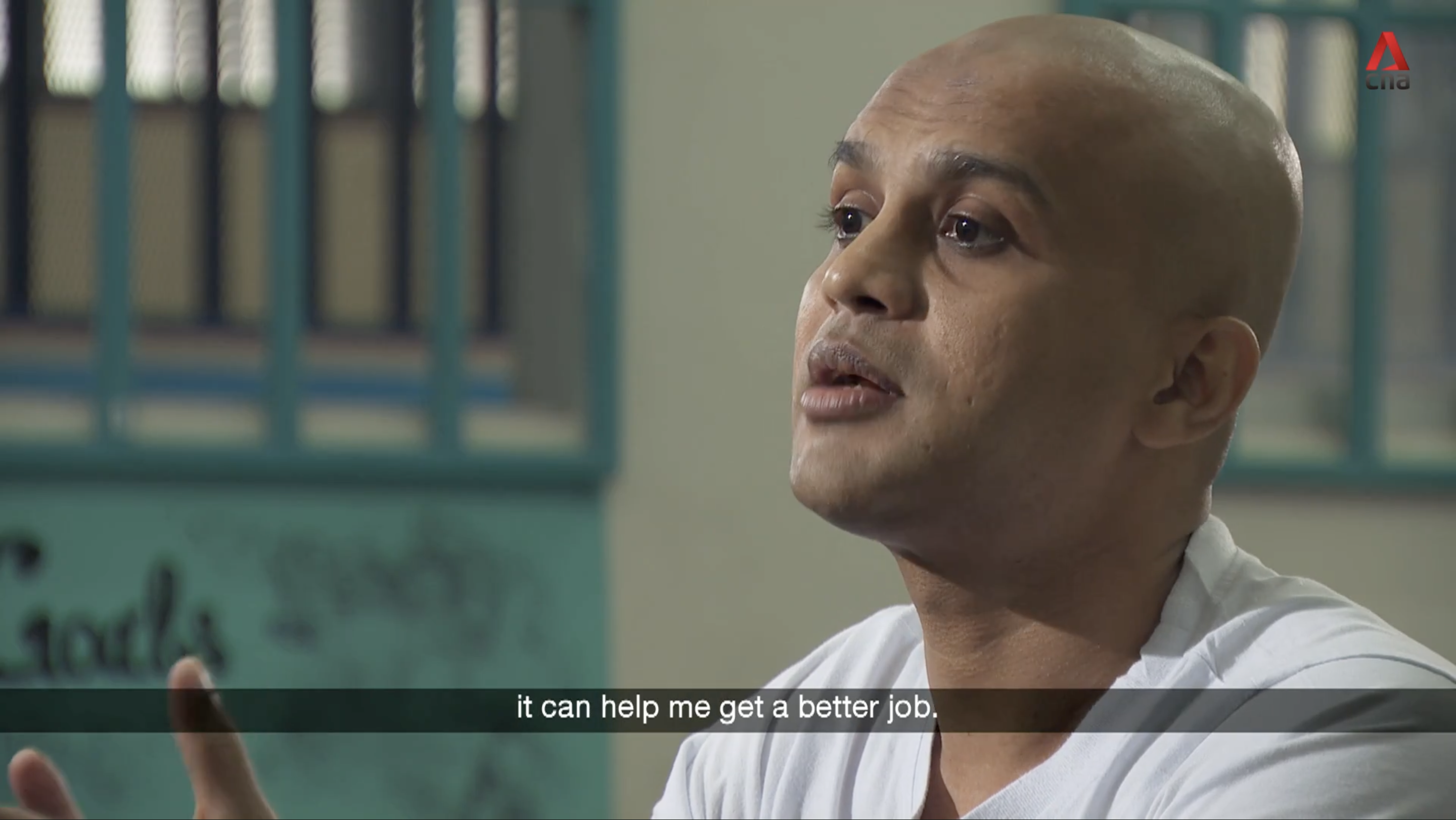 Image screenshot from CNA video.
Image screenshot from CNA video.
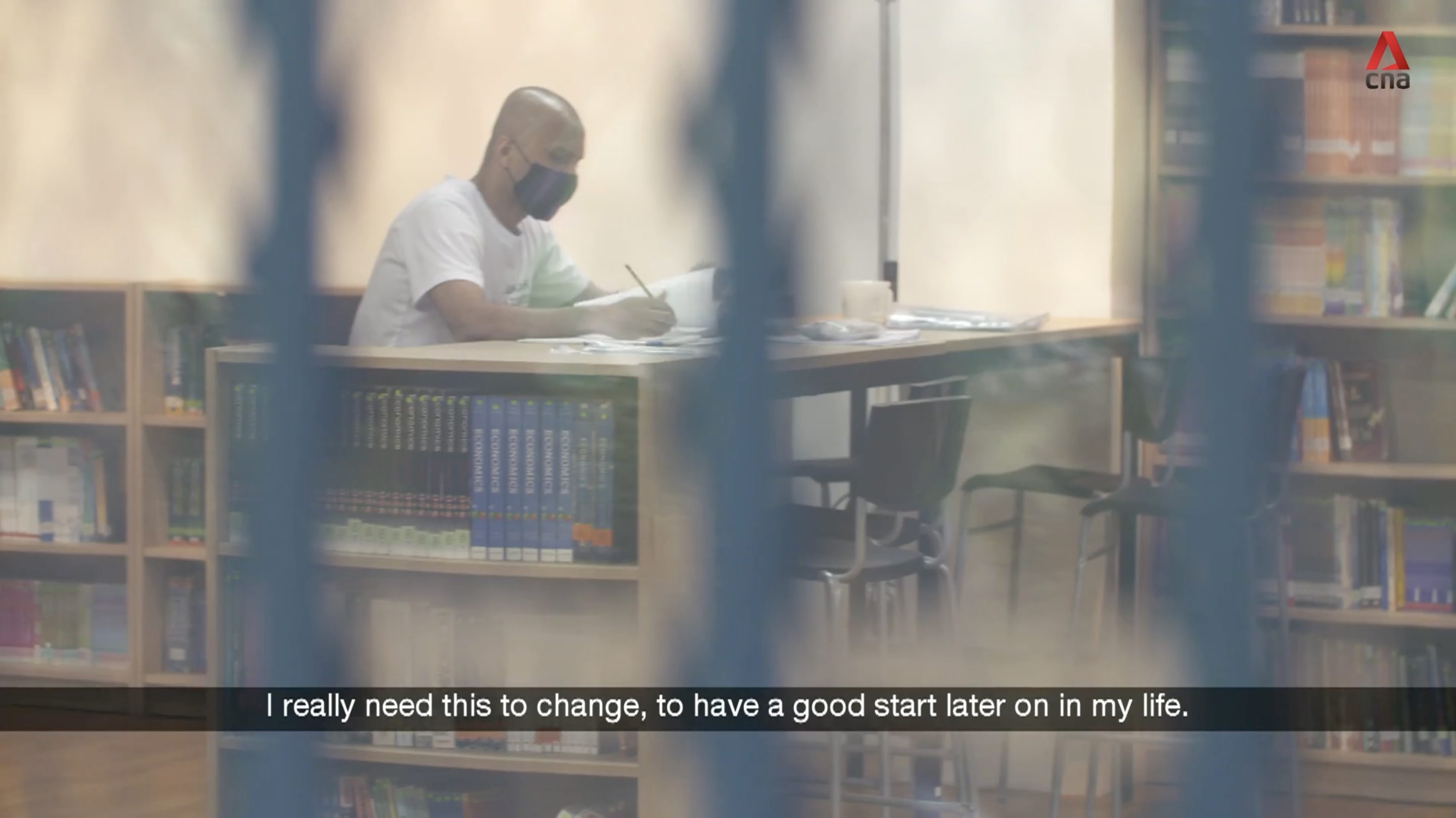 Image screenshot from CNA video.
Image screenshot from CNA video.
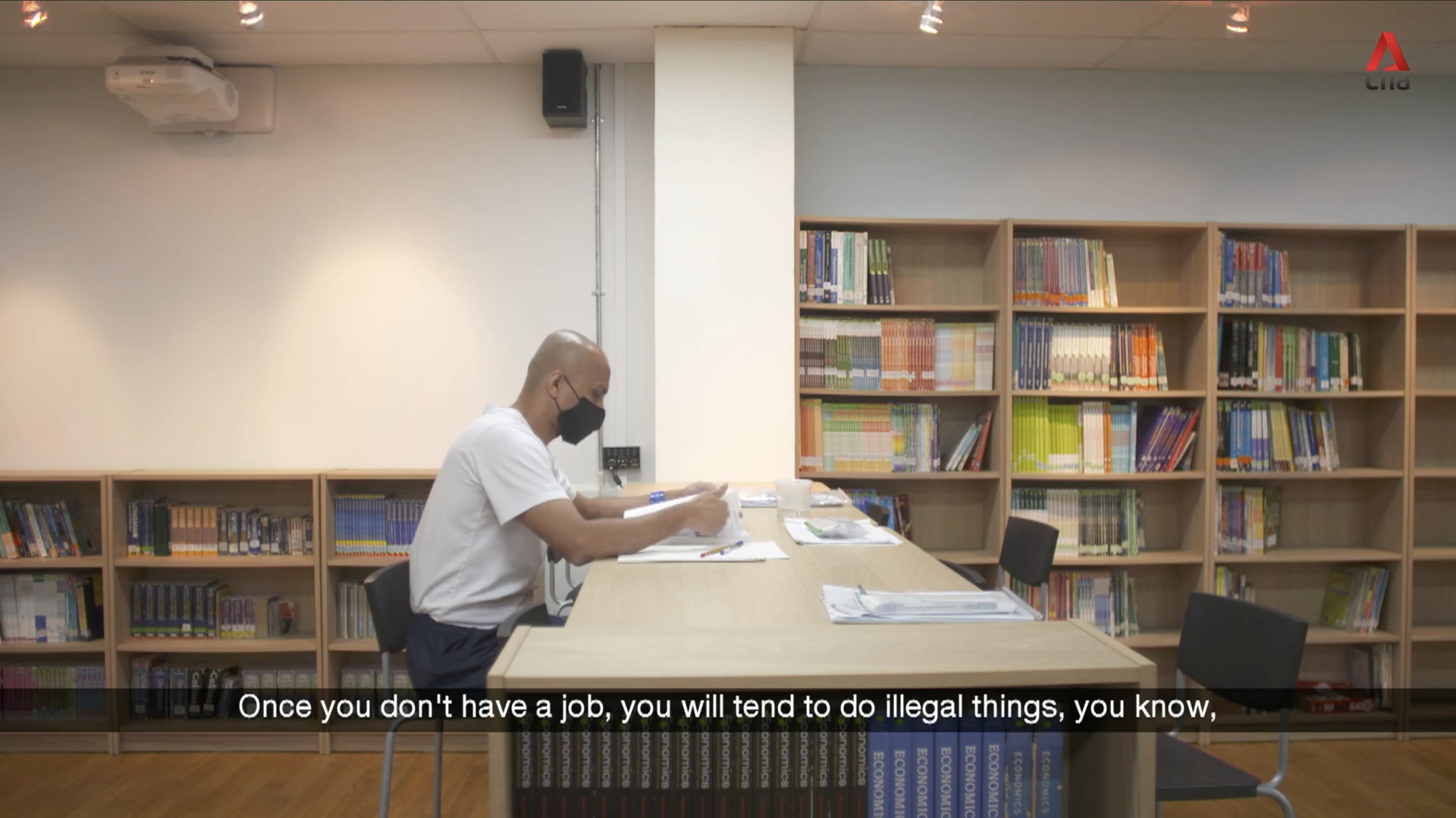 Image screenshot from CNA video.
Image screenshot from CNA video.
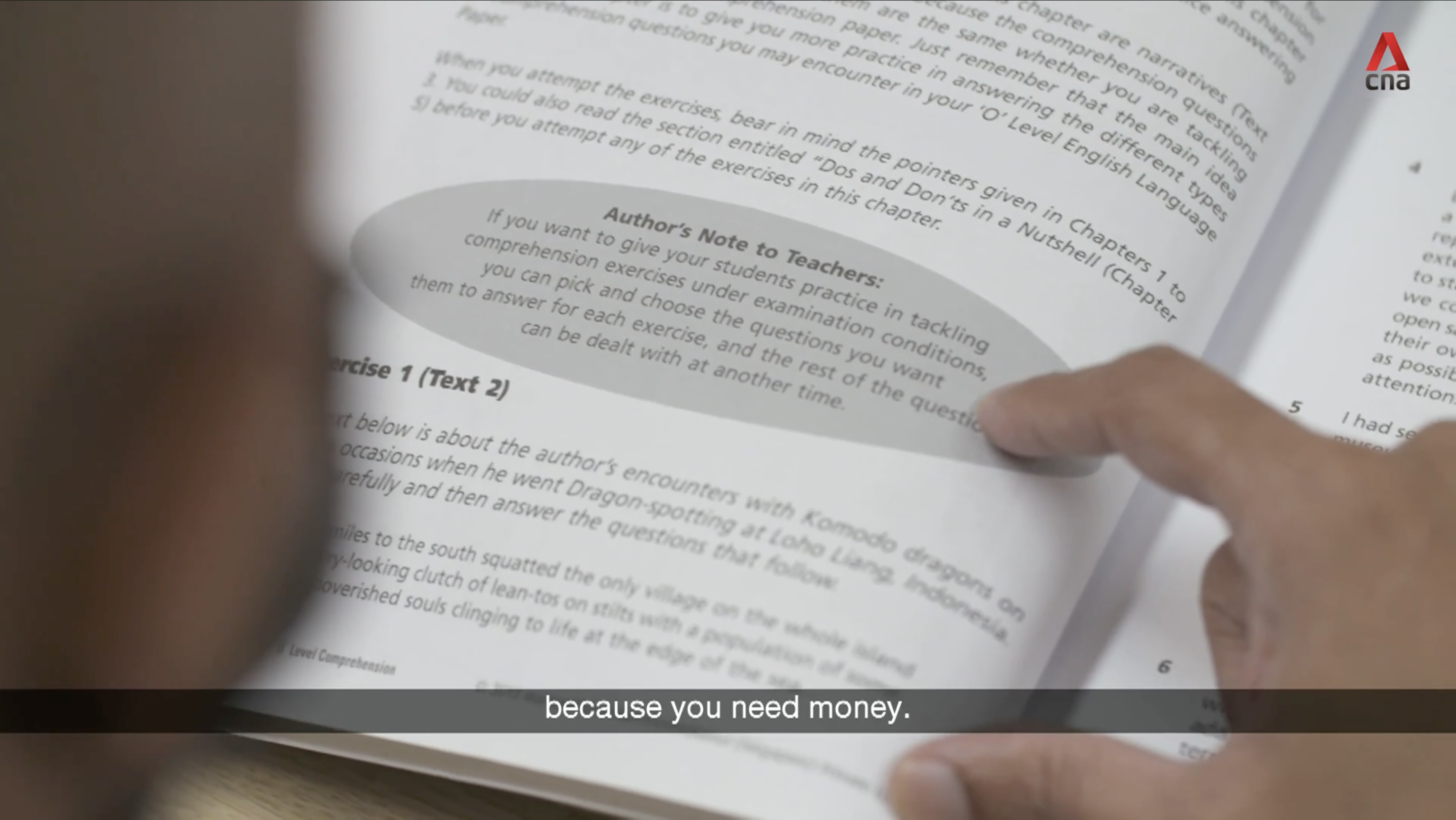 Image screenshot from CNA video.
Image screenshot from CNA video.
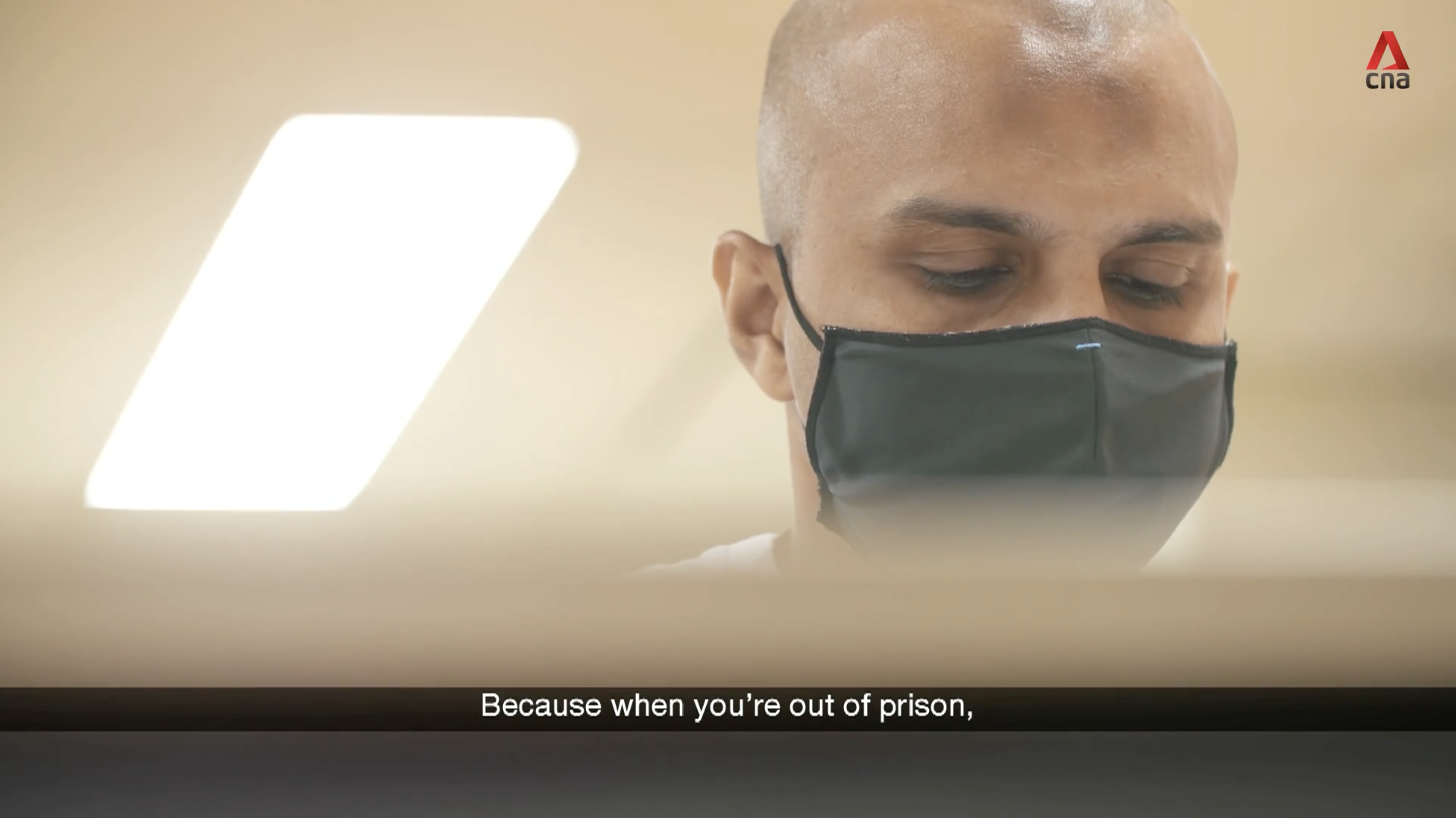 Image screenshot from CNA video.
Image screenshot from CNA video.
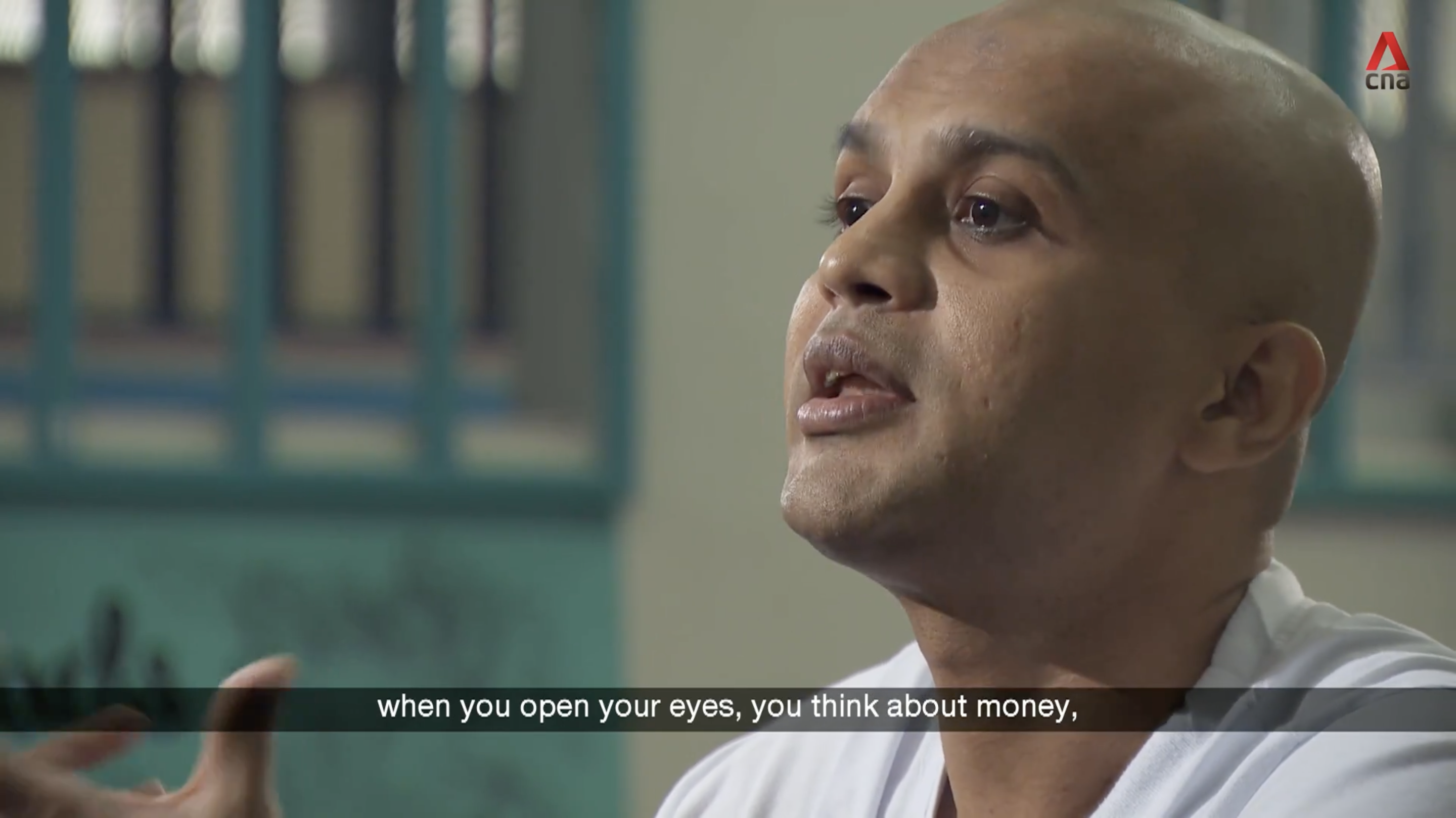 Image screenshot from CNA video.
Image screenshot from CNA video.
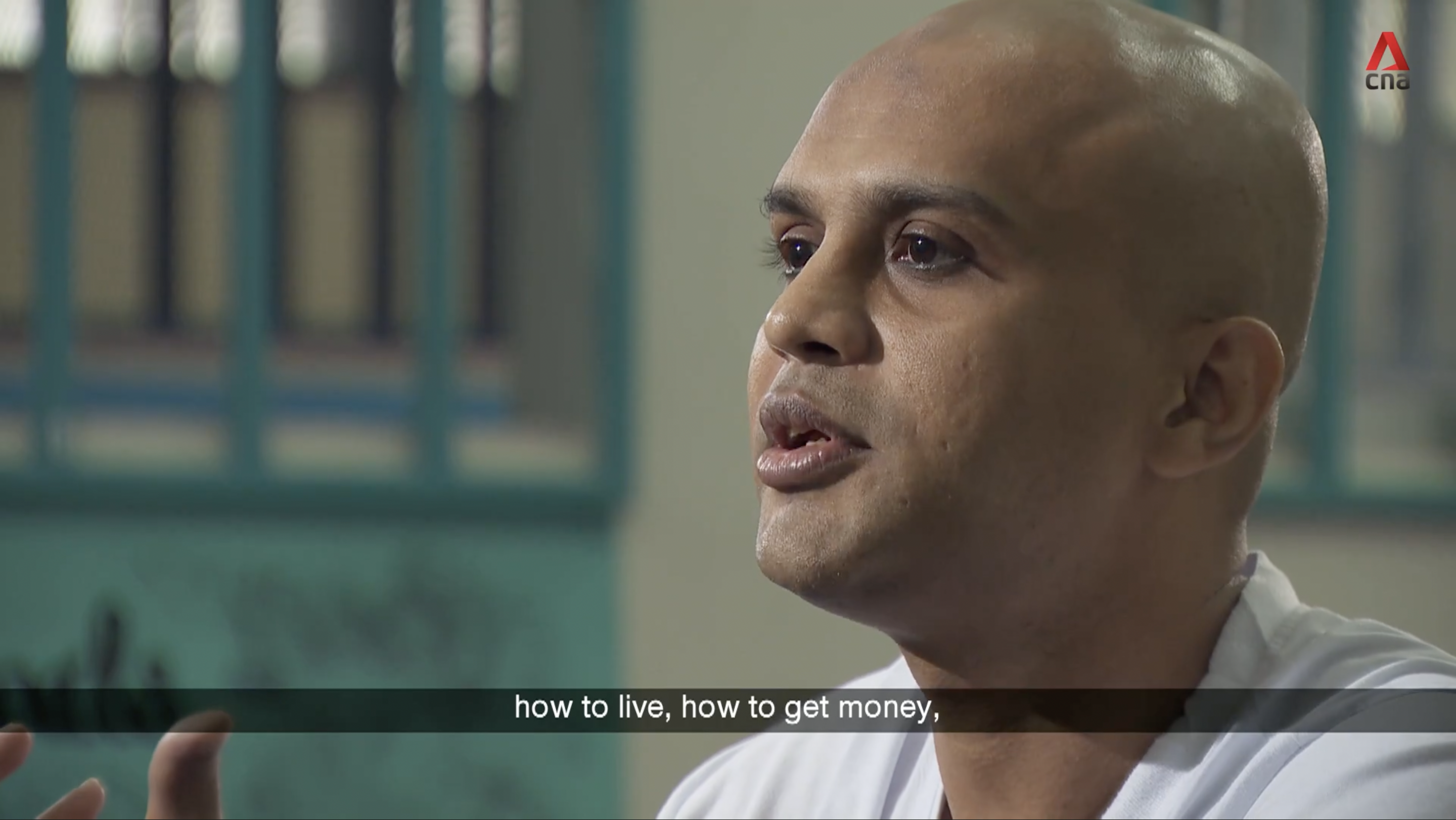 Image screenshot from CNA video.
Image screenshot from CNA video.
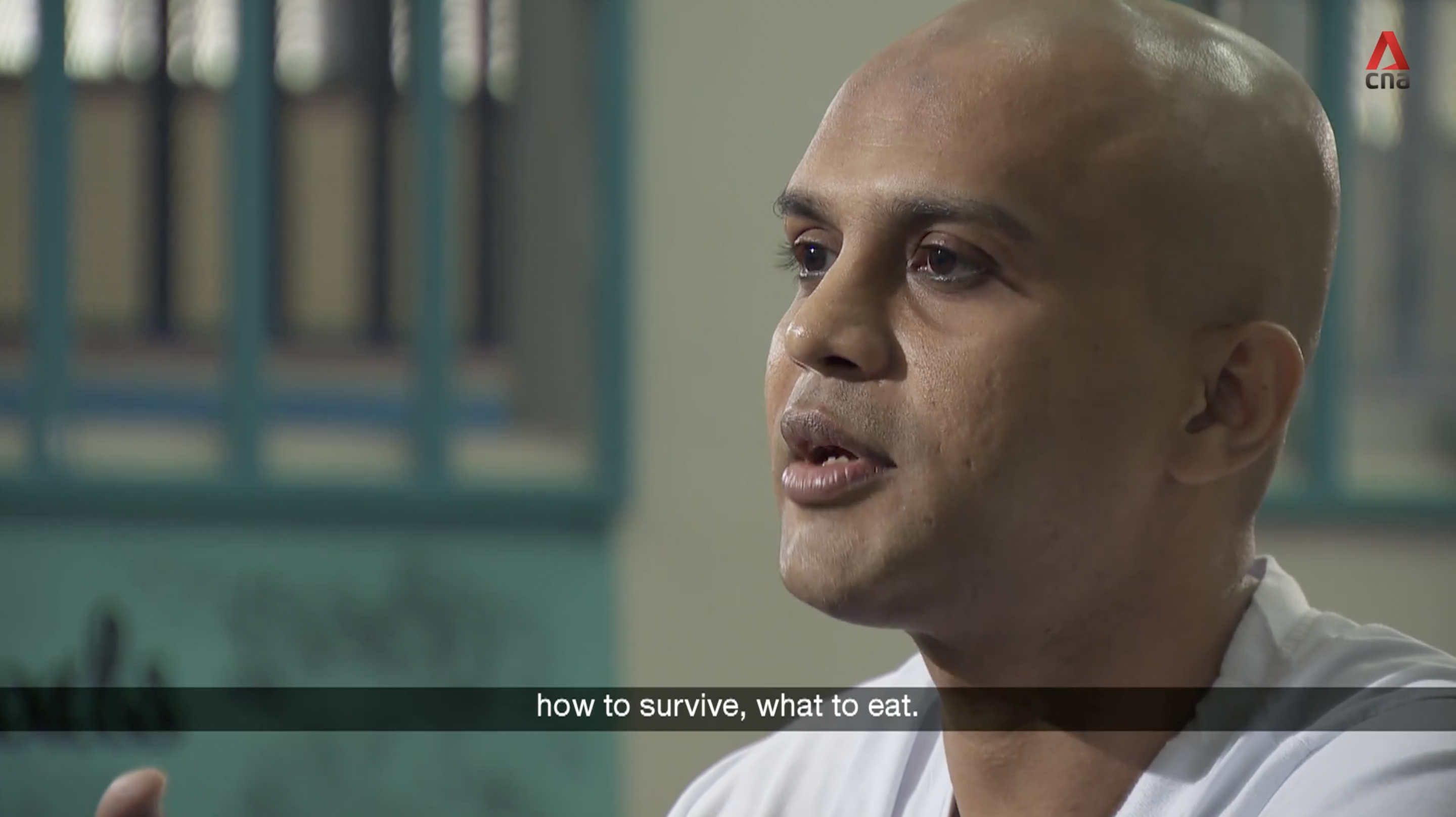 Image screenshot from CNA video.
Image screenshot from CNA video.
Take one year to complete four to five-year curriculum
With just 10 years left in his sentence, one might wonder how Iskandar is able to complete an academic regiment that would typically take 12 years to complete.
This is because the four to five-year secondary school curriculum is condensed into one year, as revealed by CNA, and the fast tracked education system allows more inmates to benefit from the education within prisons.
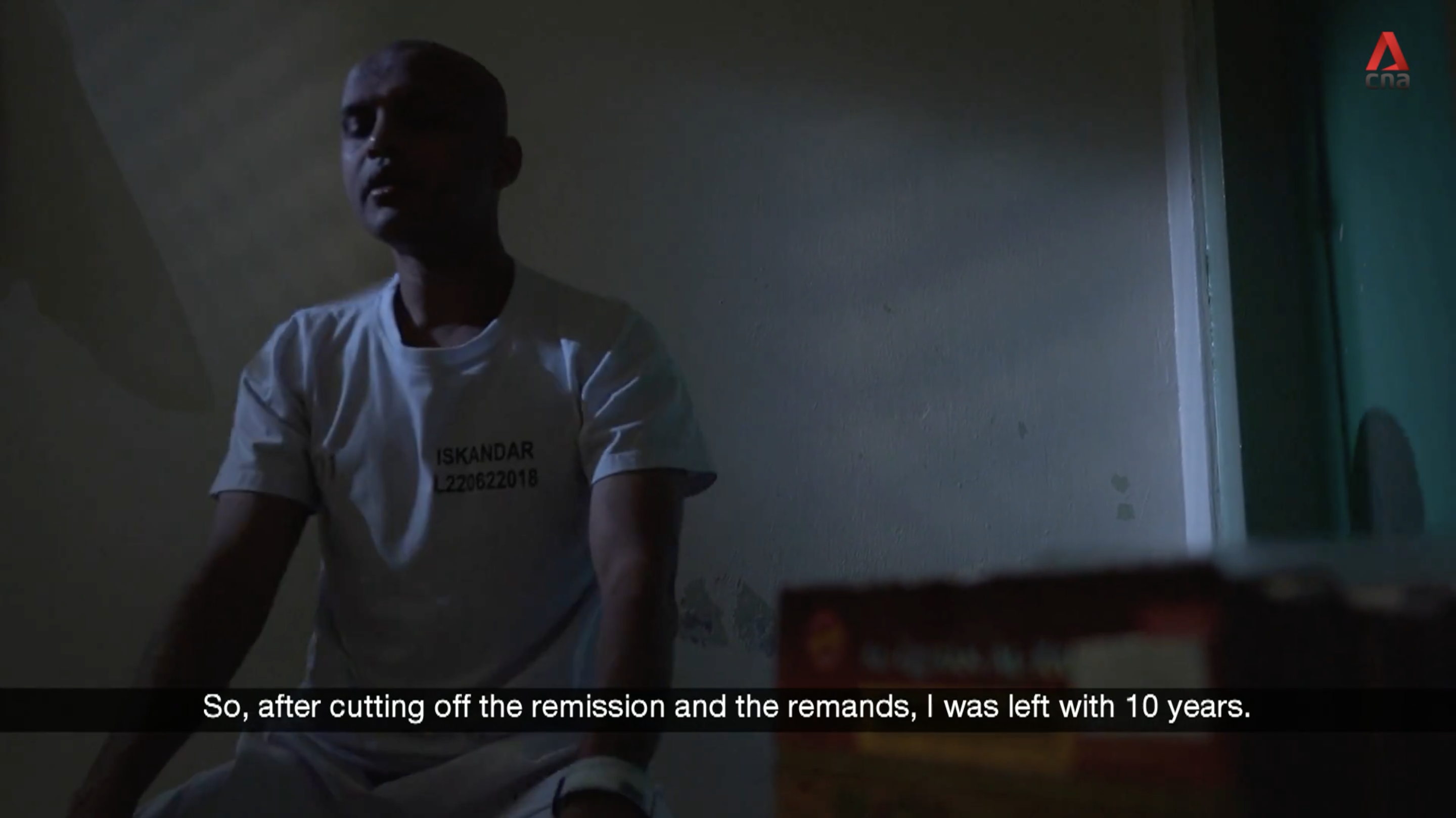 Image screenshot from CNA video.
Image screenshot from CNA video.
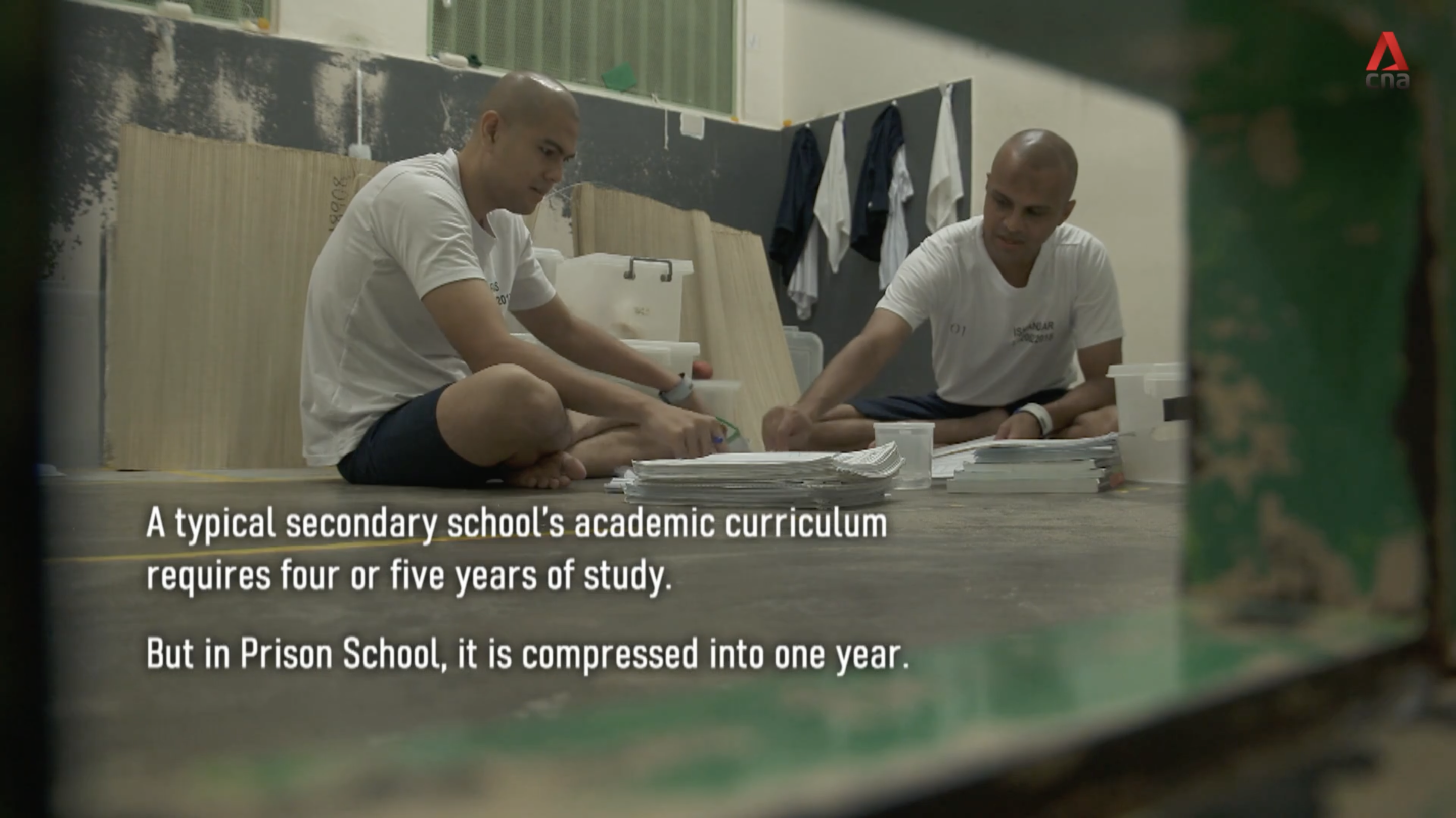 Image screenshot from CNA video.
Image screenshot from CNA video.
 Image screenshot from CNA video.
Image screenshot from CNA video.
Hectic routine for prison school
From staying on top of their coursework to completing their daily assignments, inmates in prison school spend a lot of time studying and are very busy.
Take Iskandar, for instance, who wakes up at 4am, starts his day at 4:30am, goes for class at 8am, starts his revision at 8:25pm and only prepares for bed at 9:45pm, rinse and repeat.
Lights go on at 4:45am at prison school, which is a lot earlier compared to the 7am at the maximum security security institution.
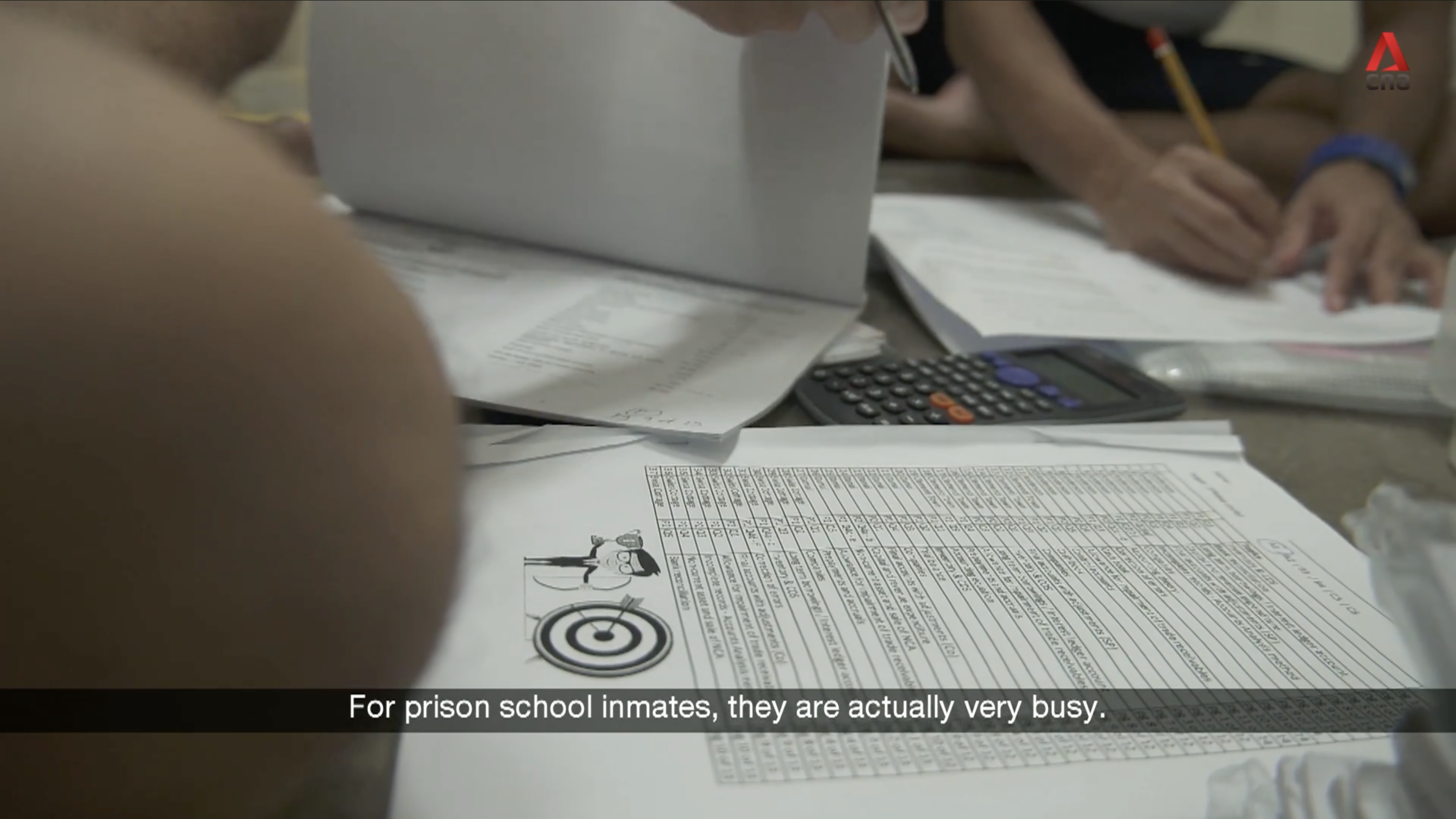 Image screenshot from CNA video.
Image screenshot from CNA video.
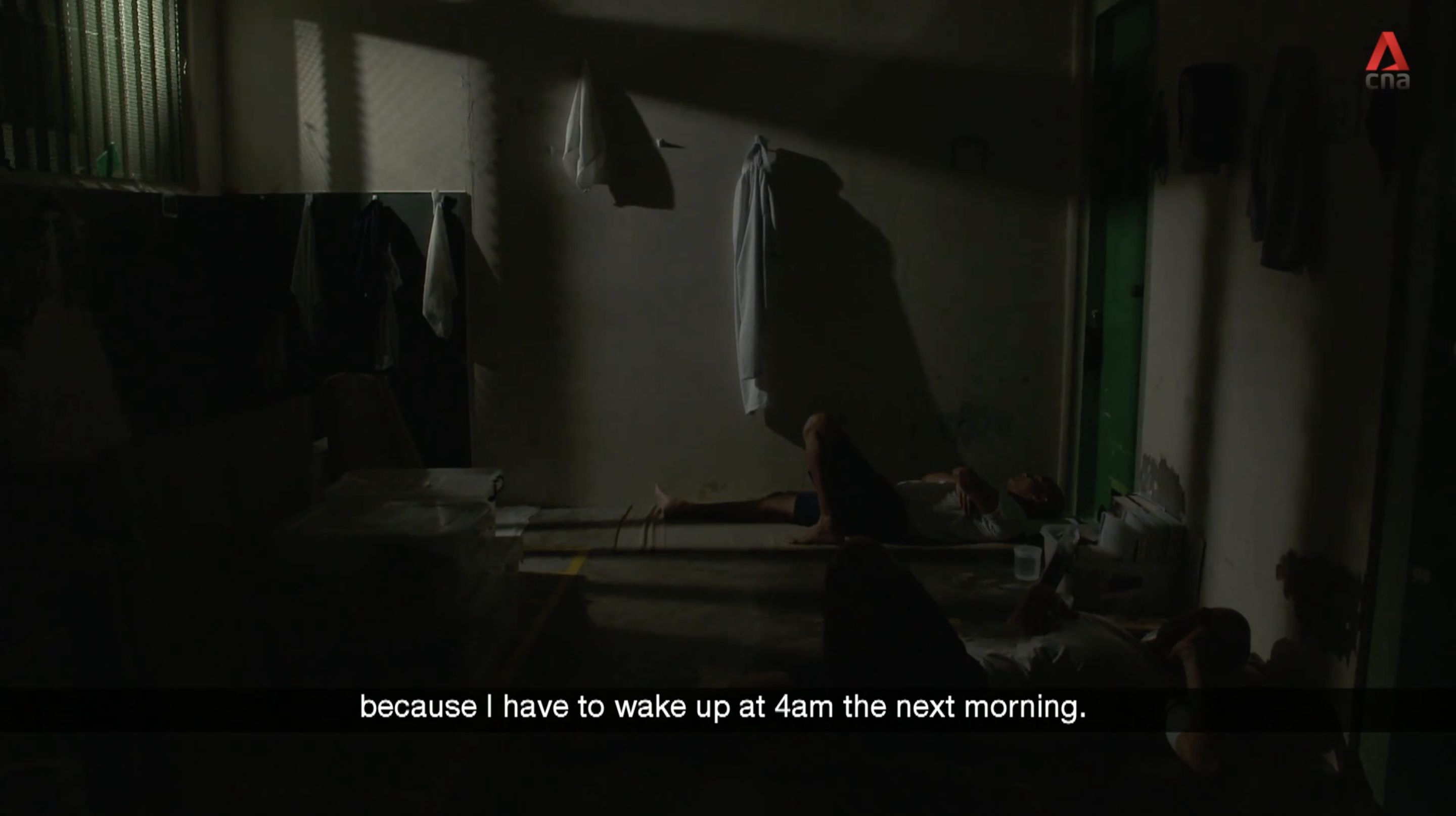 Image screenshot from CNA video.
Image screenshot from CNA video.
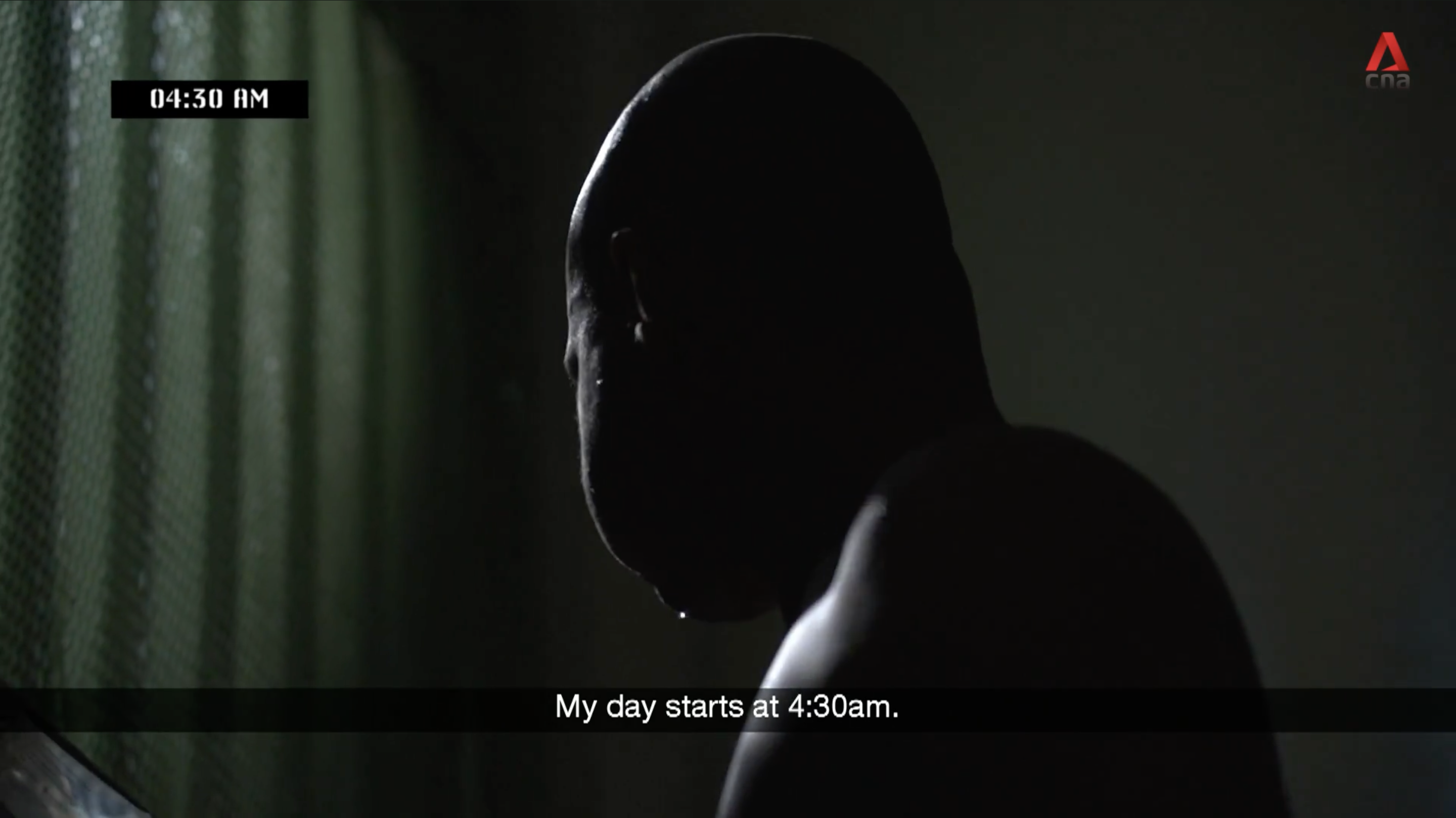 Image screenshot from CNA video.
Image screenshot from CNA video.
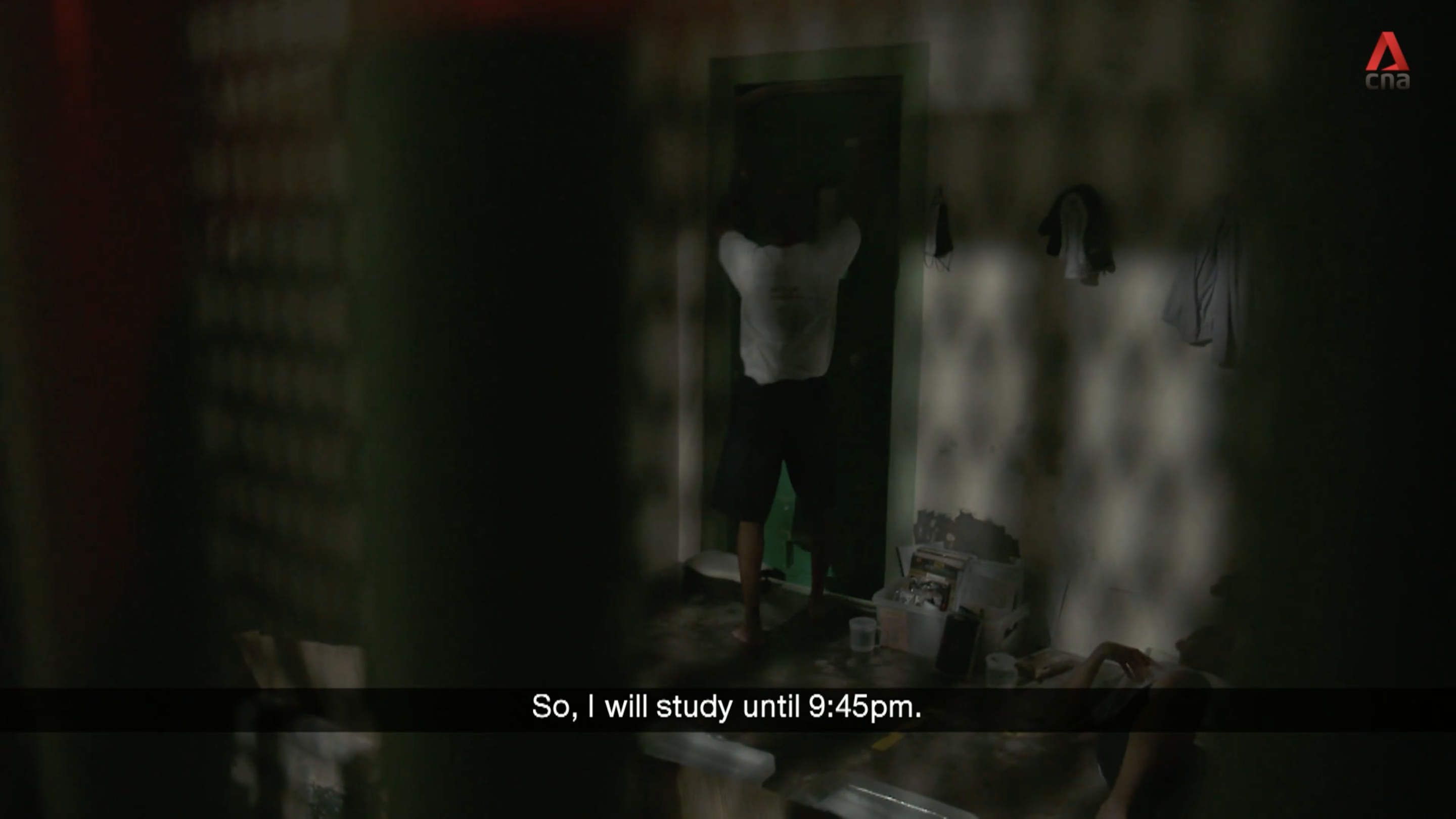 Image screenshot from CNA video.
Image screenshot from CNA video.
As packed as his schedule looks, Iskandar said this helps keep inmates preoccupied and time passes really quickly in prison.
In fact, some inmates even go through thick worksheets at such a ferocious pace that they request for extra.
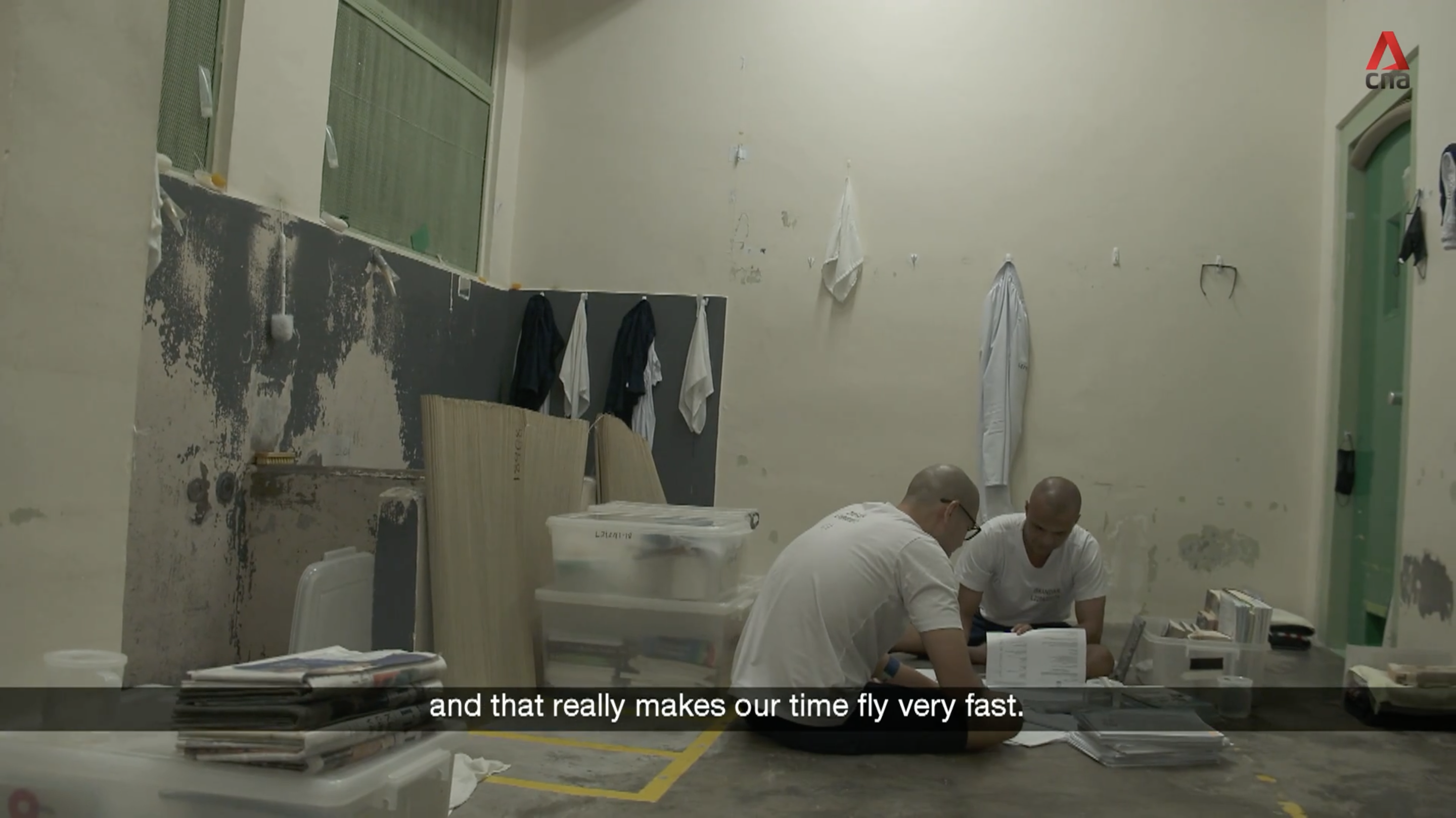 Image screenshot from CNA video.
Image screenshot from CNA video.
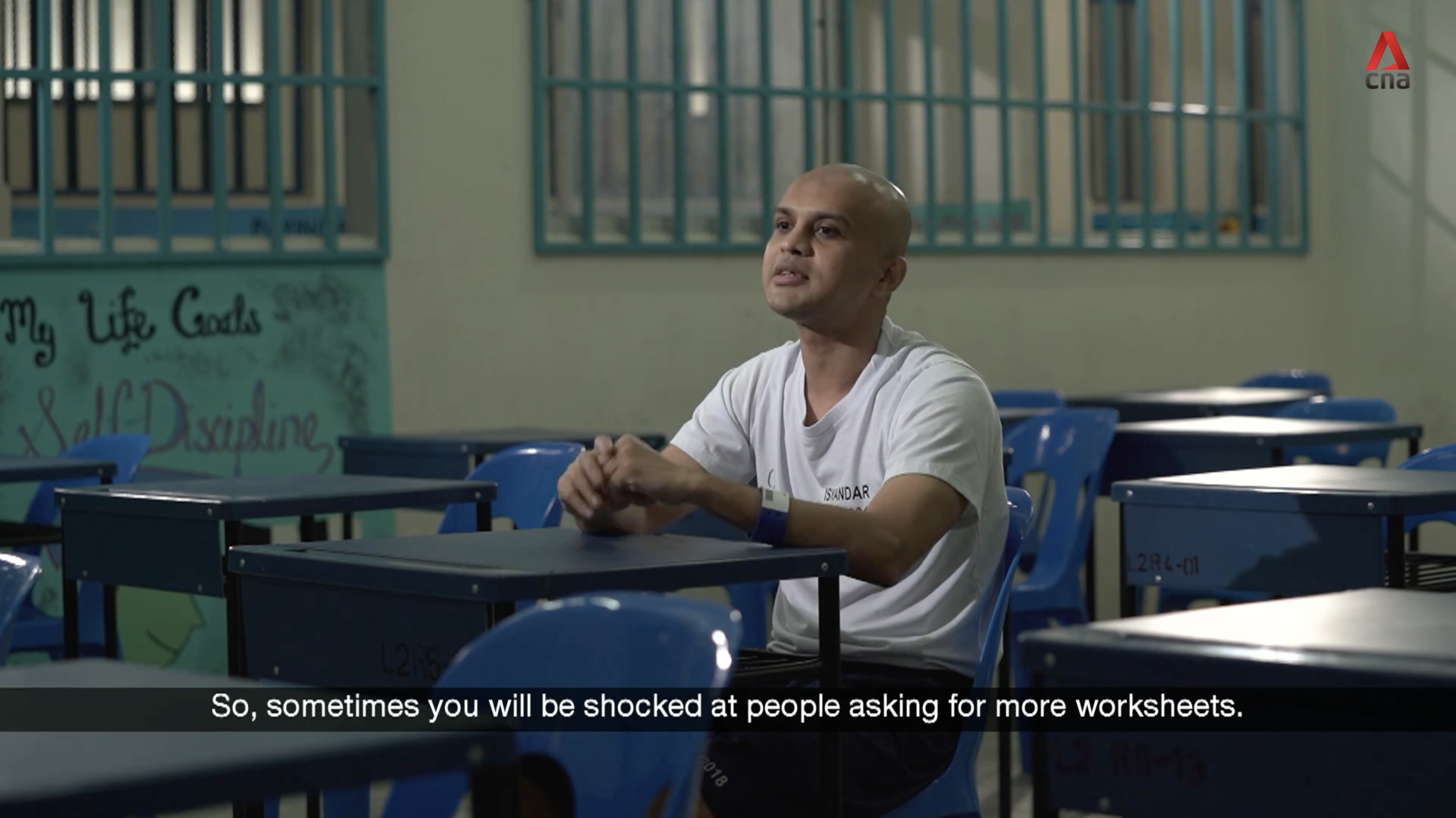 Image screenshot from CNA video.
Image screenshot from CNA video.
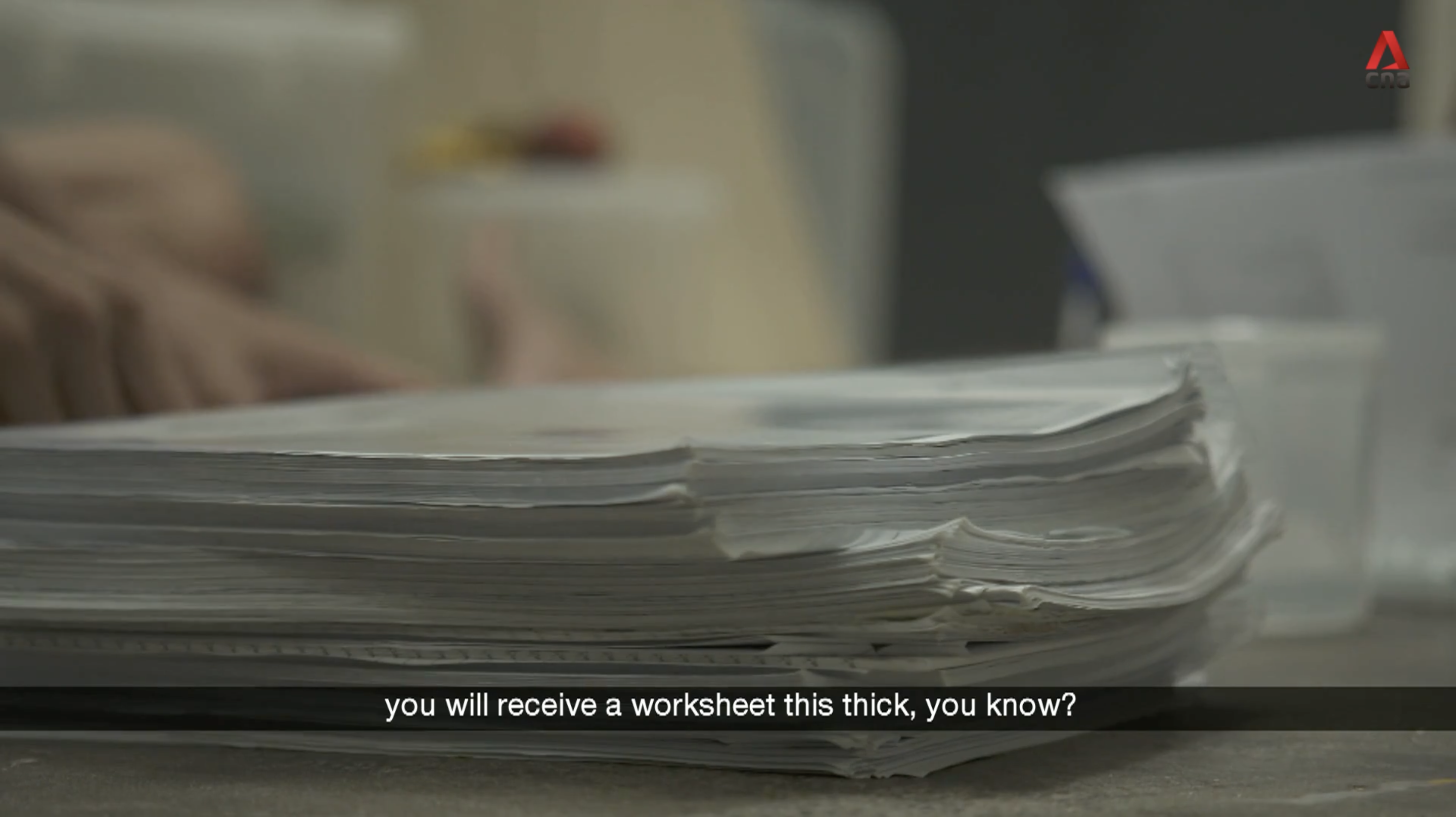 Image screenshot from CNA video.
Image screenshot from CNA video.
Discomforts when studying in prison
This is also despite the discomfort that prison school inmates have to go through during their studies.
Similar to the cells in the maximum security institution, the cells in prison school are spartan.
Inmates will just have to make do with studying while sitting on the cold and hard floor as there is no chair and table.
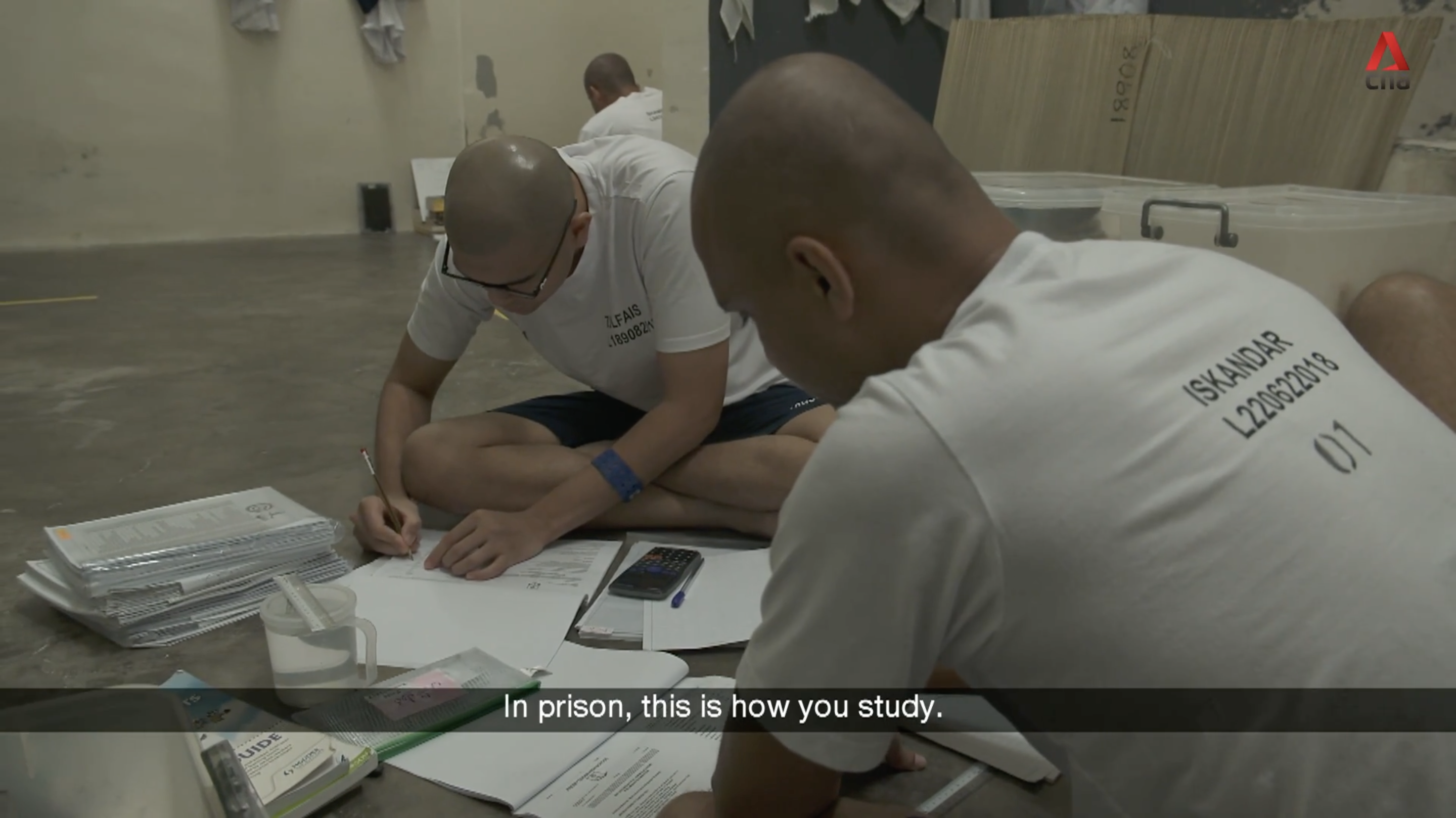 Image screenshot from CNA video.
Image screenshot from CNA video.
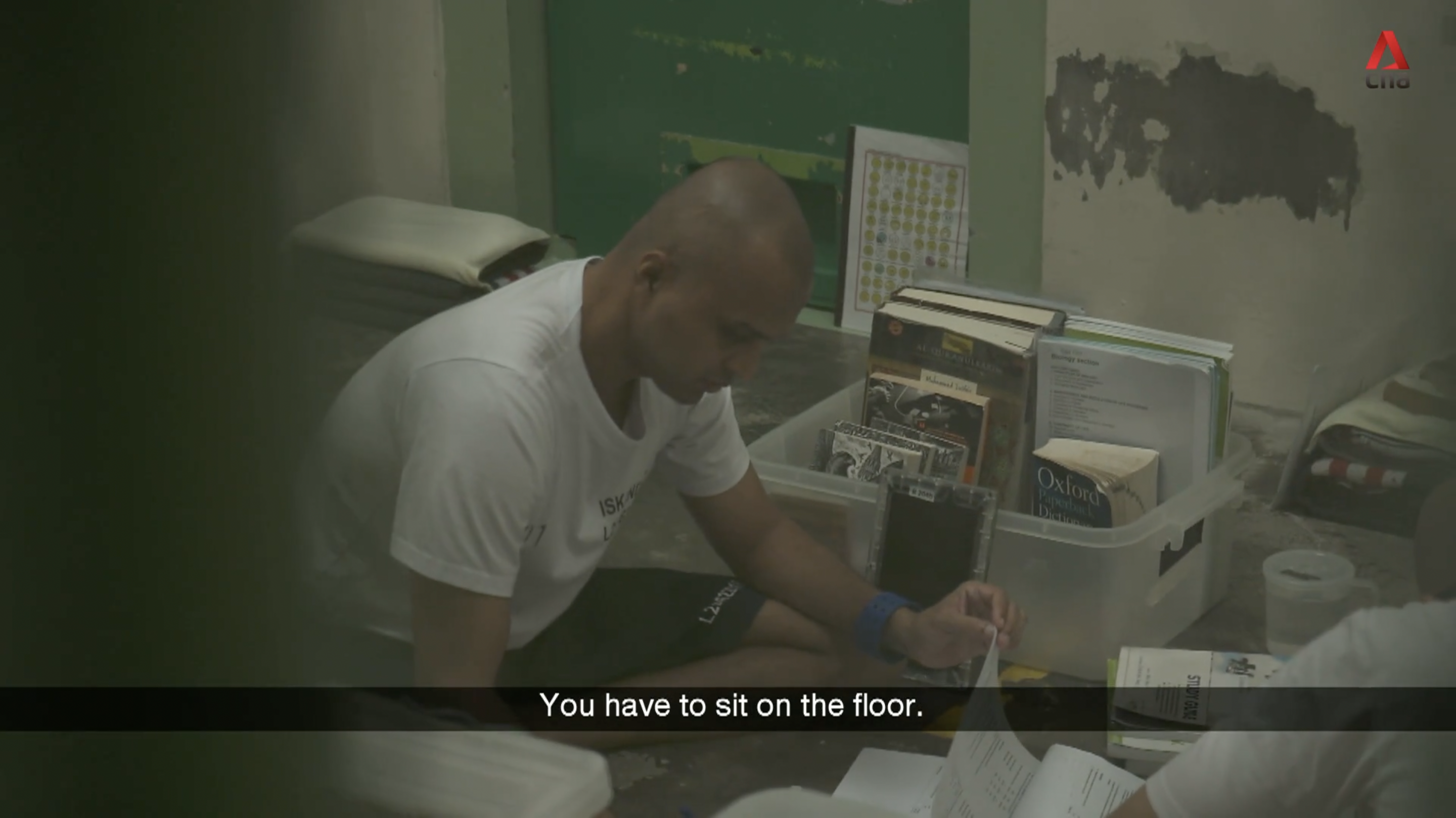 Image screenshot from CNA video.
Image screenshot from CNA video.
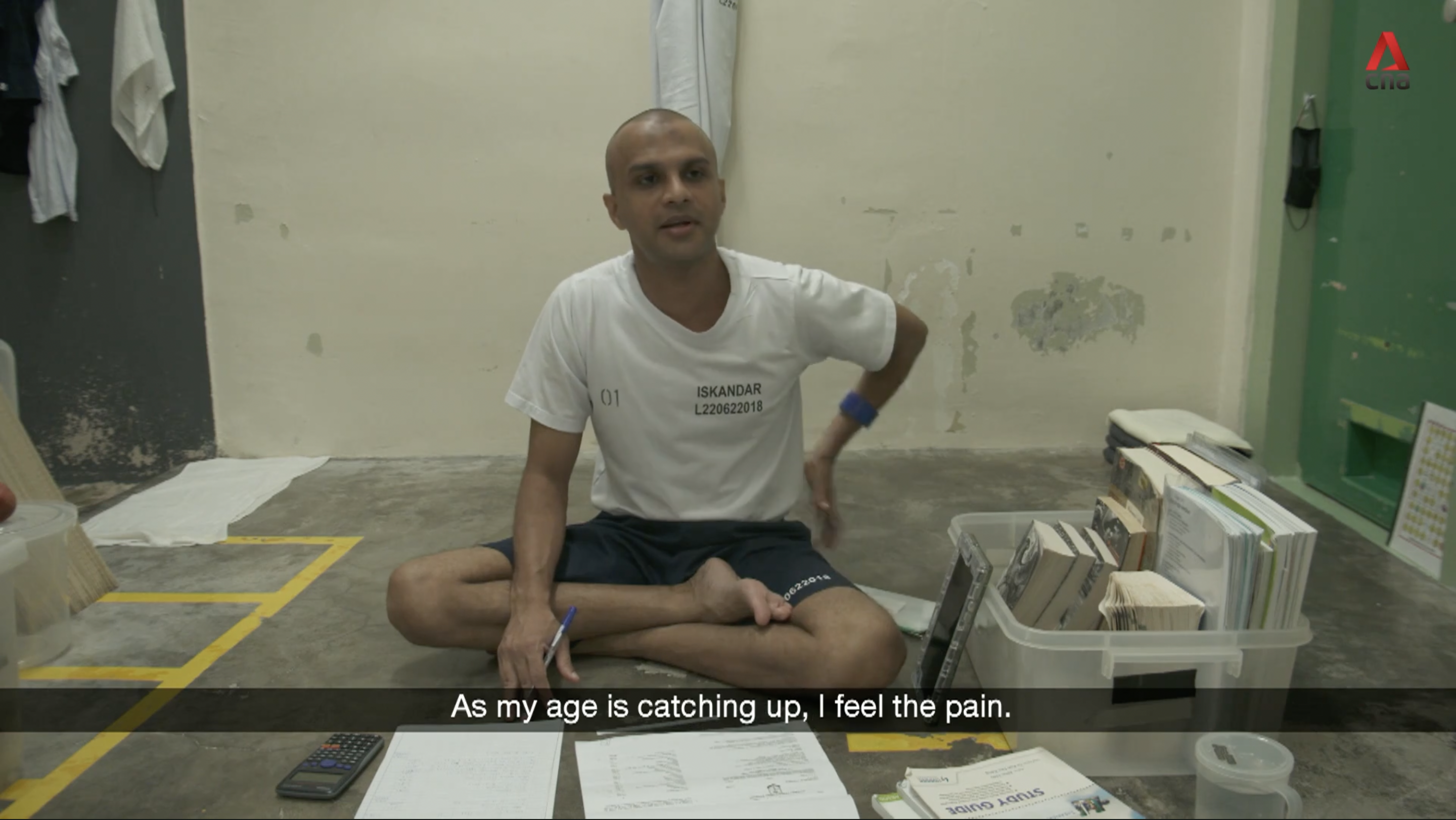 Image screenshot from CNA video.
Image screenshot from CNA video.
Like the inmates at the maximum security institution, prison school inmates are allowed to have yard time twice a week, albeit compressed to fit within their tight schedule.
Unlike the two-hour yard time at the maximum security institution, however, prison school inmates only have one hour and 15 minutes of precious time to take a break from their intense schedule.
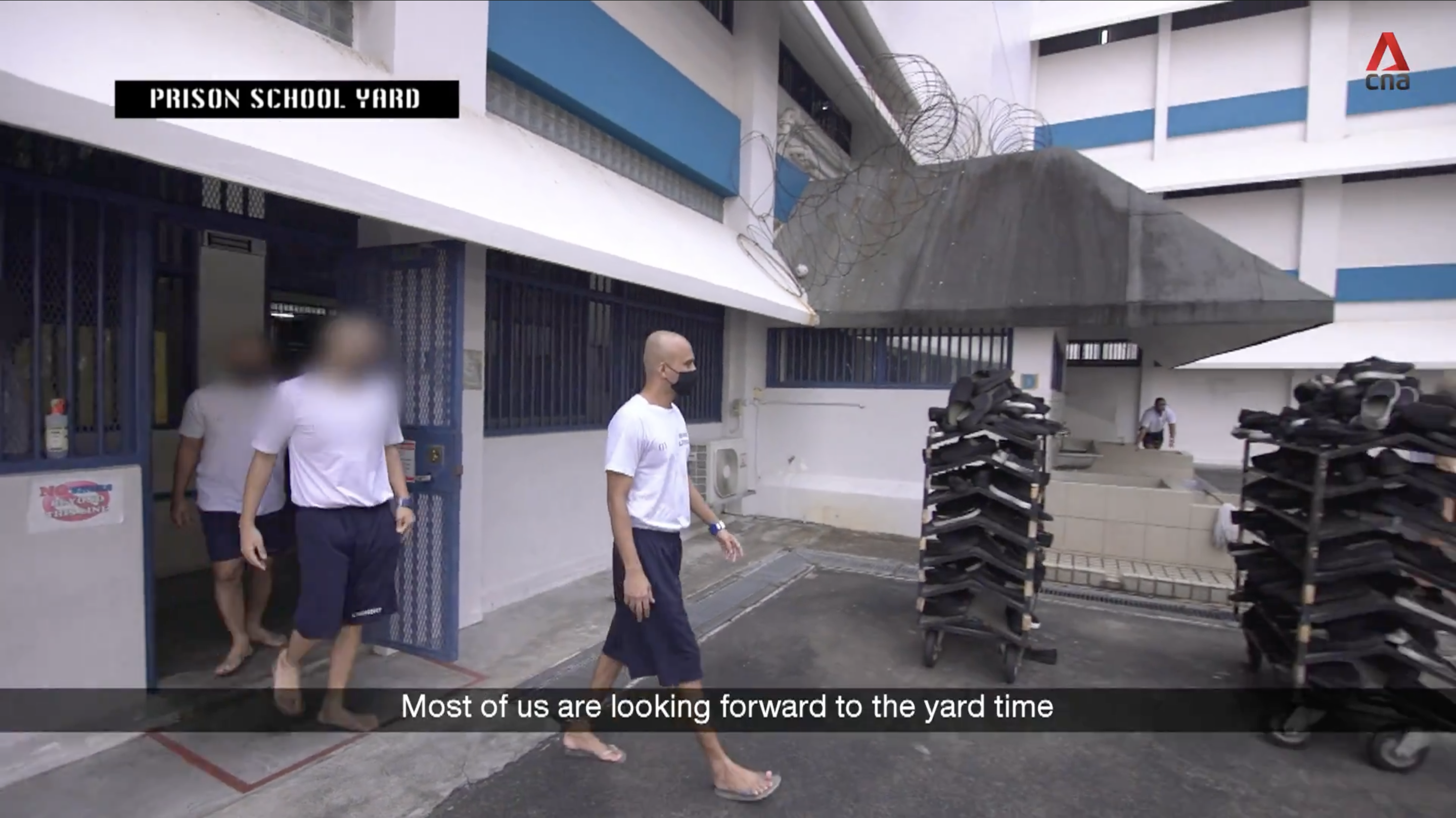 Image screenshot from CNA video.
Image screenshot from CNA video.
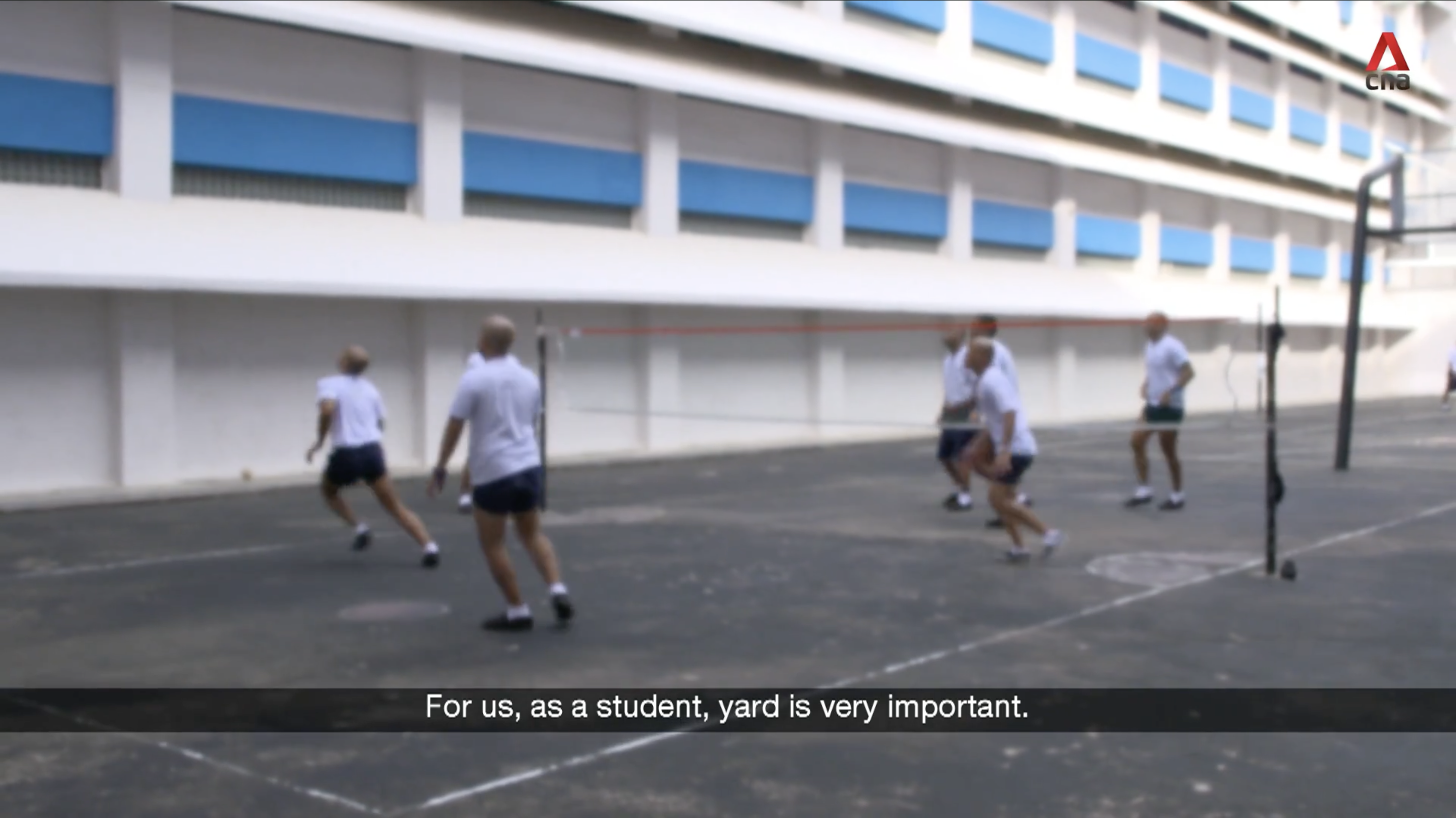 Image screenshot from CNA video.
Image screenshot from CNA video.
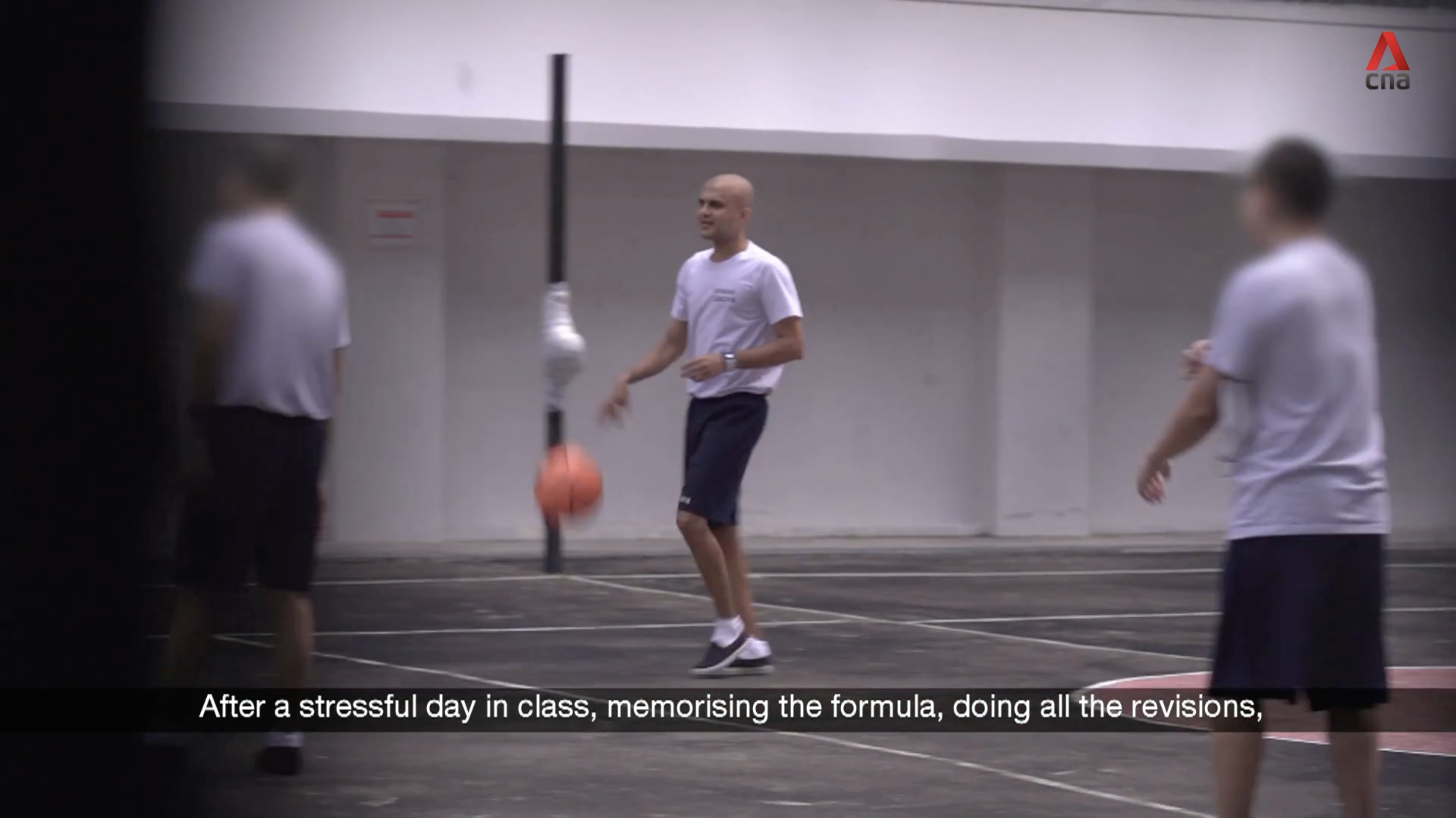 Image screenshot from CNA video.
Image screenshot from CNA video.
 Image screenshot from CNA video.
Image screenshot from CNA video.
Dealing with trauma
Beyond the hurdles that inmates might run into outside of prison, which could lead to recidivism, some of the difficulties stem from within them, as well as those around them.
Khai, for instance, had a rough childhood and experienced violence firsthand.
He recounted seeing his late father hit his mother with the mop's wooden handle when he was three years old.
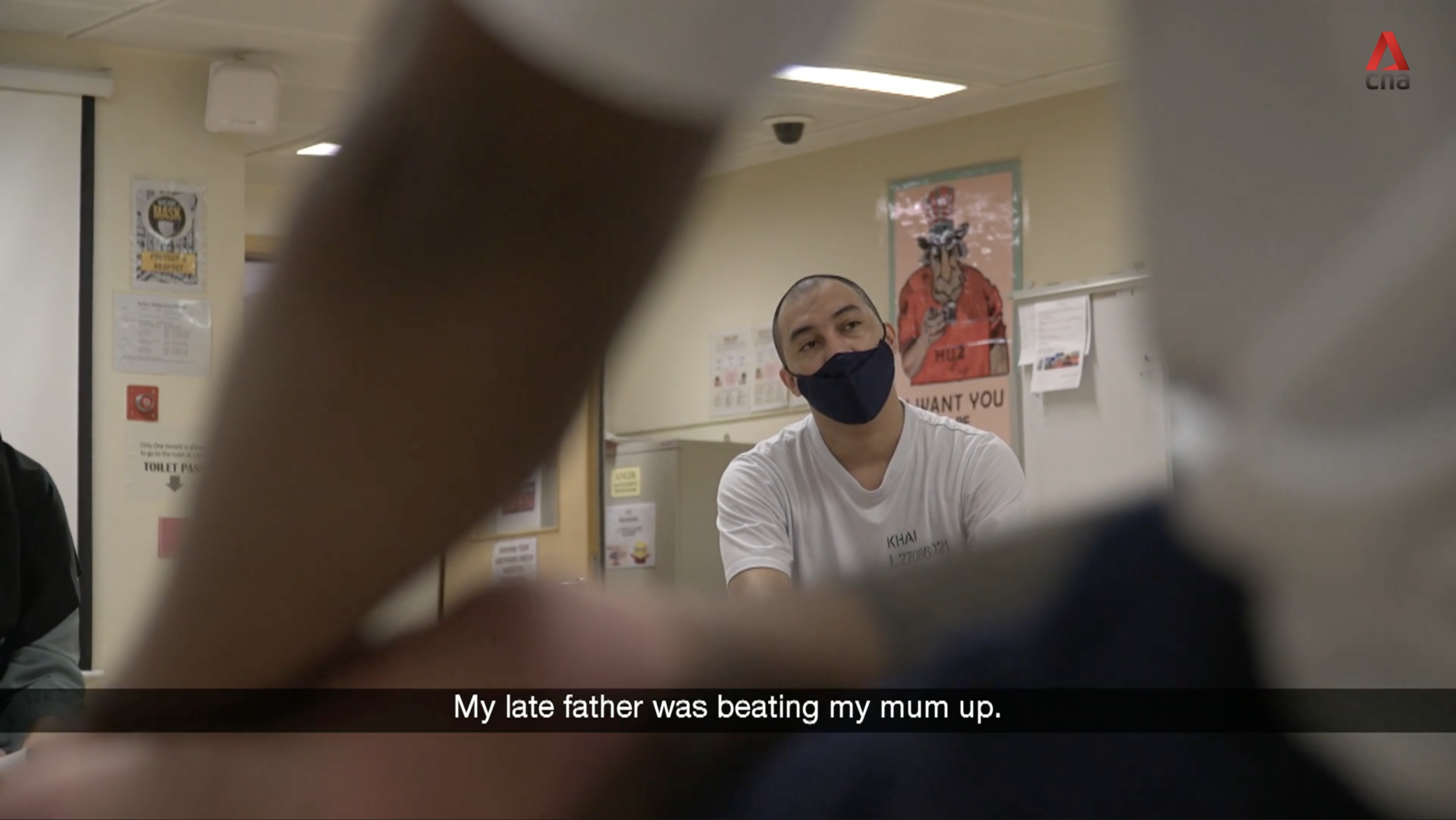 Image screenshot from CNA video.
Image screenshot from CNA video.
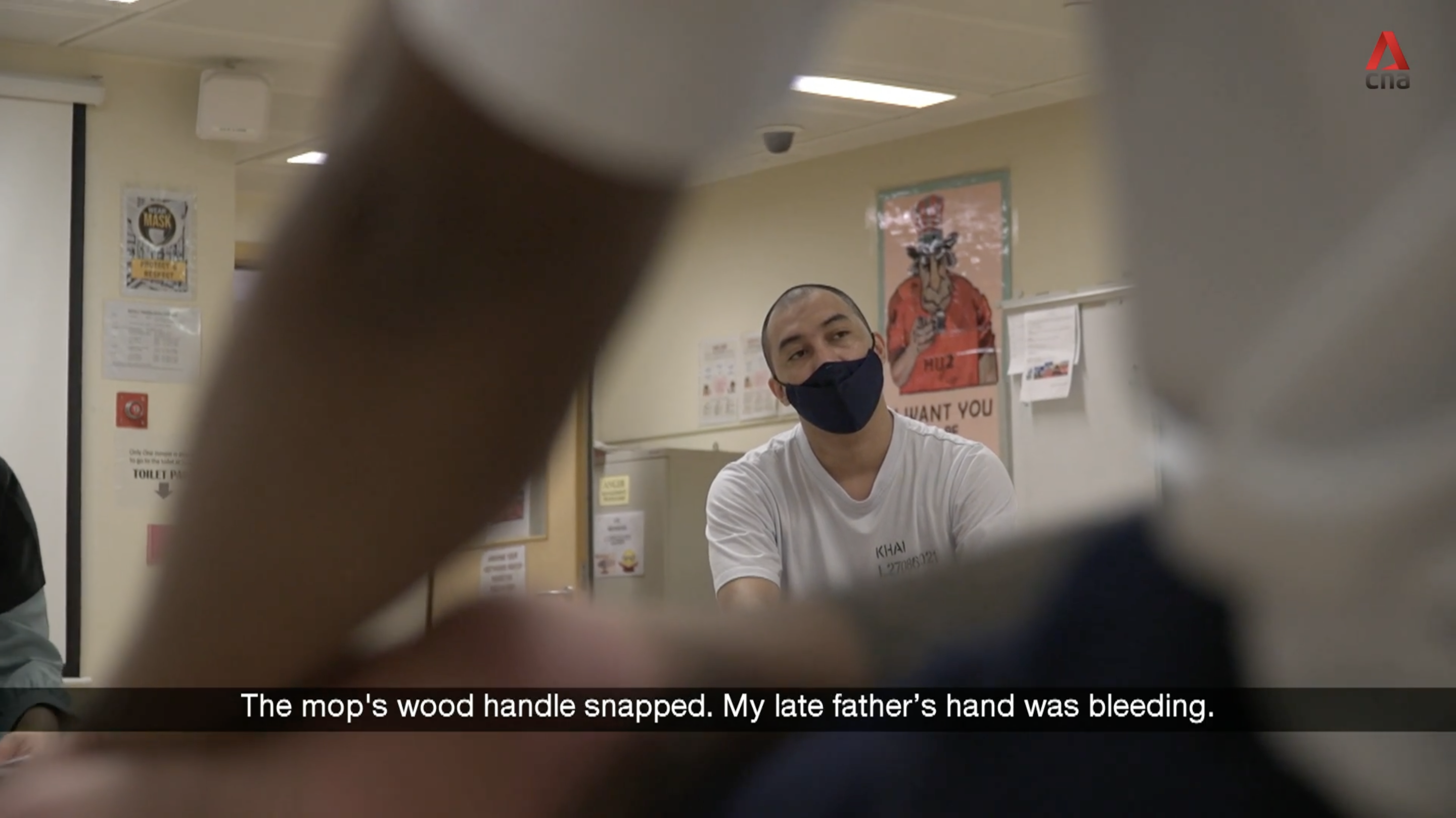 Image screenshot from CNA video.
Image screenshot from CNA video.
Childhood experiences like this could have perhaps formed a schema, an entrenched belief that a person has of him or herself, or others, and the world around them.
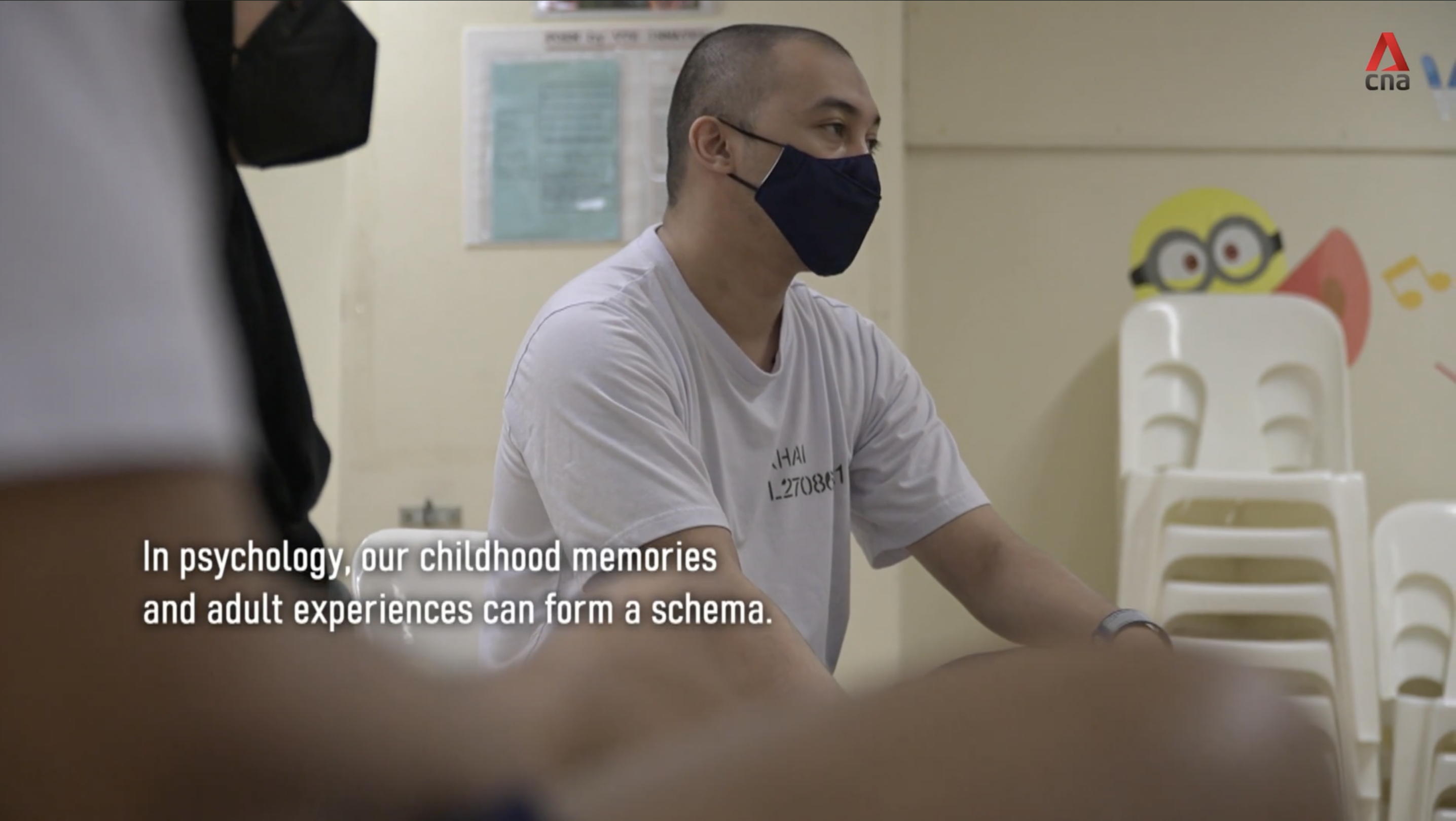 Image screenshot from CNA video.
Image screenshot from CNA video.
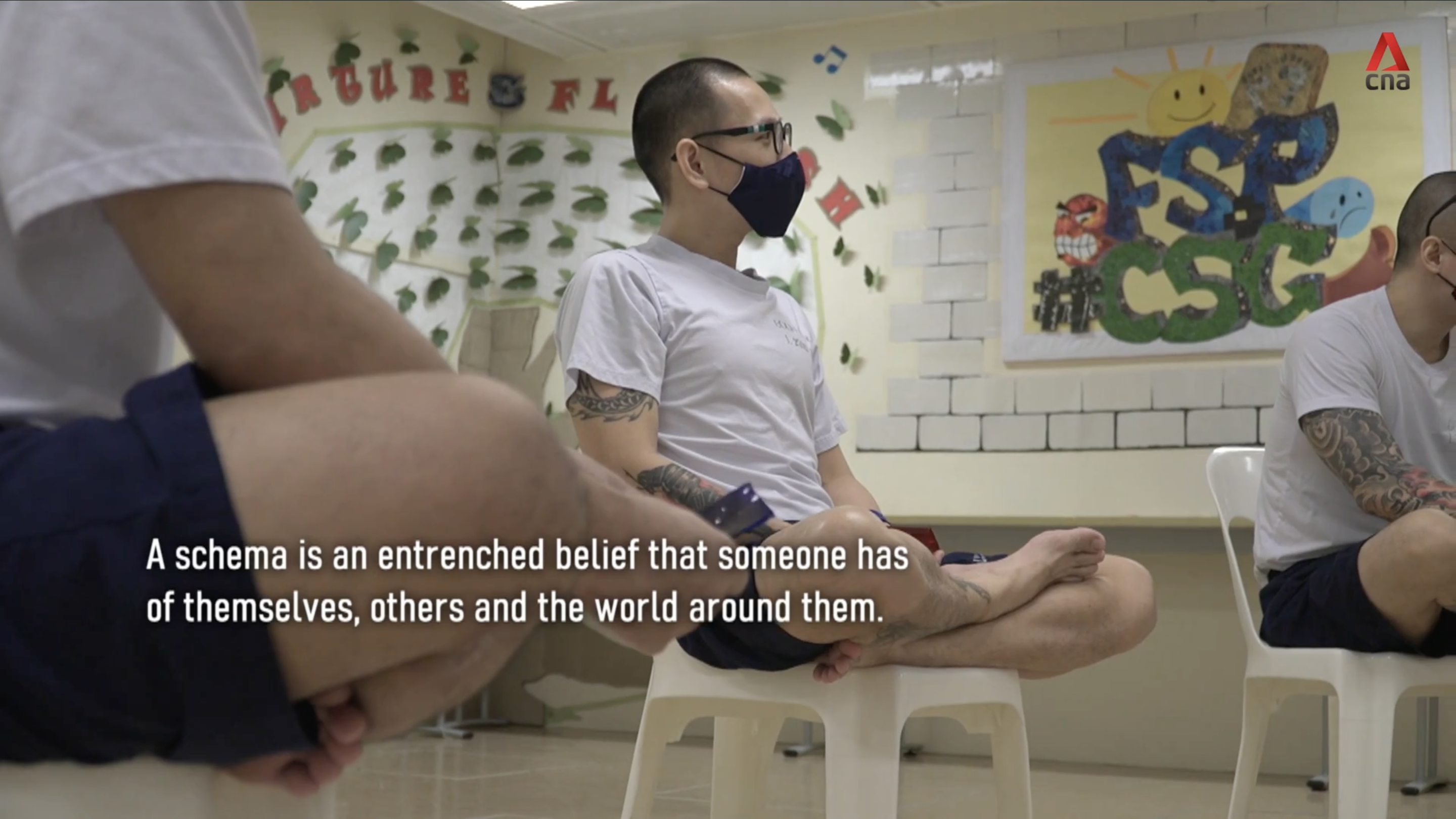 Image screenshot from CNA video.
Image screenshot from CNA video.
Trying not to explode in prison
According to the prison's lead psychologist, Rashida Binte Mohamed Zain, there have been a few instances where Khai has resorted to violence to achieve a desired effect and/ or outcome.
This method, when successful, entrenches his belief that violence is a means to an end, and when repeated enough times, gradually becomes an automatic response whenever Khai is met with a problem.
Resorting to violence could be yet another factor for Khai's schema, who previously expressed suicidal thoughts too.
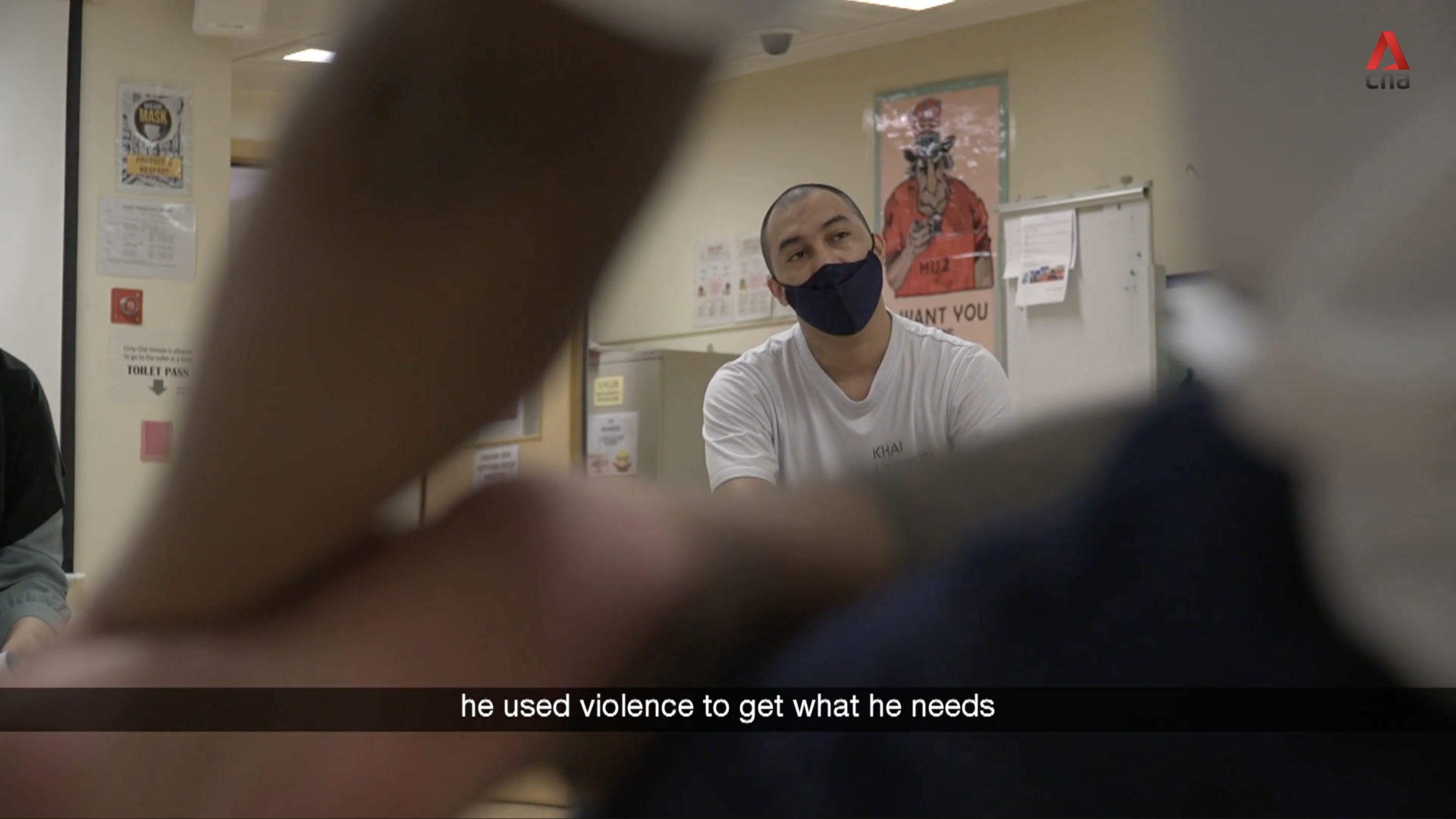 Image screenshot from CNA video.
Image screenshot from CNA video.
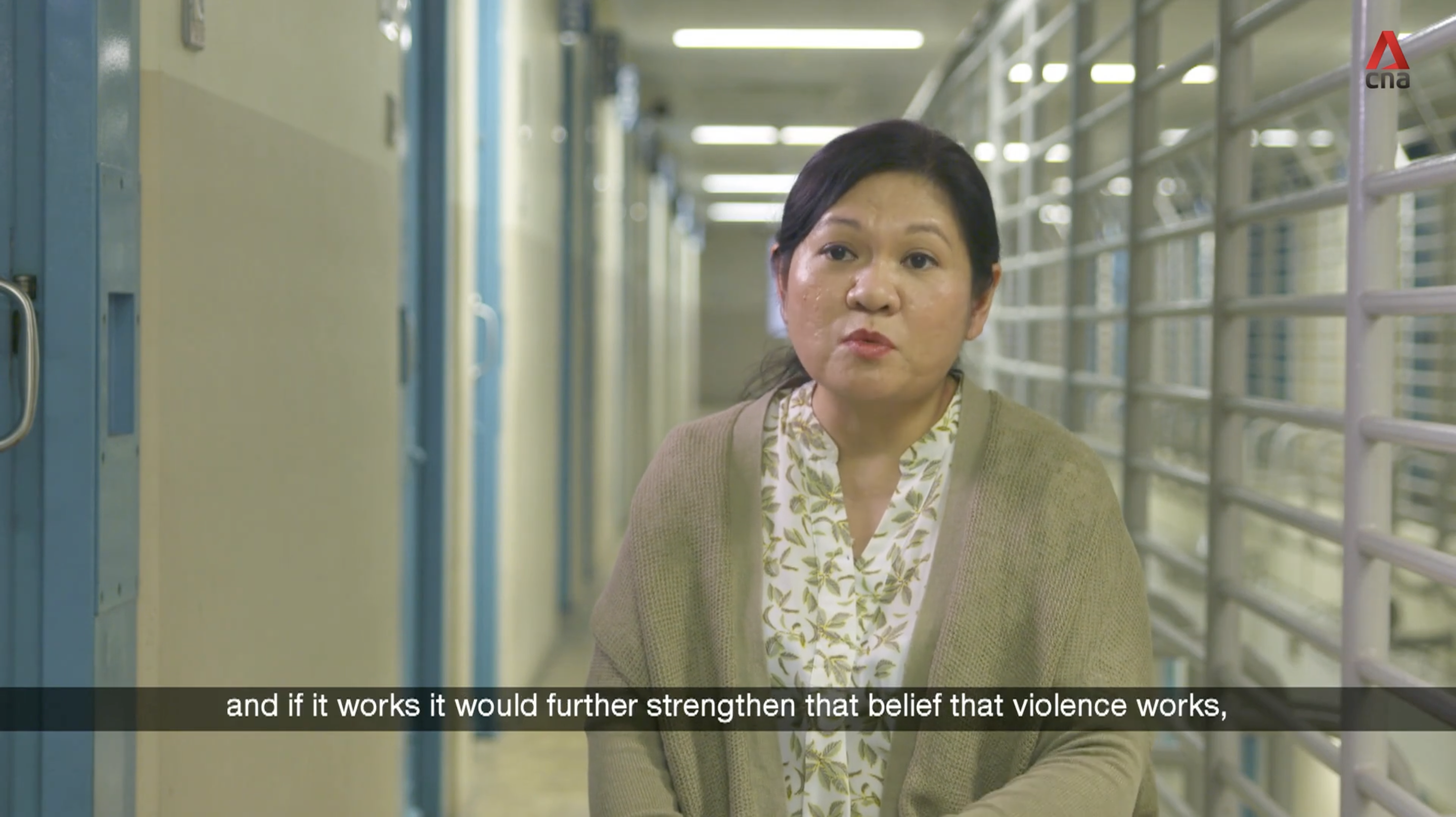 Image screenshot from CNA video.
Image screenshot from CNA video.
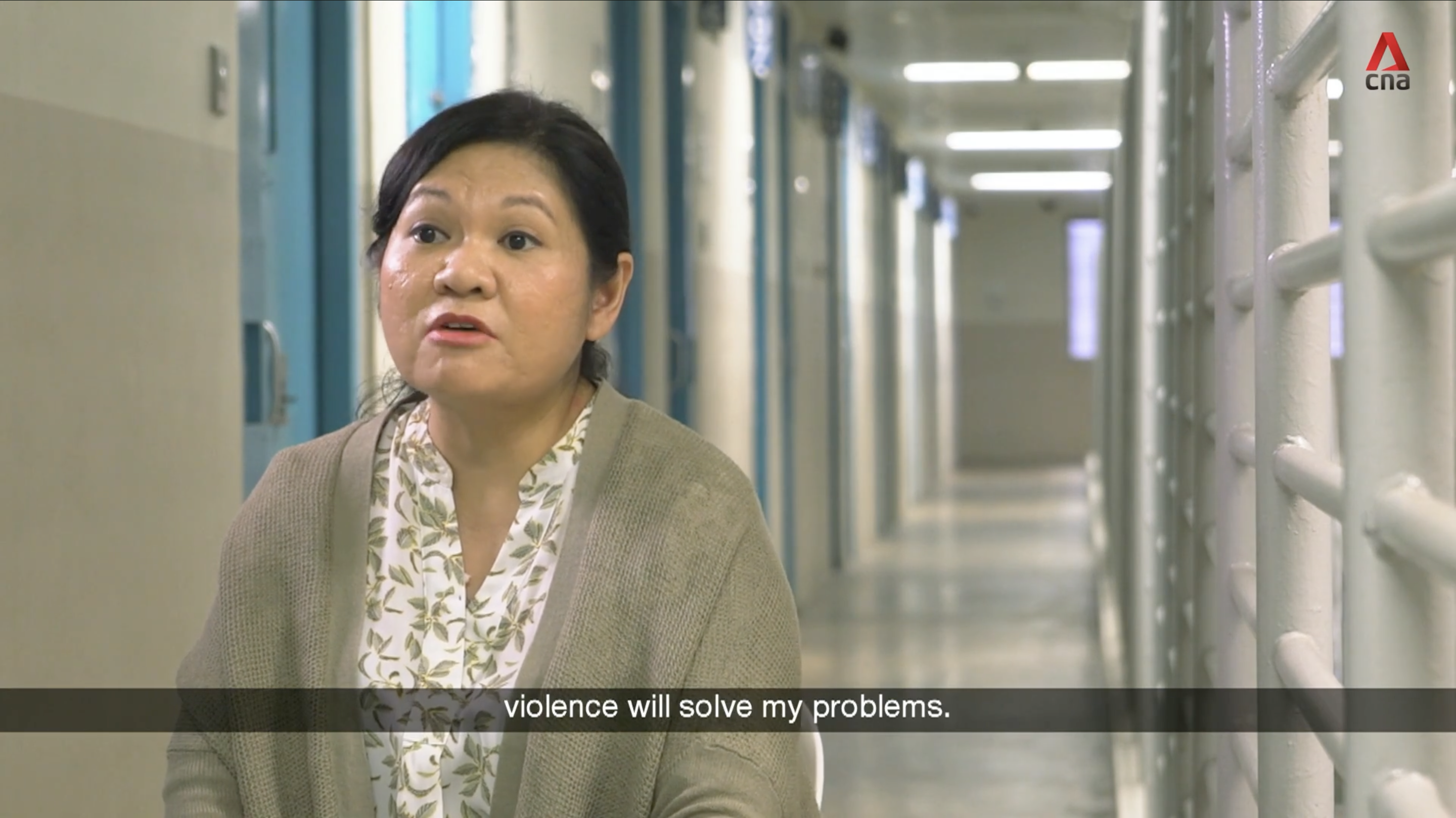 Image screenshot from CNA video.
Image screenshot from CNA video.
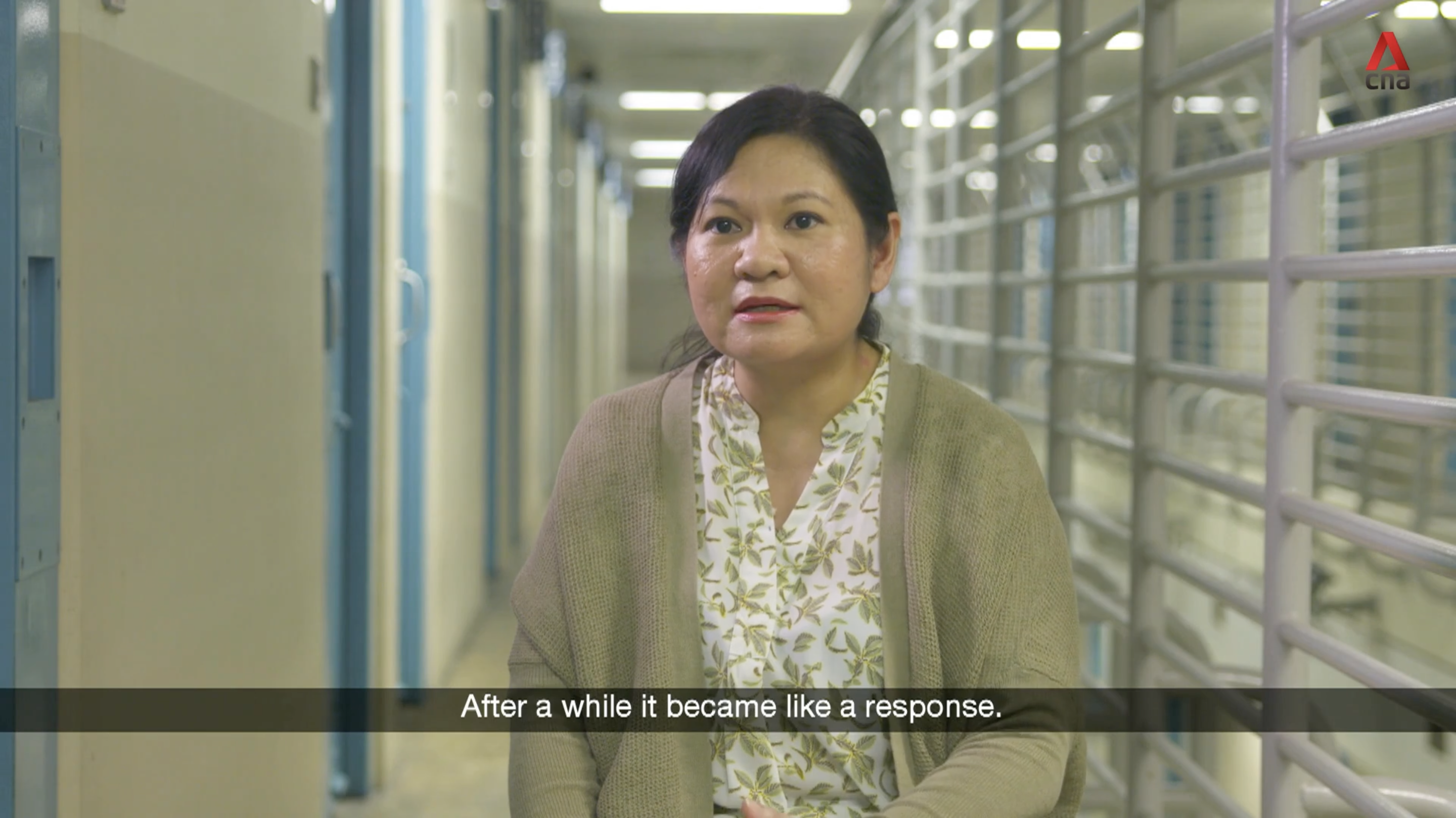 Image screenshot from CNA video.
Image screenshot from CNA video.
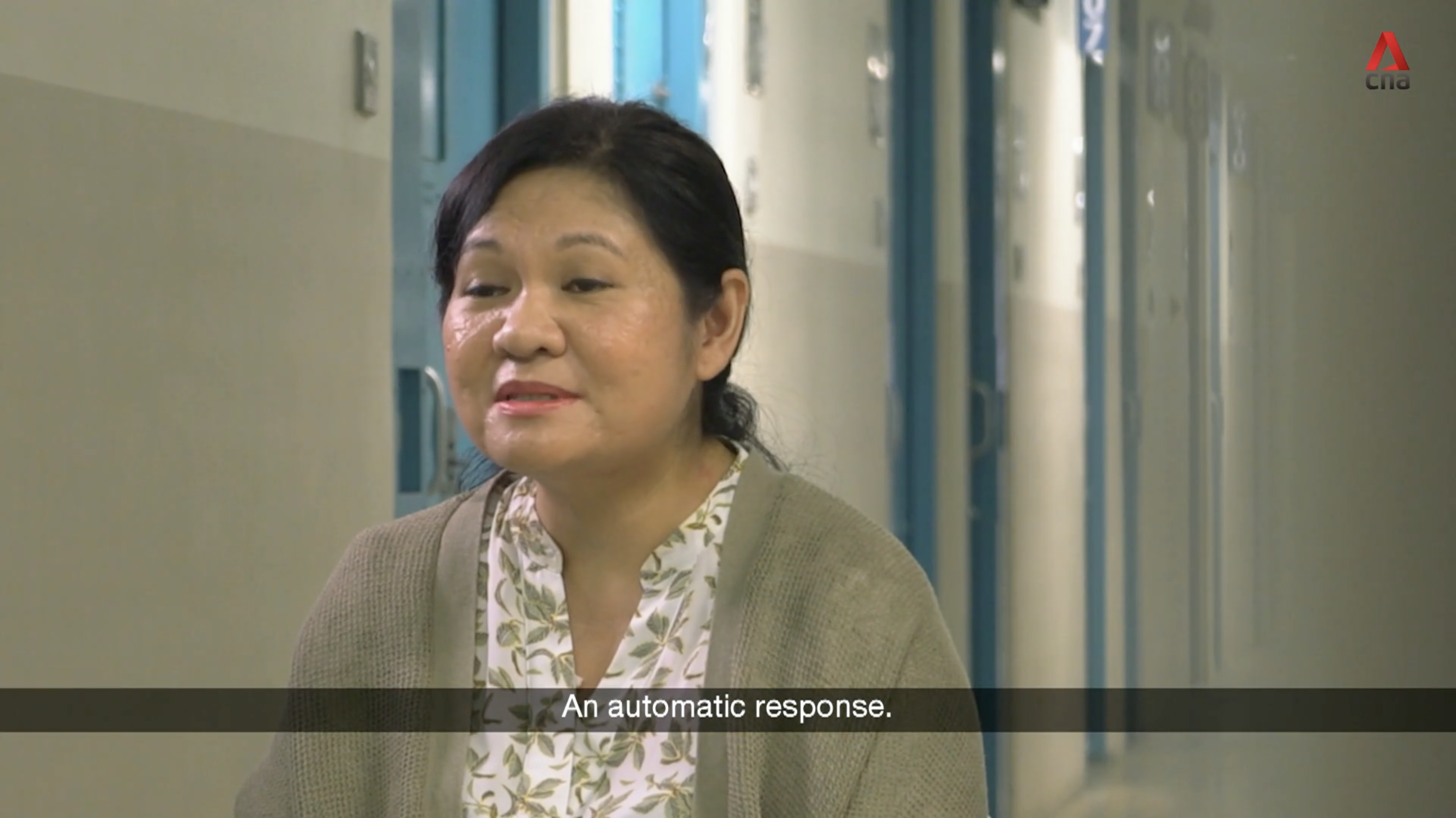 Image screenshot from CNA video.
Image screenshot from CNA video.
To help inmates like Khai correct such behaviours, the prison has set up a schema elective module and a violence intervention programme known as "HERO".
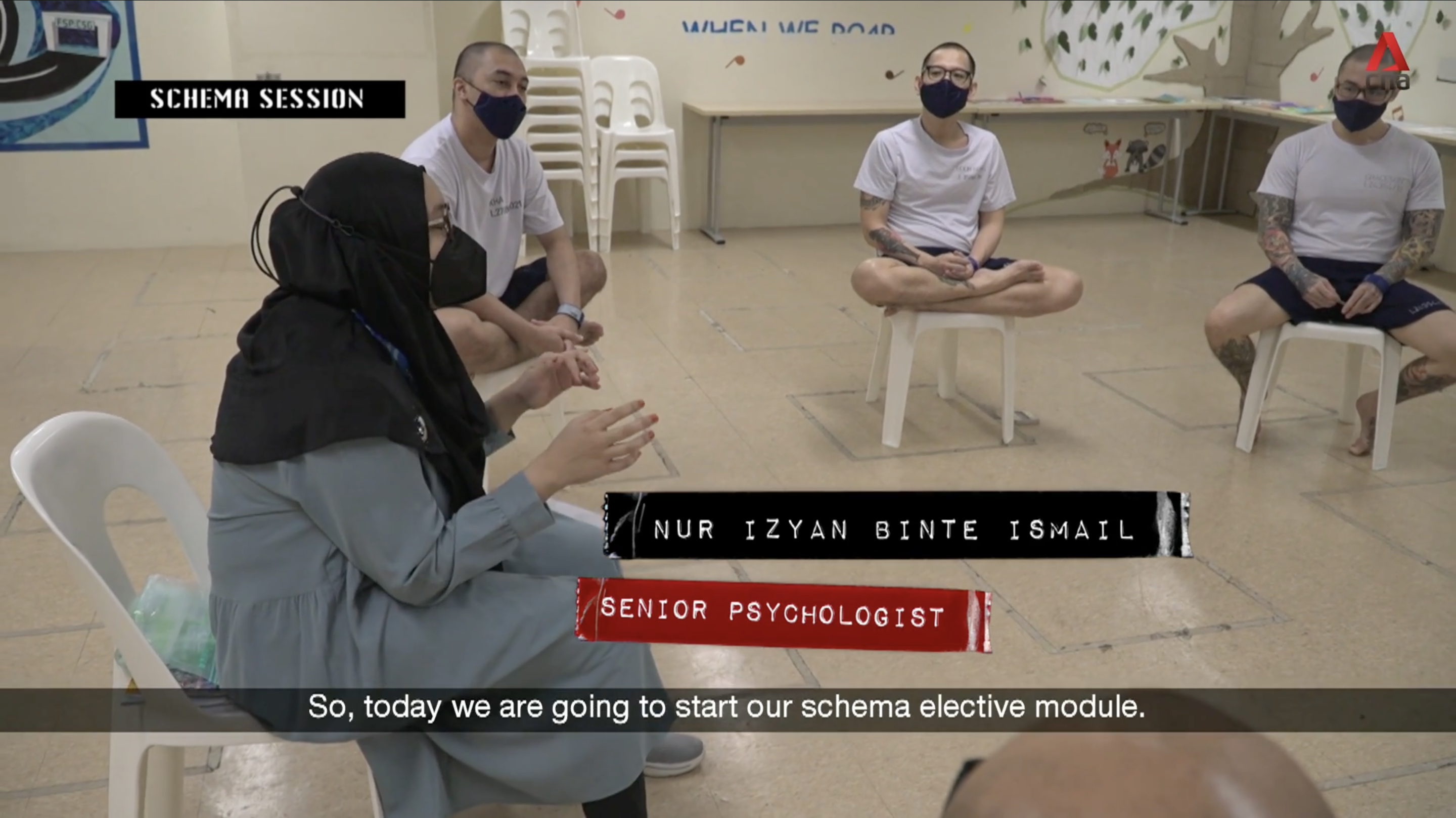 Image screenshot from CNA video.
Image screenshot from CNA video.
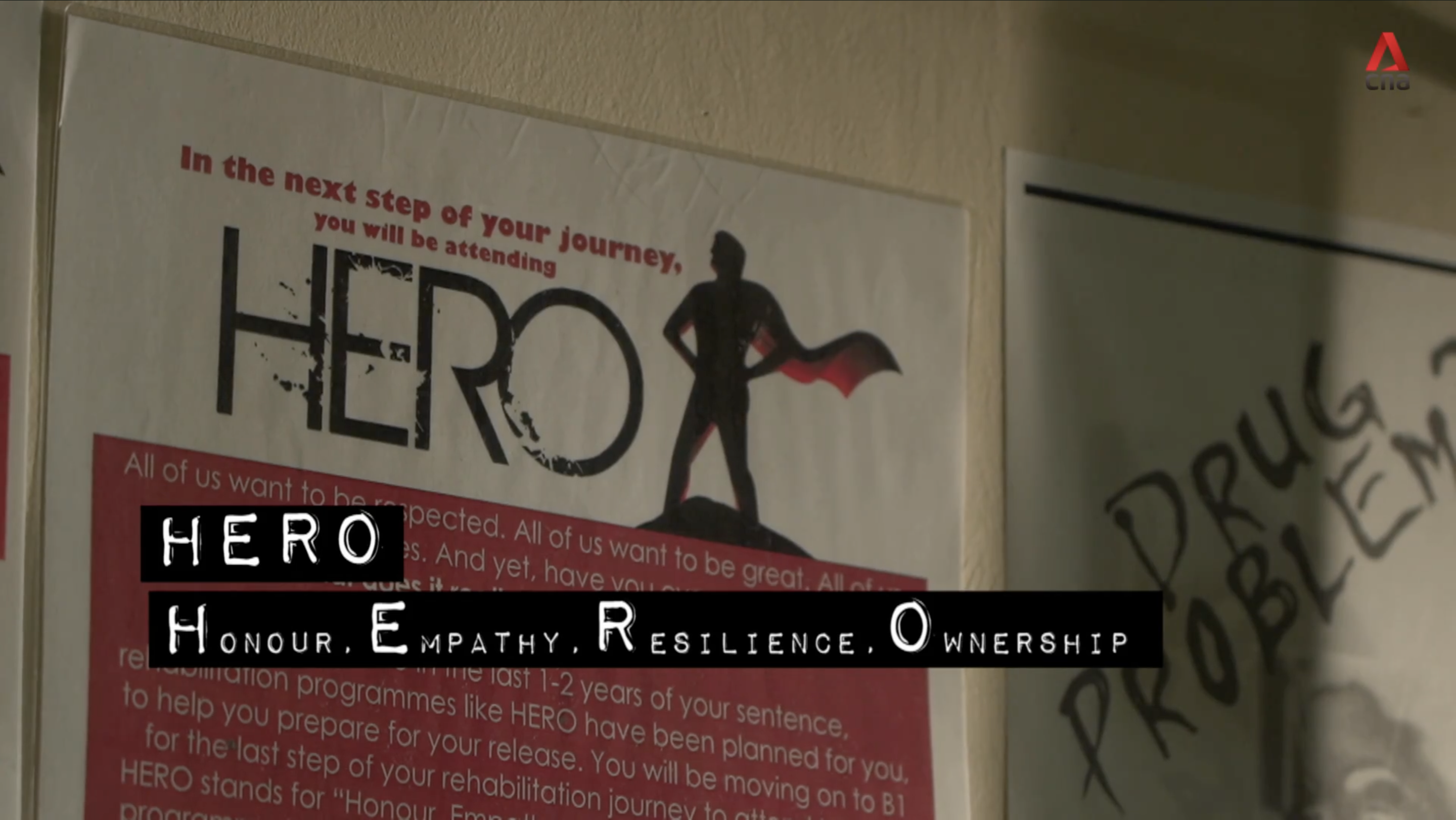 Image screenshot from CNA video.
Image screenshot from CNA video.
Get rewarded for good behaviour
These programmes help inmates with histories of violence better understand themselves, or more specifically their offences and violent triggers, through a combination of inculcating empathy, analysing problems, self-reflection and positive reinforcement.
Inmates can earn points for their good behaviour and conduct through HERO, which can in turn be redeemed every Friday for rewarded privileges, ranging from extra time spent outside of their cells to movie screenings.
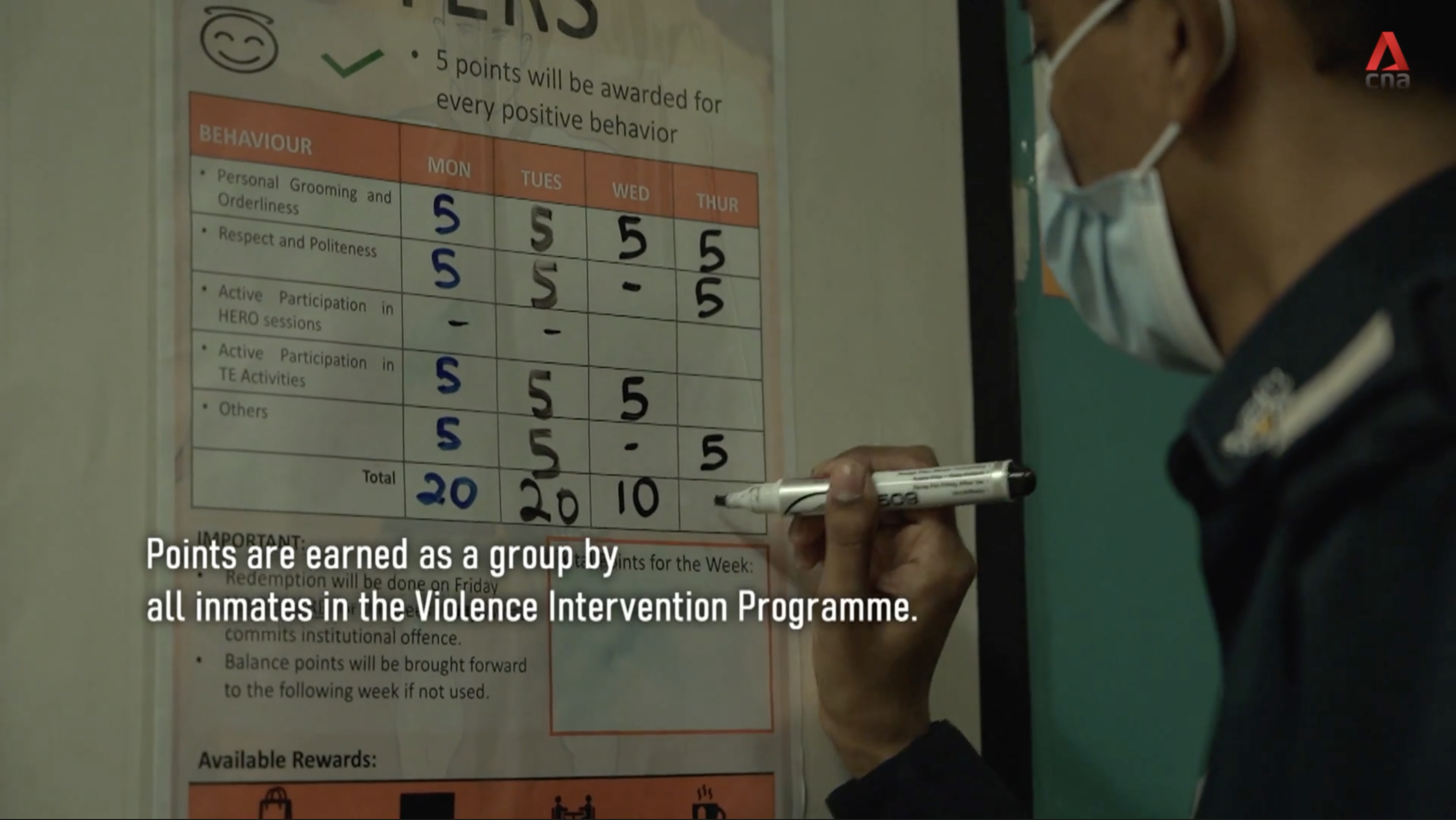 Image screenshot from CNA video.
Image screenshot from CNA video.
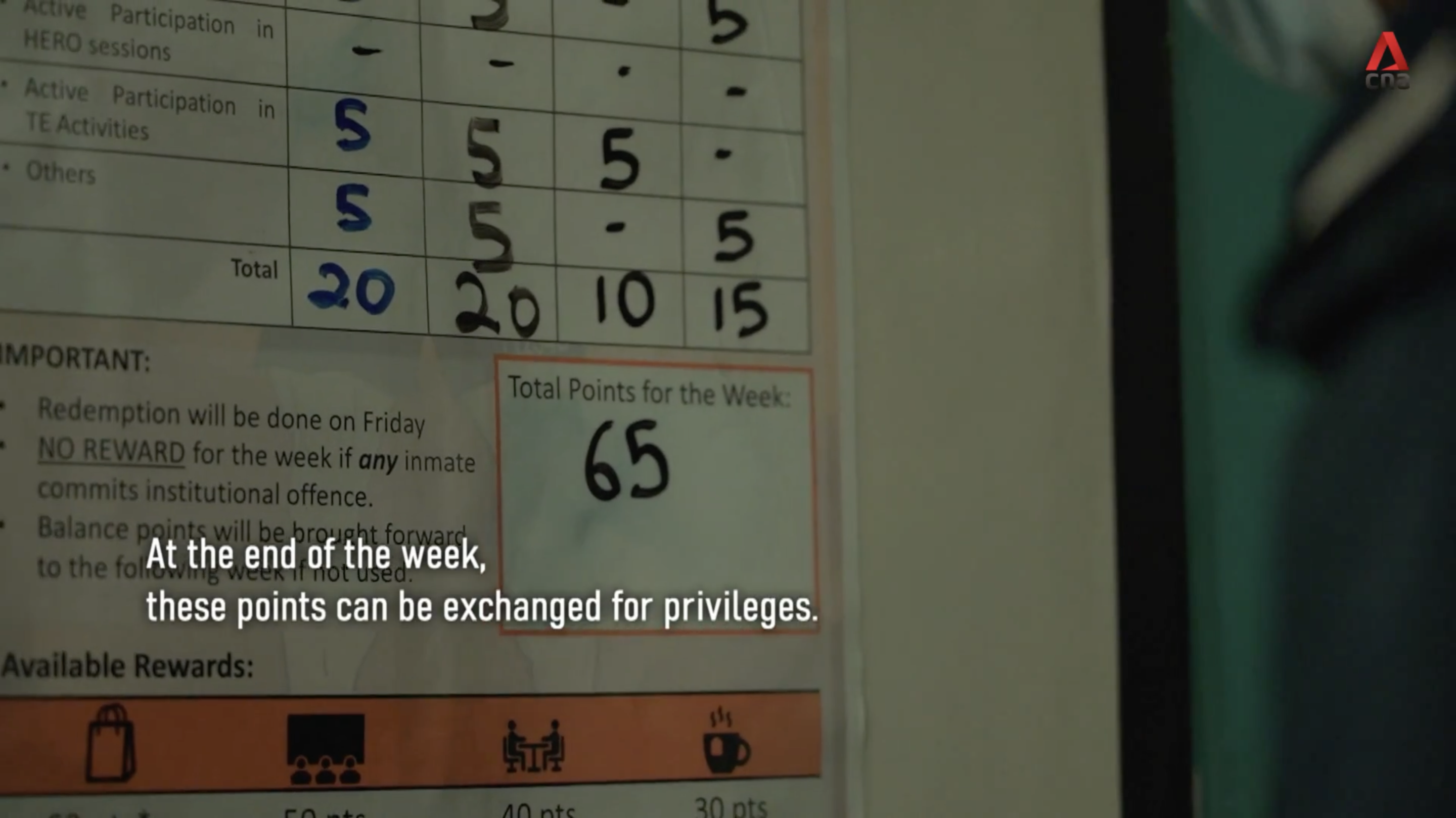 Image screenshot from CNA video.
Image screenshot from CNA video.
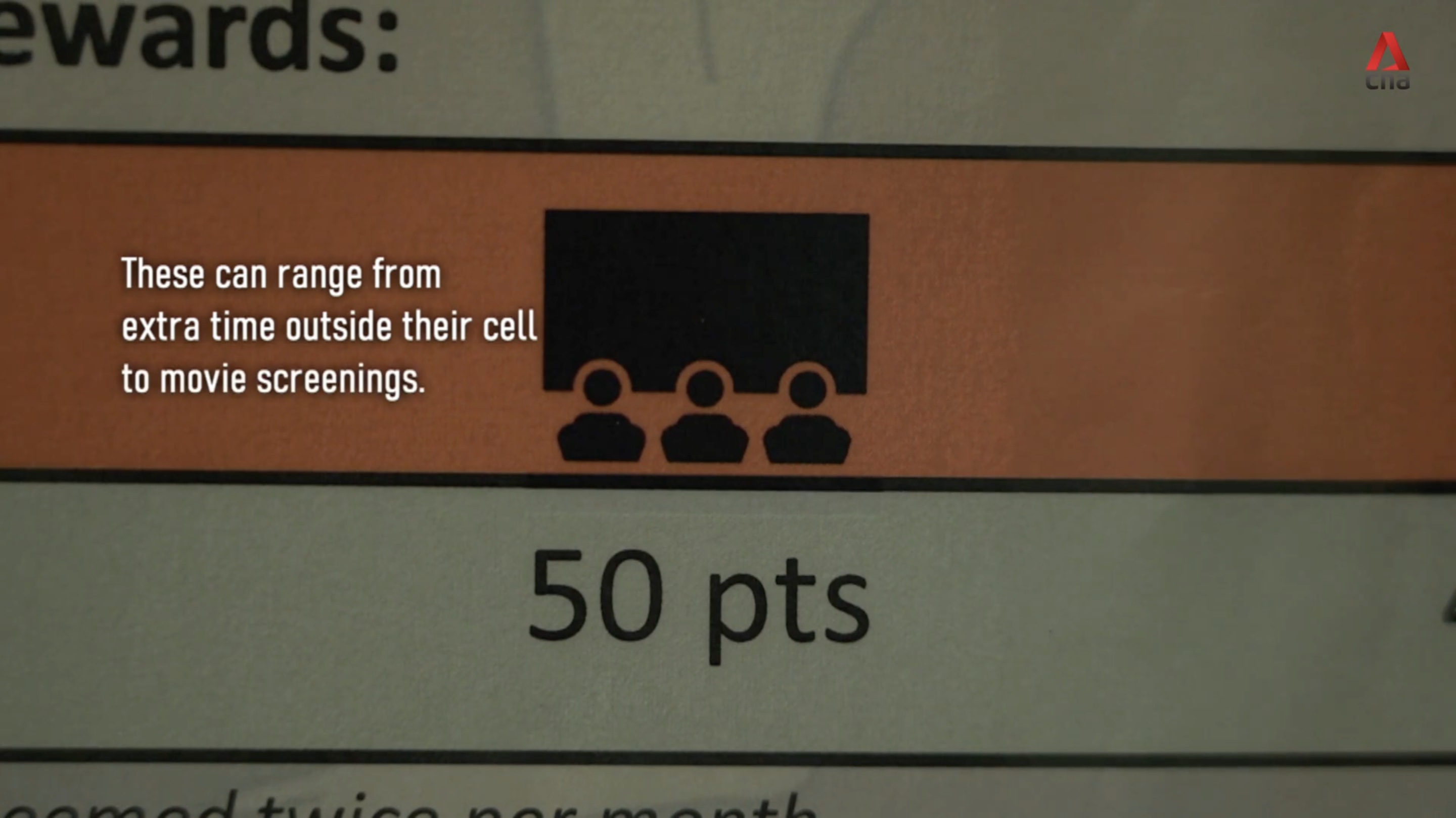 Image screenshot from CNA video.
Image screenshot from CNA video.
Can watch movies behind bars
Like the newspapers, these movies are often out of date.
However, the movie has successfully captivated an ultra-engrossed Boon Keng, who did not seem to mind that the movies were "very backdated", and even went so far to say that the movie experience in prison trumps the one at cinemas.
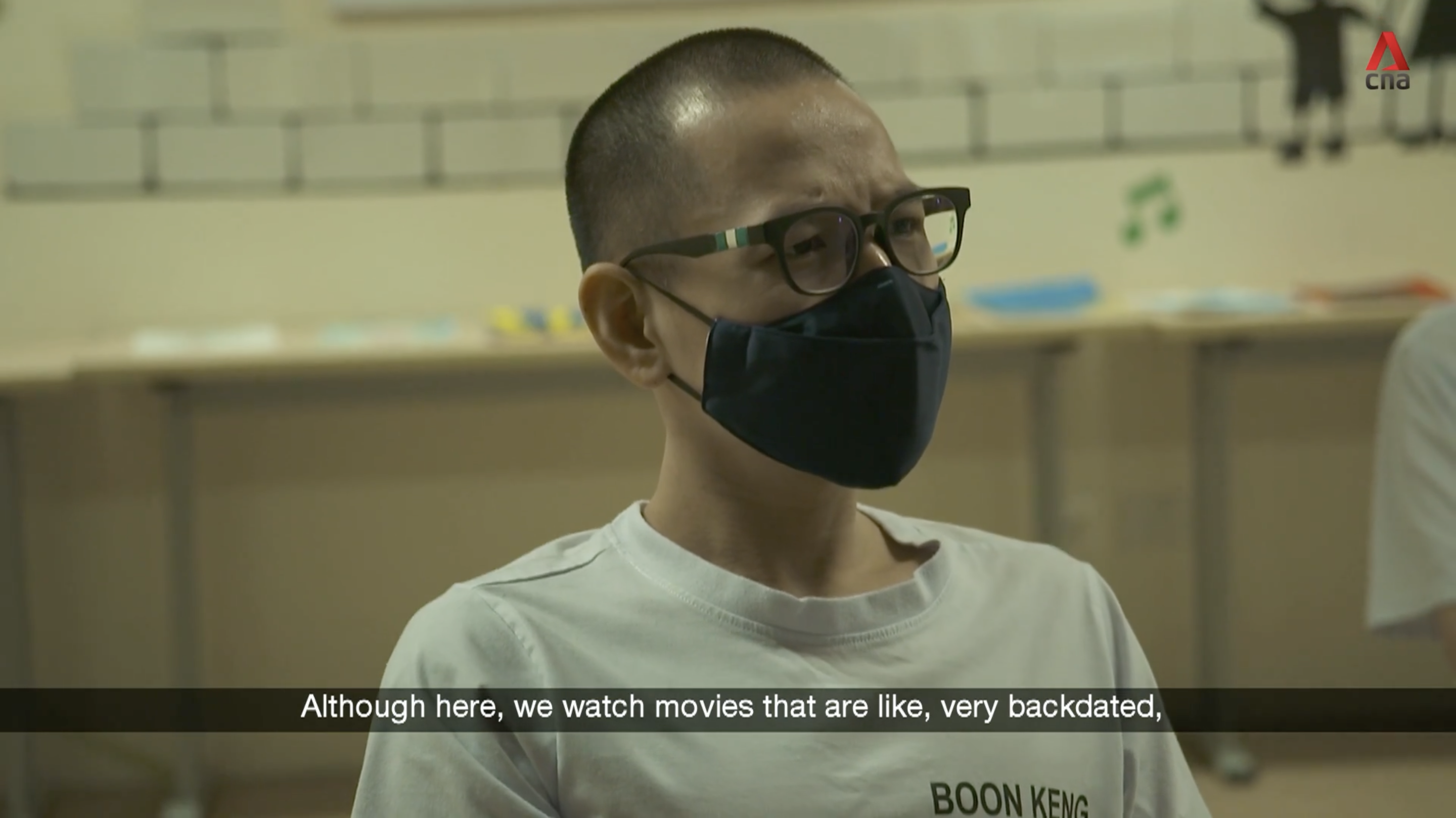 Image screenshot from CNA video.
Image screenshot from CNA video.
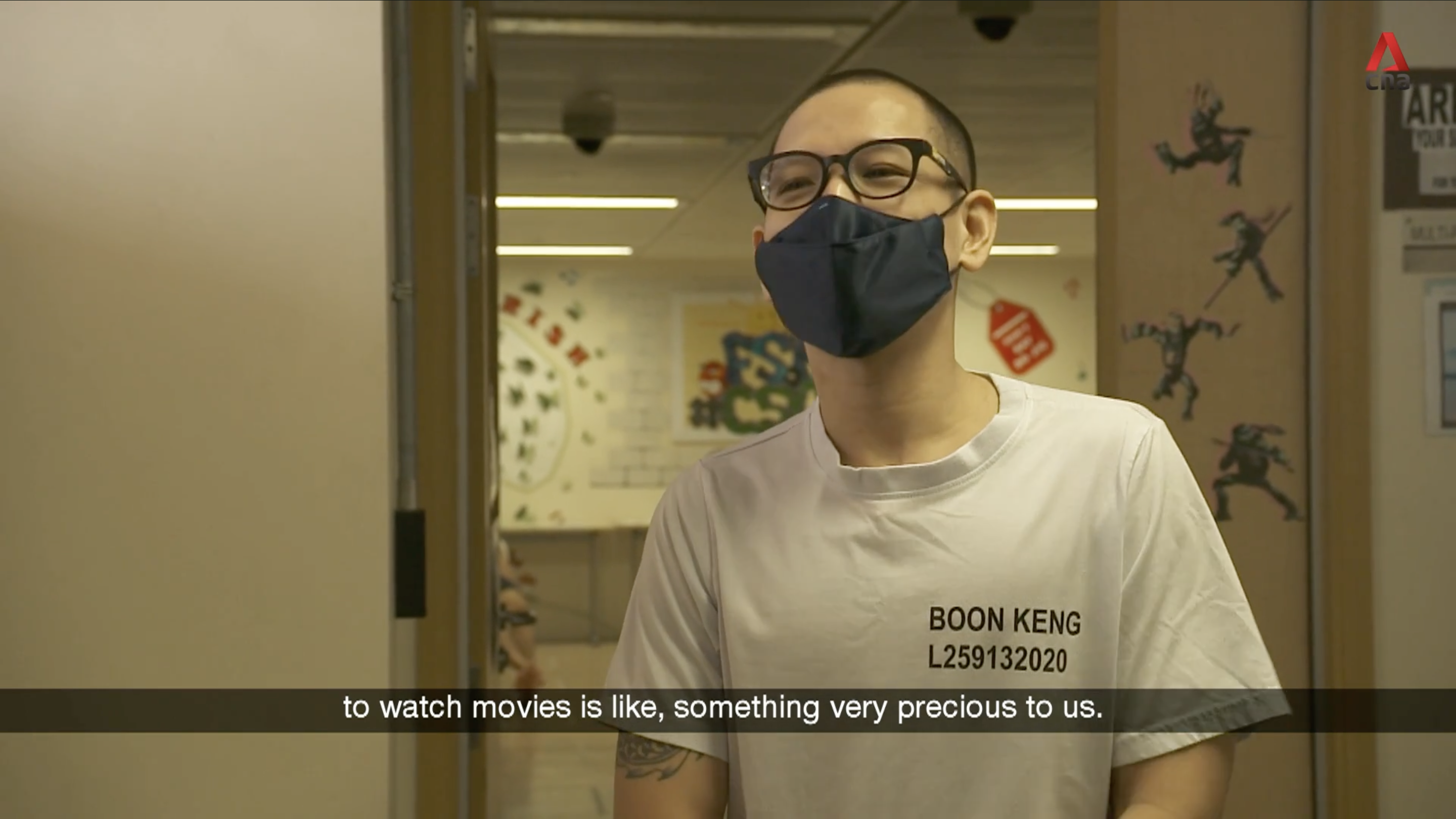 Image screenshot from CNA video.
Image screenshot from CNA video.
 Image screenshot from CNA video.
Image screenshot from CNA video.
Reoffending while within prison
There is a likelihood for inmates with violent tendencies to reoffend within prison as well.
Graceson, who was convicted for carrying weapons on three different occasions, told Muhuthan he was on the brink of exploding and possibly lashing out at another prison officer.
He added that he feels really aggravated and stressed whenever he sees the prison officer.
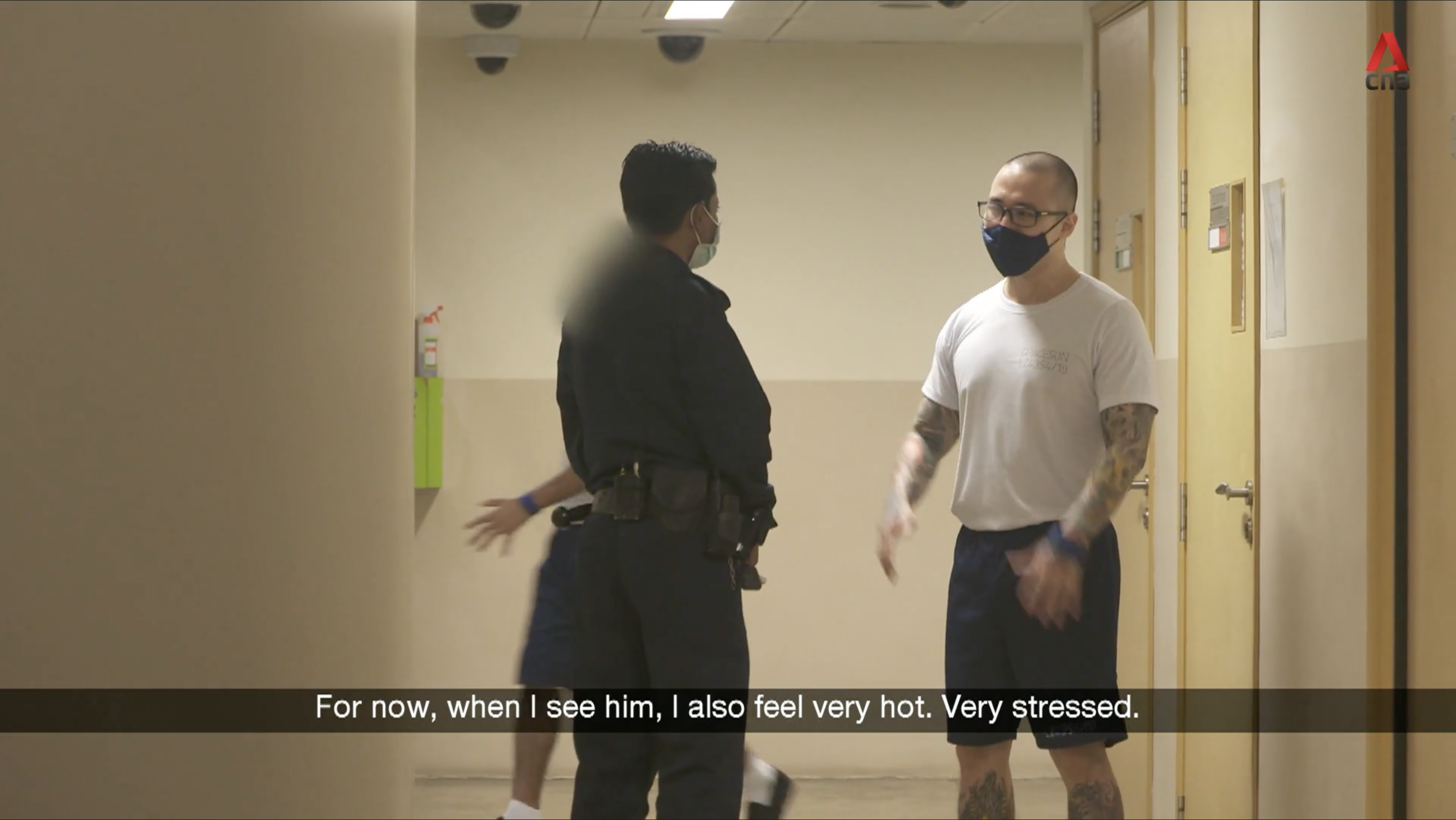 Image screenshot from CNA video.
Image screenshot from CNA video.
 Image screenshot from CNA video.
Image screenshot from CNA video.
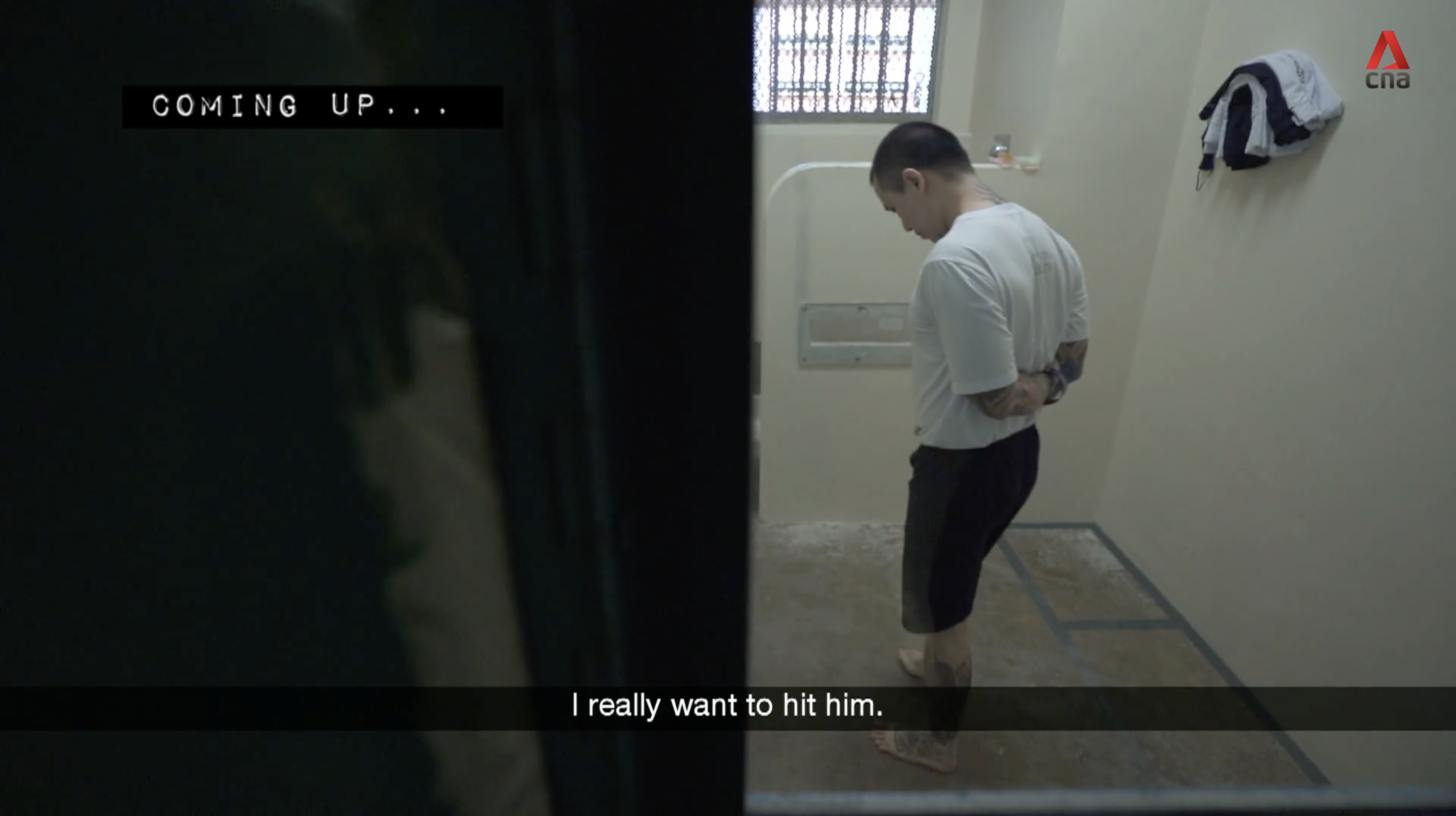 Image screenshot from CNA video.
Image screenshot from CNA video.
He thinks the prison officer has taken a personal issue with him as his repeated requests for an additional cloth hook in his cell has not been met.
Each cell in the maximum security institution have three cloth hooks, two of which are in the cell's living/ sleeping quarters, while the other is affixed onto the wall across the shower.
However, the number of cloth hooks are insufficient, as previously shown by Boon Keng who was caught with a makeshift cloth hook glued to the wall with a rice and water putty.
Graceson pointed at the space beside an existing cloth hook in his cell, which was balancing a stack of folded clothes, and said he needed an additional cloth hook for his towel.
He also lamented the cloth hook's adhesive strength, and said there have been instances where the hook will detach from the wall.
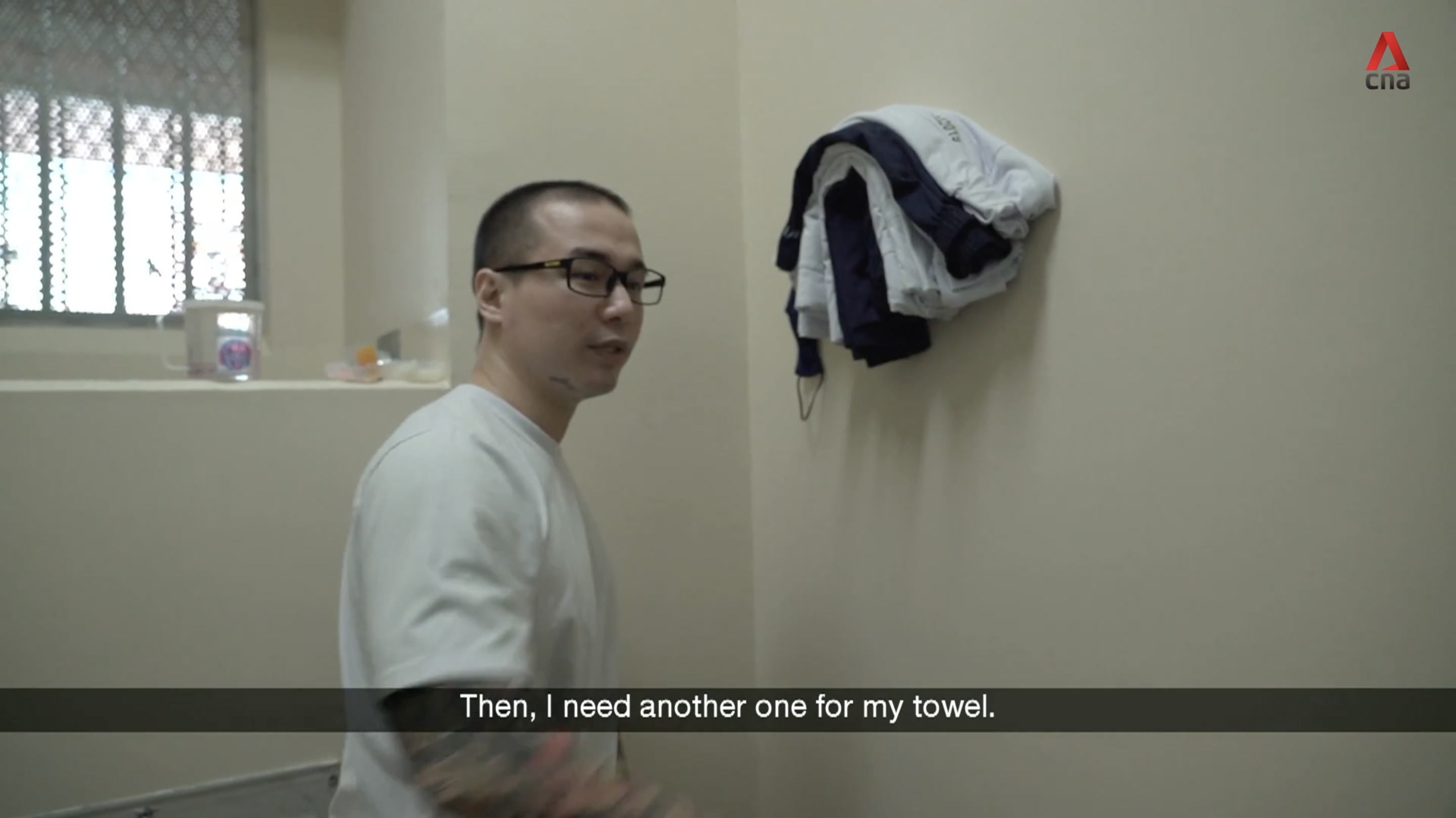 Image screenshot from CNA video.
Image screenshot from CNA video.
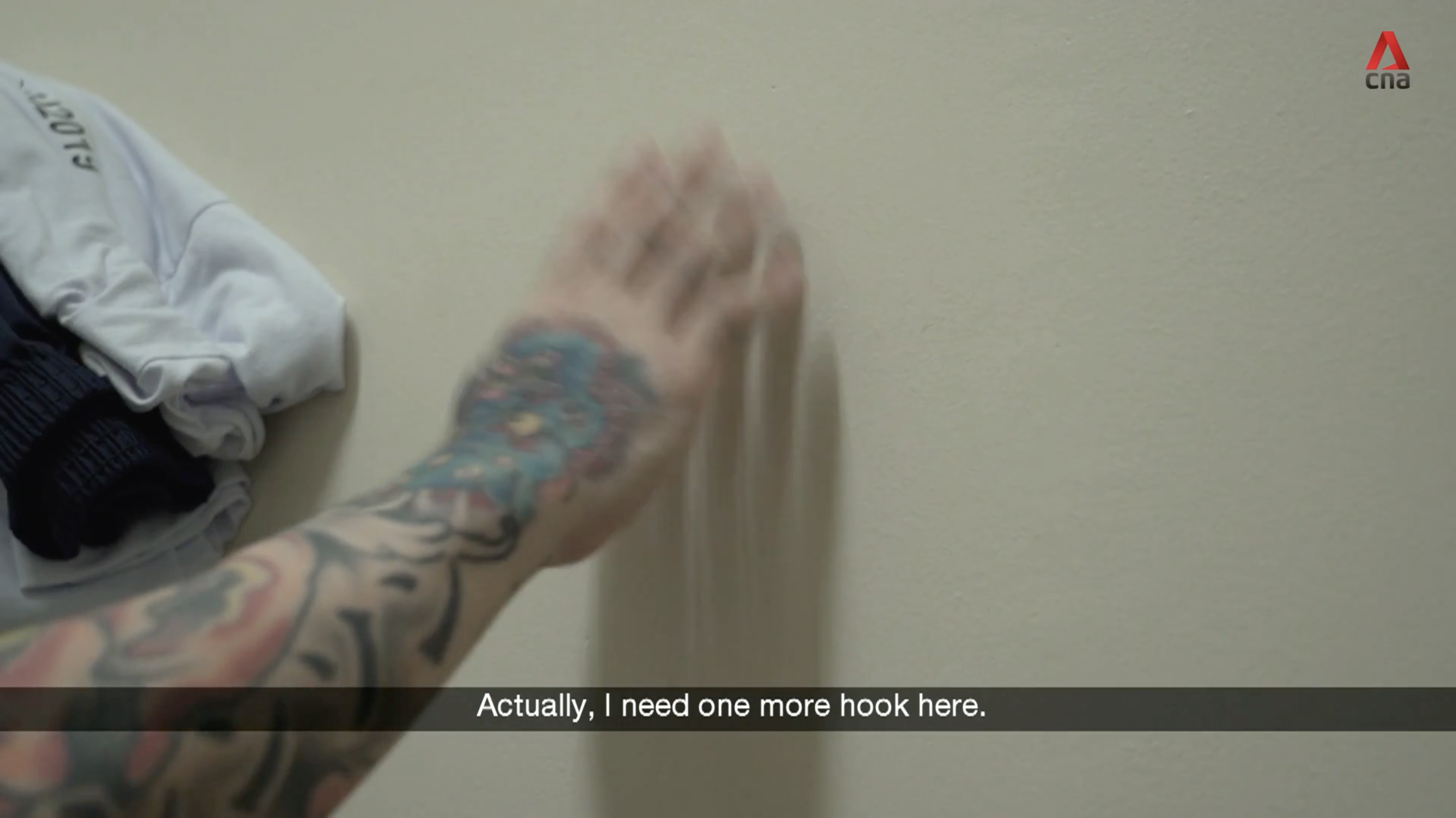 Image screenshot from CNA video.
Image screenshot from CNA video.
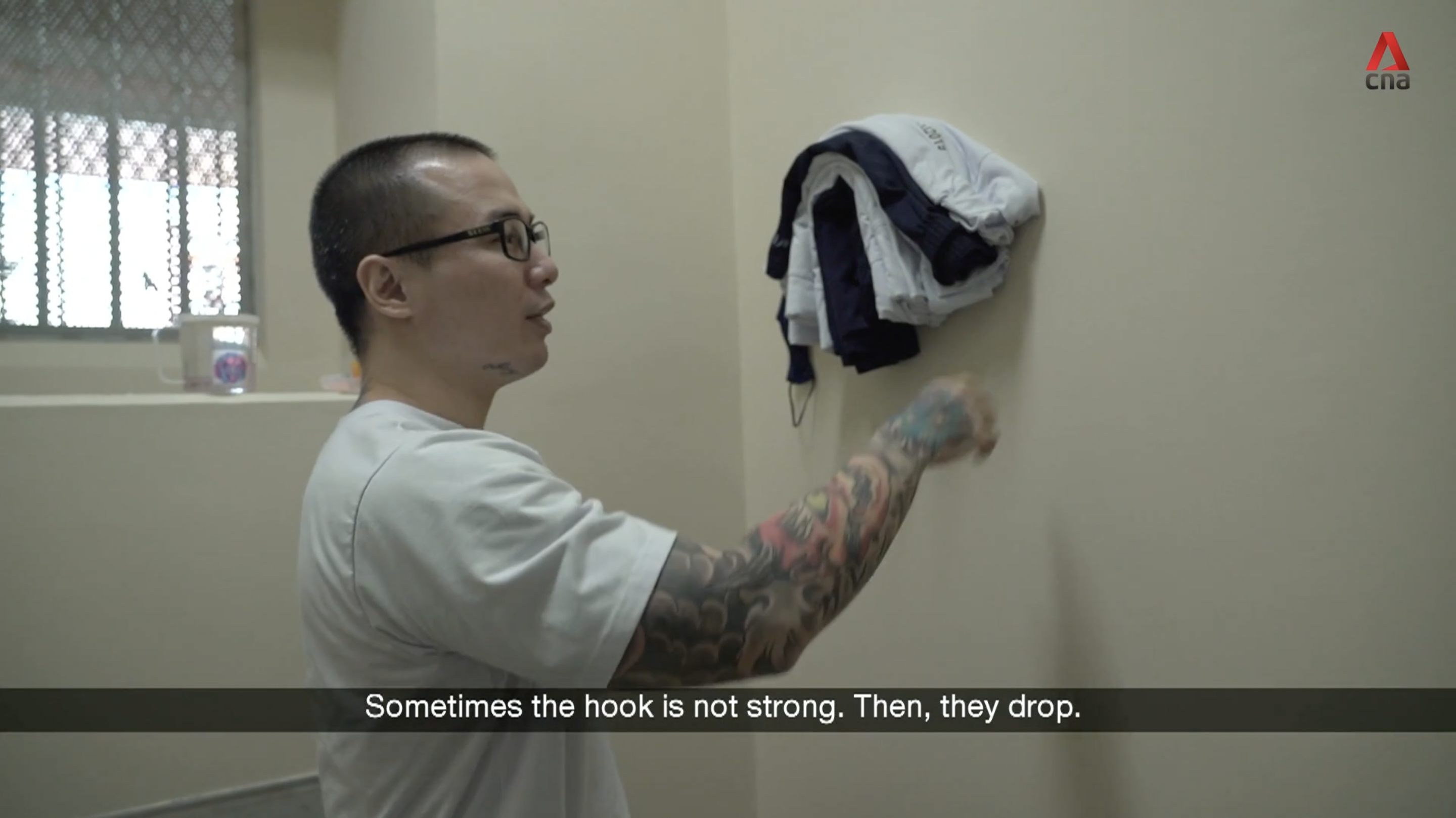 Image screenshot from CNA video.
Image screenshot from CNA video.
Frustrated at the non-response to his requests and seemingly at his wits end, Graceson sought Muhuthan's assistance and advice.
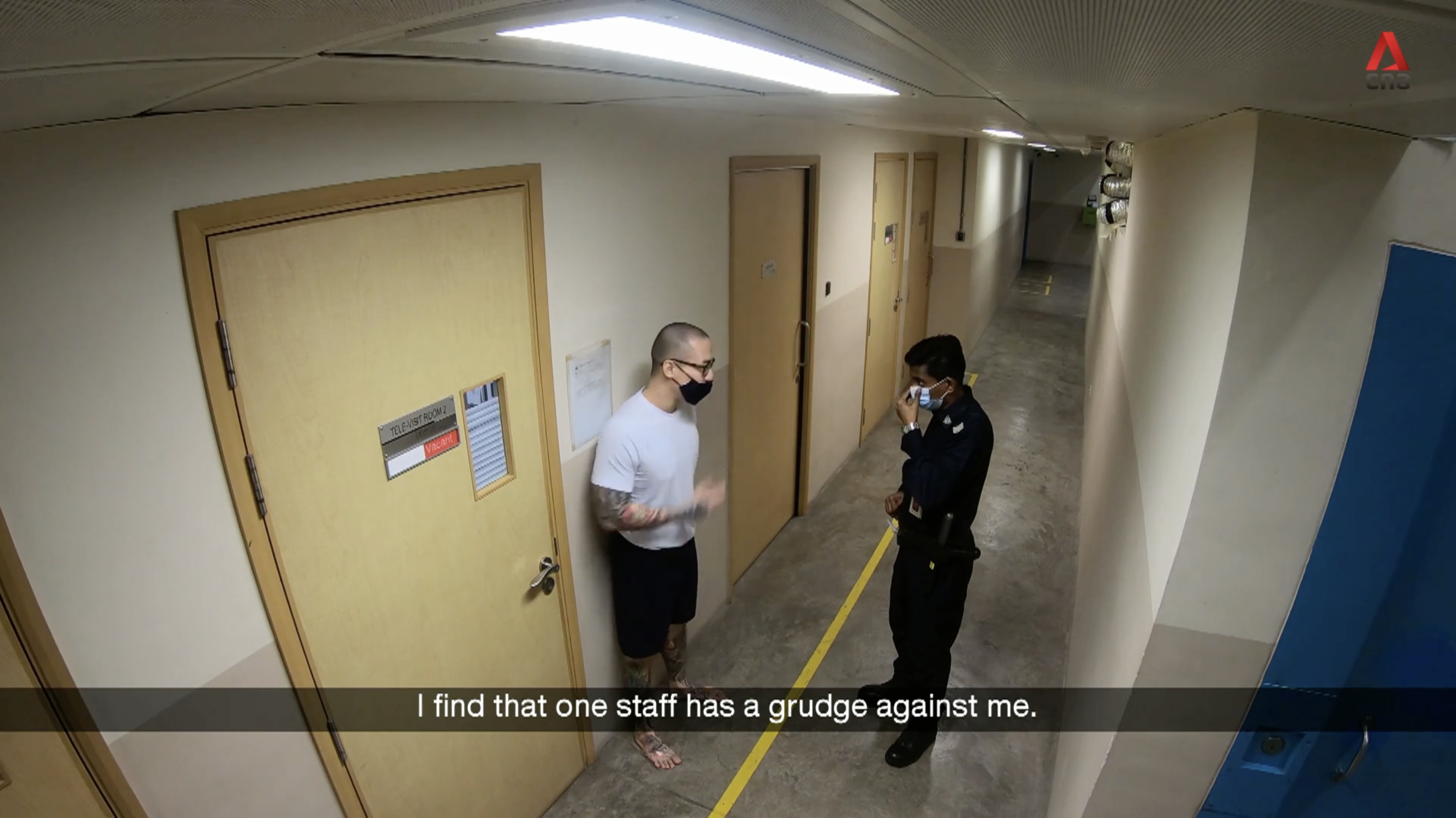 Image screenshot from CNA video.
Image screenshot from CNA video.
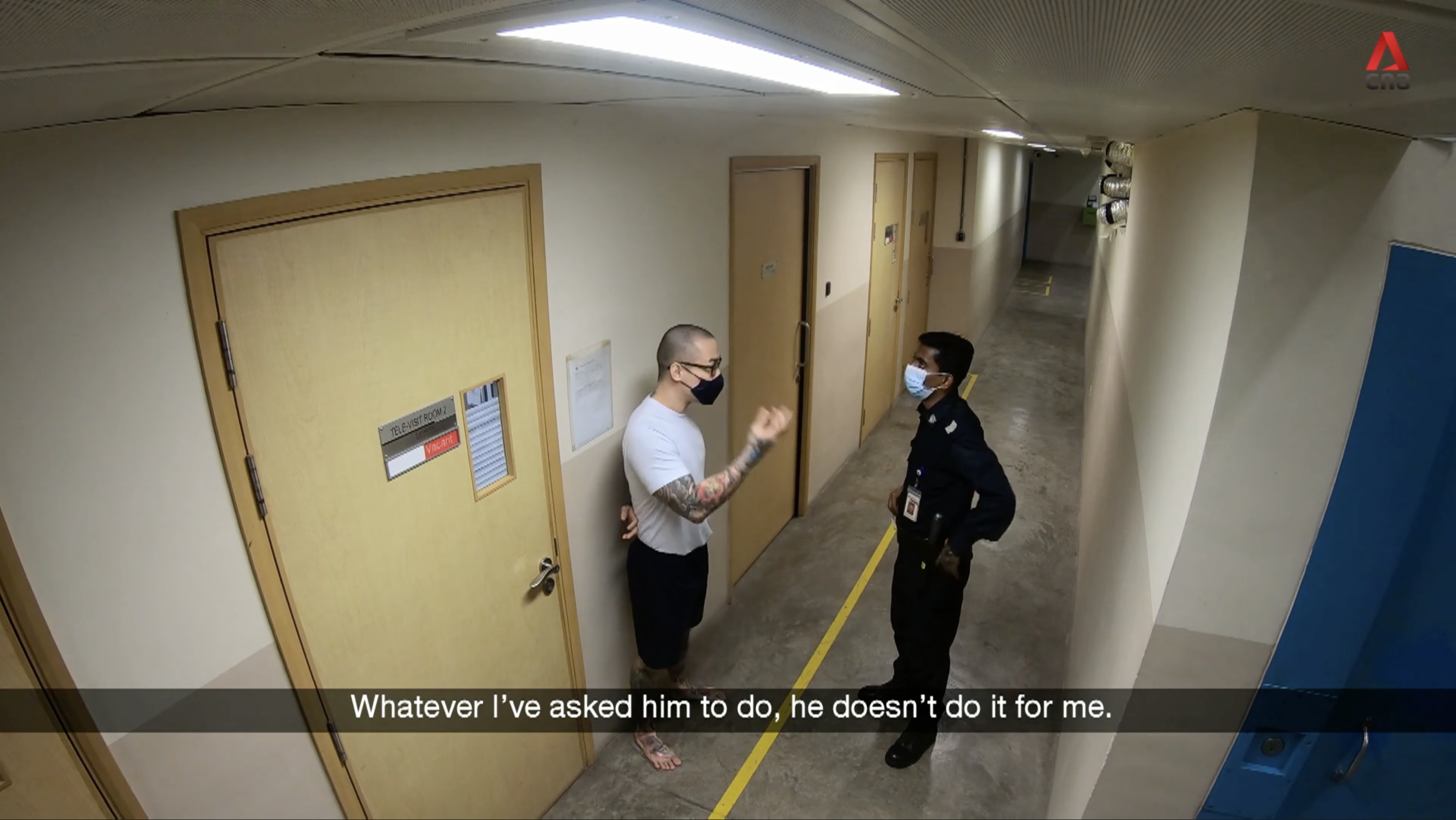 Image screenshot from CNA video.
Image screenshot from CNA video.
When Muhuthan asked Graceson why he did not approach the prison officer personally, Graceson said it's really hard for him to keep a lid on his temper.
To avoid getting in trouble entirely, Graceson said he would rather not talk to the officer altogether.
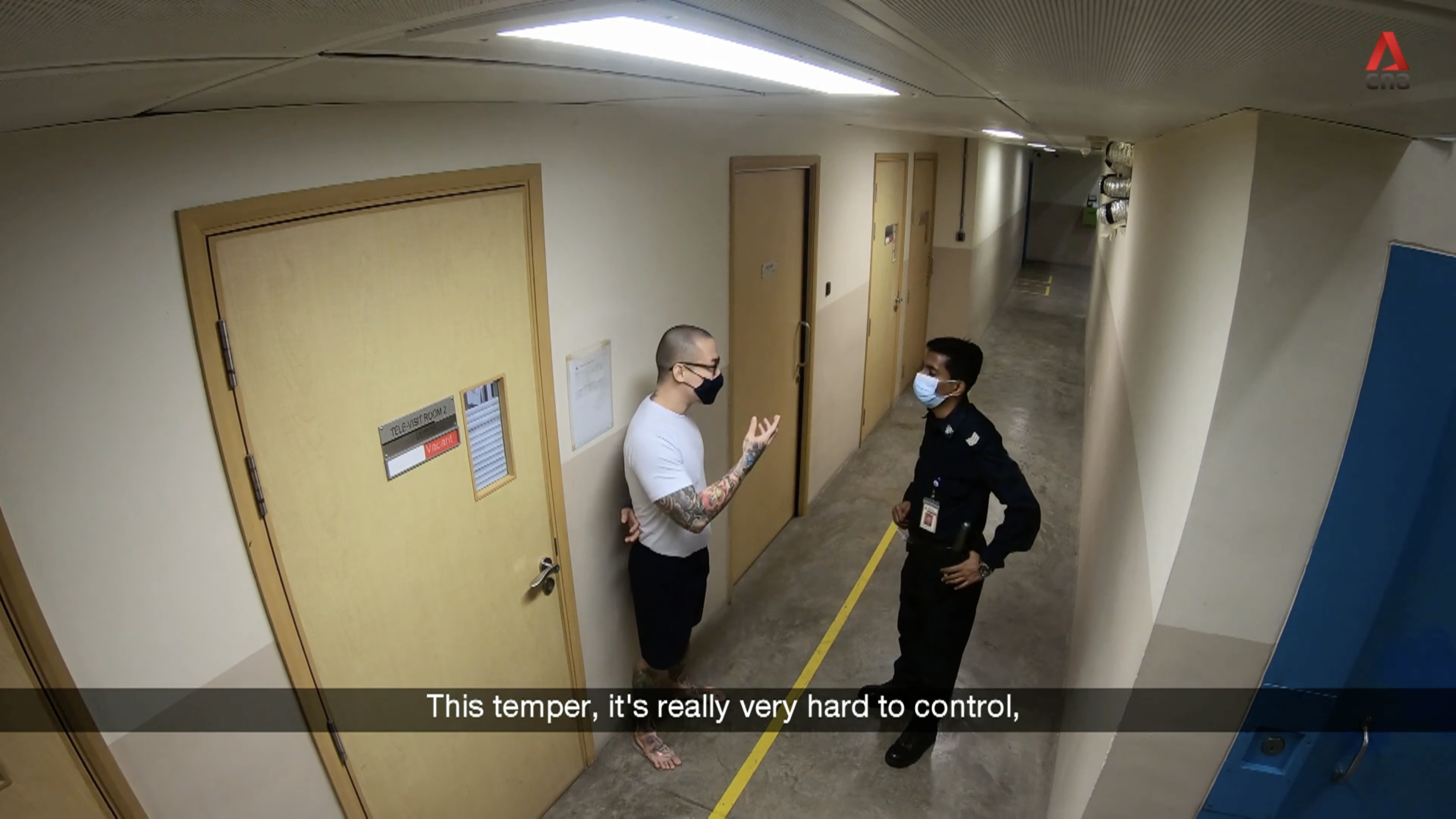 Image screenshot from CNA video.
Image screenshot from CNA video.
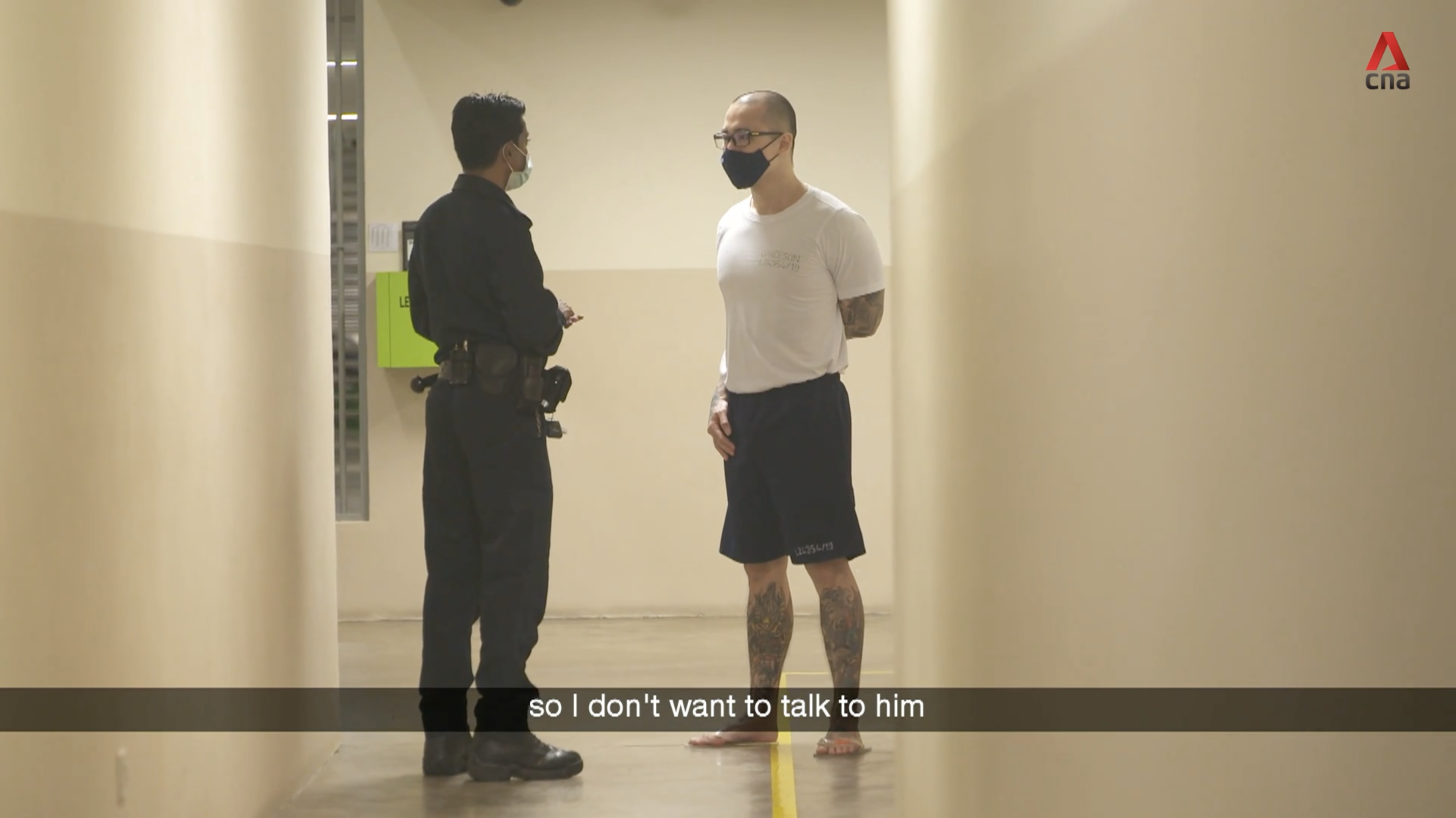 Image screenshot from CNA video.
Image screenshot from CNA video.
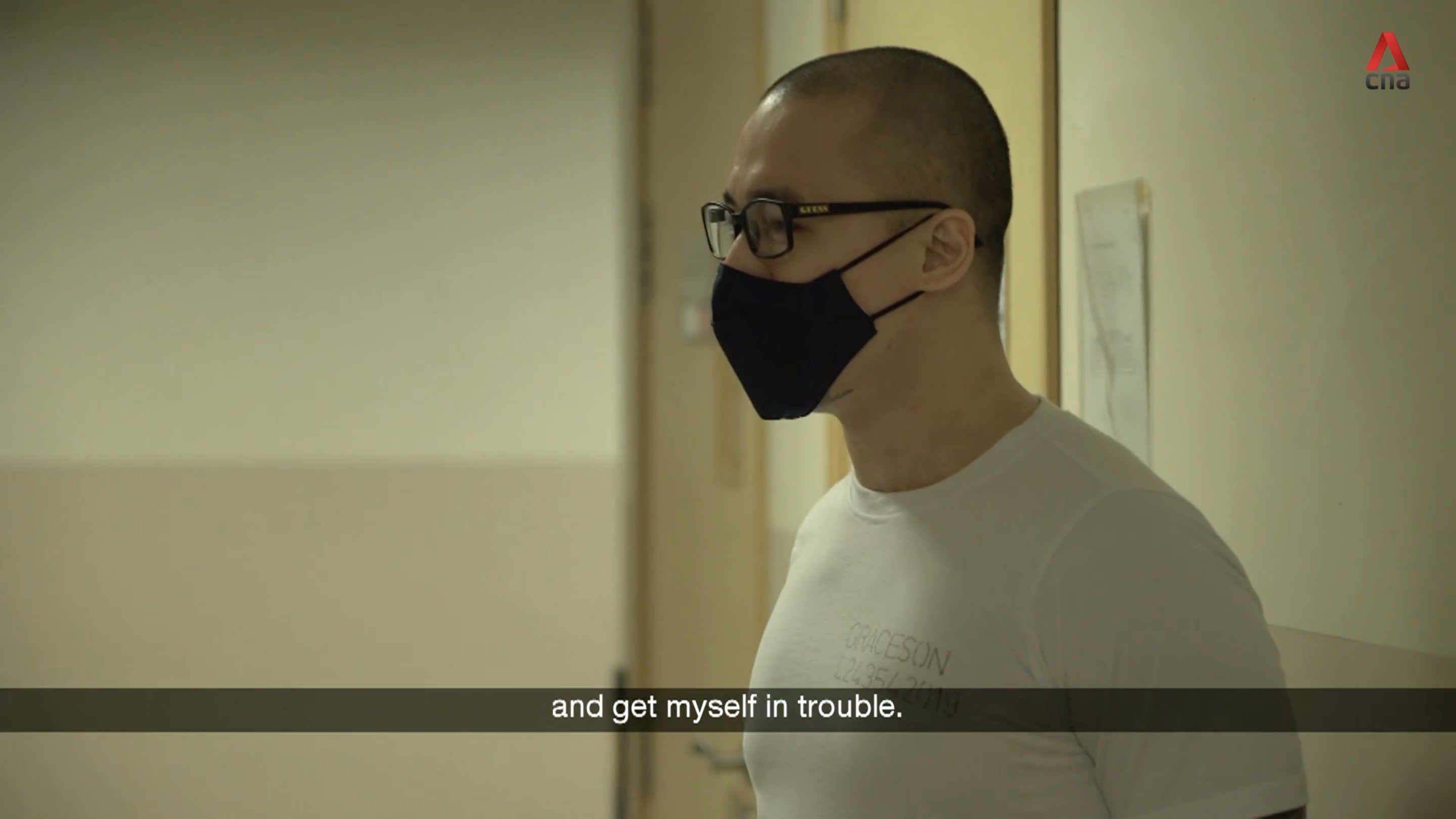 Image screenshot from CNA video.
Image screenshot from CNA video.
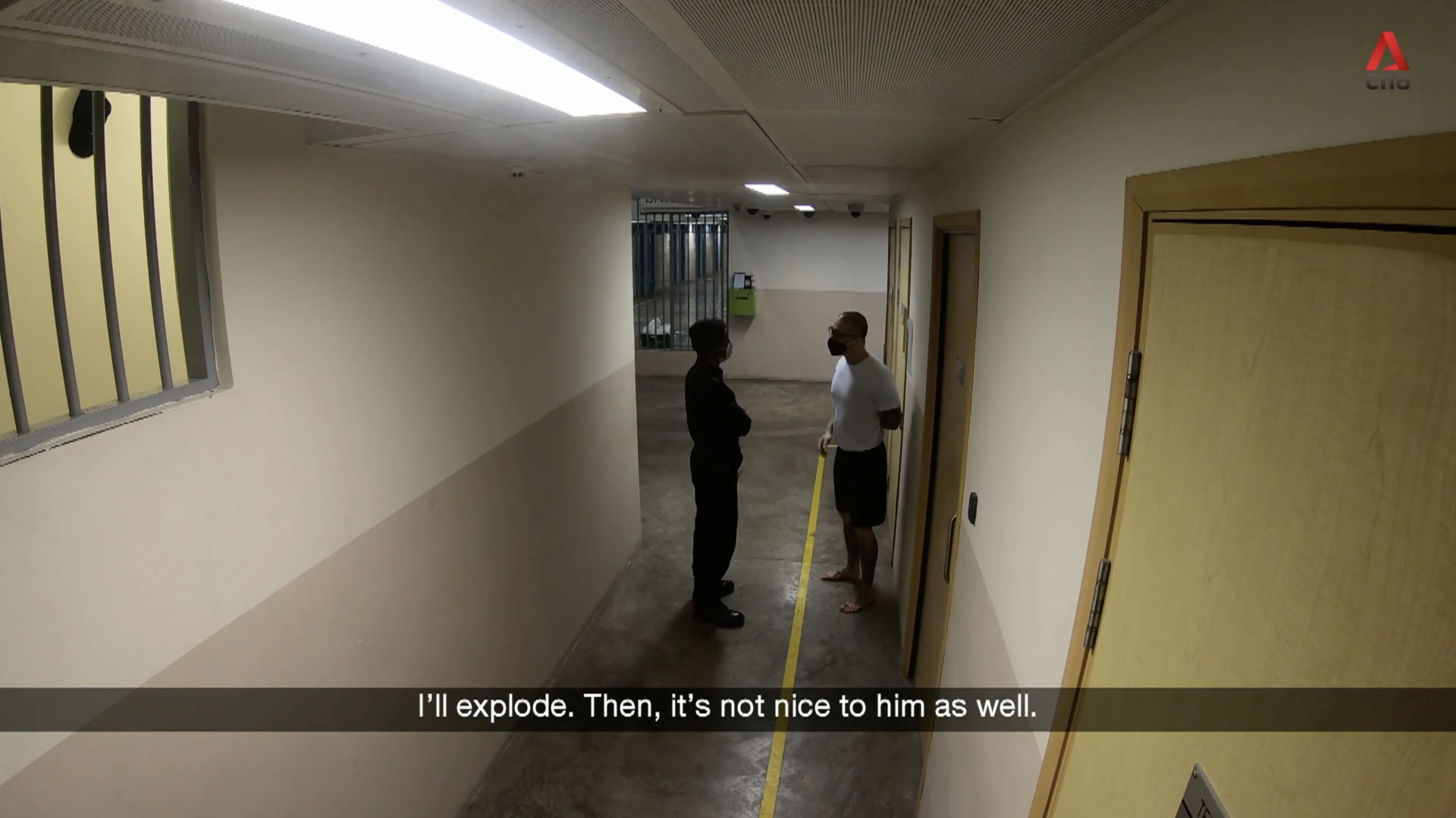 Image screenshot from CNA video.
Image screenshot from CNA video.
The prison does not condone inmates who disrespect or disobey prison officers, said Muhuthan, who added that severe action will be taken and inmates will be punished.
This includes delaying the inmates' release from prison.
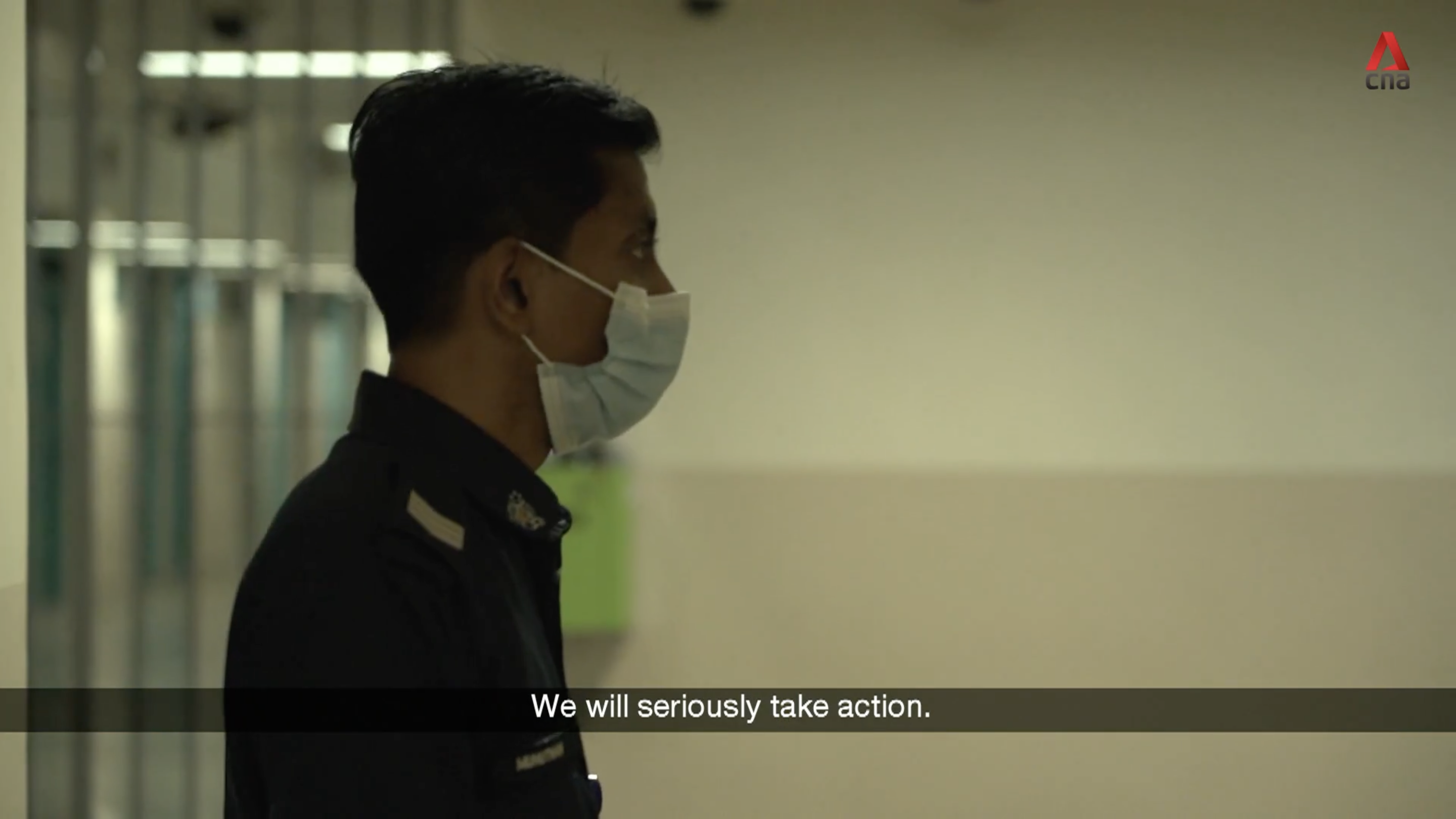 Image screenshot from CNA video.
Image screenshot from CNA video.
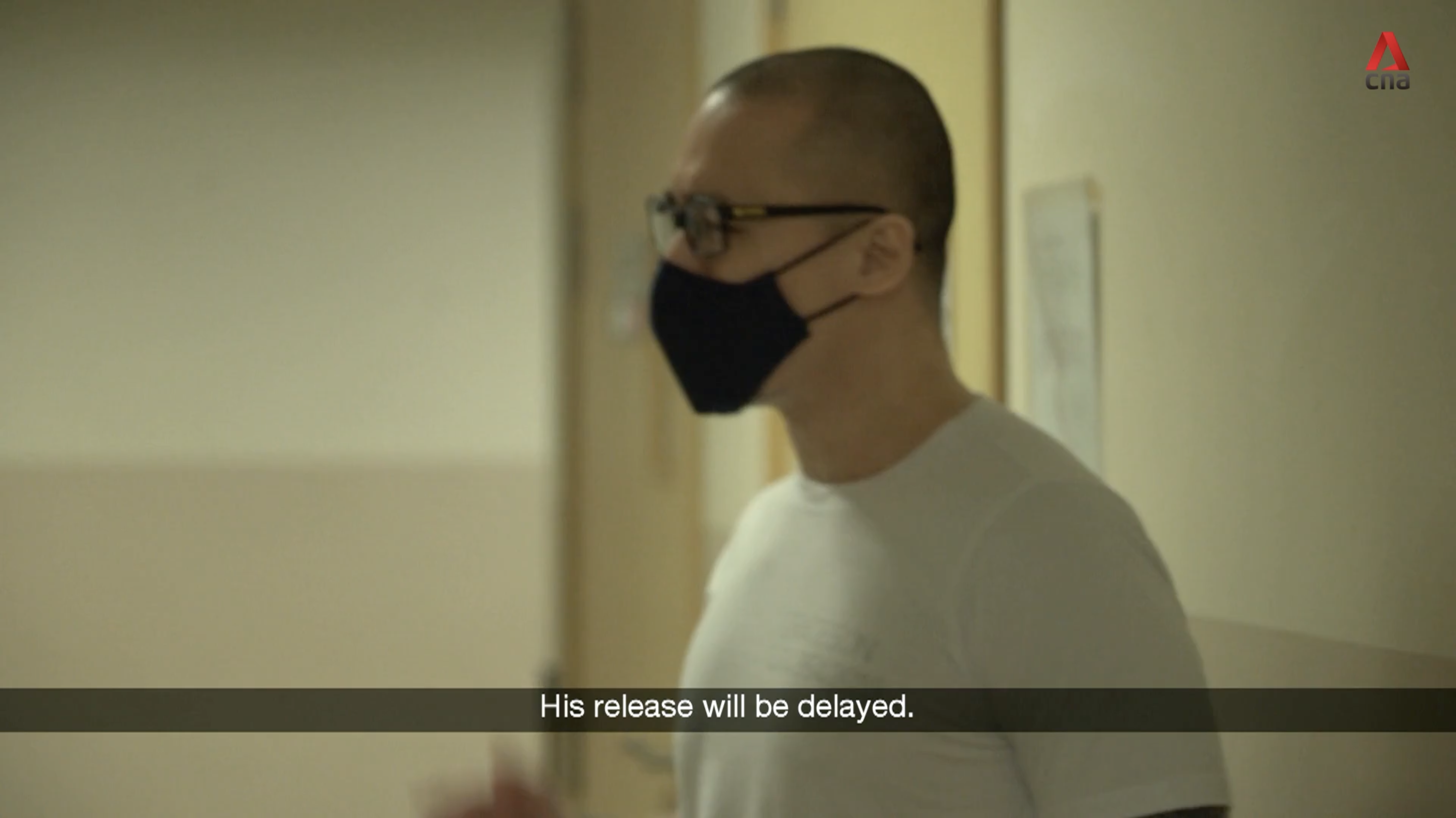 Image screenshot from CNA video.
Image screenshot from CNA video.
Drug-taking in prison
Besides this, inmates with a history of drug consumption and substance abuse may find alternative ways to fuel their addiction while behind bars.
This includes feigning a medical condition to access medication like painkillers, which can be addictive.
As such, medication is tightly regulated within prison, and the medical officers have to be extremely cautious and discerning when dispensing medication to inmates.
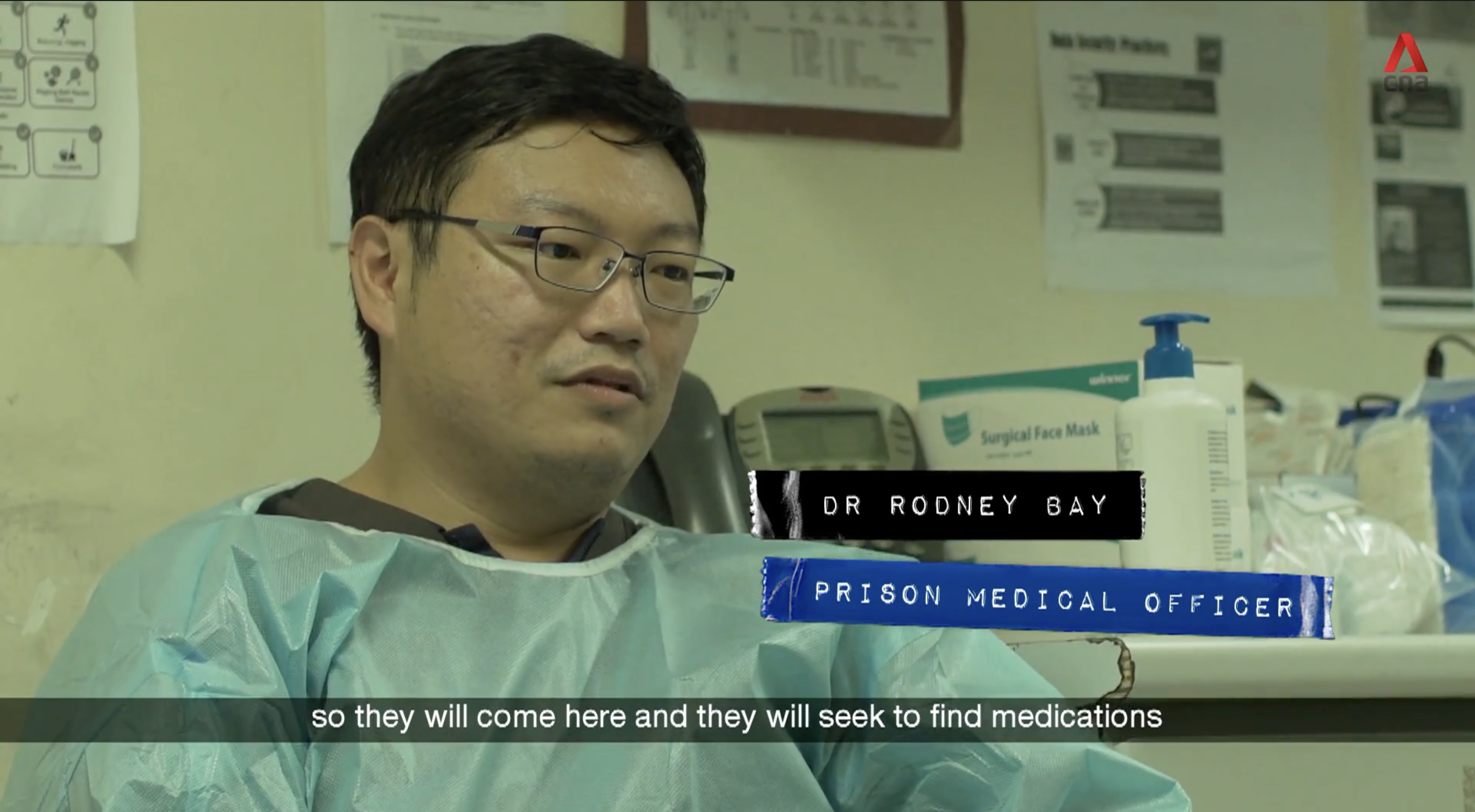 Image screenshot from CNA video.
Image screenshot from CNA video.
 Image screenshot from CNA video.
Image screenshot from CNA video.
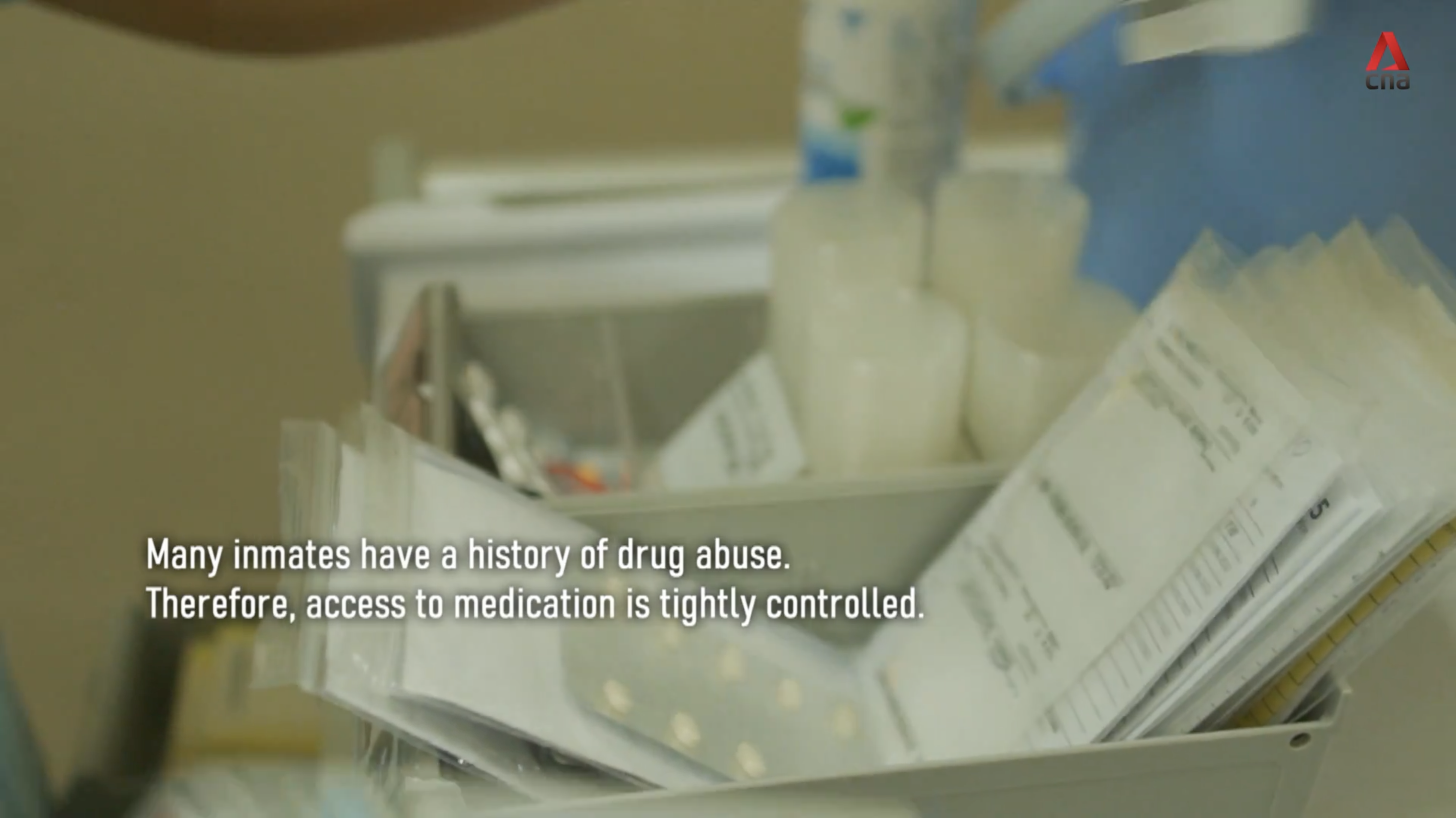 Image screenshot from CNA video.
Image screenshot from CNA video.
You can watch the third episode here.
How inmates spend Chinese New Year
Past episodes
Follow and listen to our podcast here
Top image screenshot from CNA video
If you like what you read, follow us on Facebook, Instagram, Twitter and Telegram to get the latest updates.
